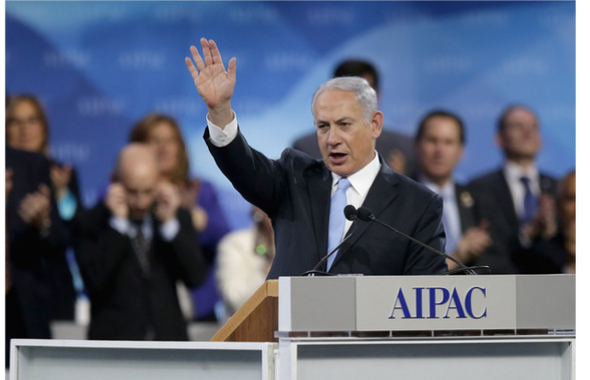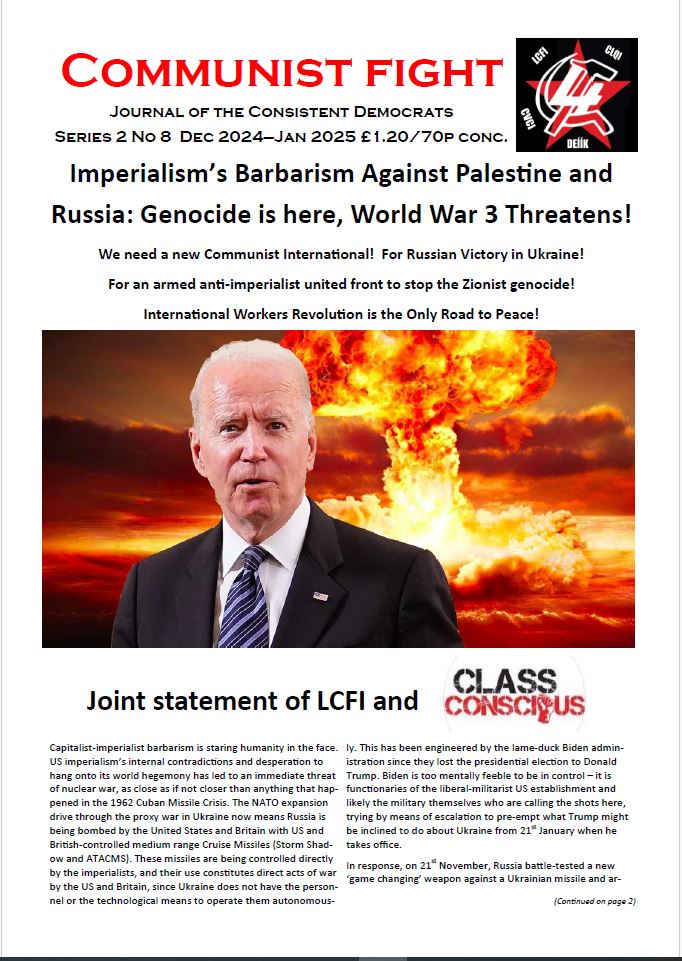One of our basic documents, the 2014 Draft Theses on the Jews and Modern Imperialism, has now been translated into Russian and is available on this site here.
Tag: Marxism
Letter from LCFI to ICL(FI) (‘new Spartacists’)
Dear ICL comrades,
As an orthodox Trotskyist-Communist tendency ourselves, we have watched with interest the political evolution of the International Communist League (Fourth Internationalist) since the death of James Robertson. We note that some recent changes in your political positions have brought us somewhat closer together on some key questions of the international class struggle. At the same time, we consider some important positions of yours to be mistaken, and that ironically could be seen as a retreat from positions we have come to conclude the flawed Spartacists were substantially correct about, though details of the way they put those positions forward were often seriously flawed.
We will deal with both the positive elements of your evolution and those positions we consider to be flawed. Unlike the old Spartacists, we do not consider that there is really any straight-line manifestation of ‘revolutionary continuity.’ We aspire to be the most faithful to the spirit of Marxist orthodoxy not out of any spurious loyalty to a concept of inherited wisdom, but because we consider that the materialist method of political analysis that is characteristic of Marxism, consistently employed and elaborated, produces the best analyses and programmatic positions that follow from those positions.
We reject the voluntarist and implicitly idealist notion of Robertson that “programme generates theory” which begs the question “and what generates programme?” In our view correct programmatic positions are generated by a correct materialist analysis and understanding of the world, and the crude aphorism of Robertson was at odds with that. However, what may be true is that a current with a history of correct analysis might be able to compensate for a temporarily inadequate understanding of new events by drawing on such political capital from the past, by taking a position based on a partial understanding bolstered by experience and making good its analysis later. That might be possible in some circumstances. Lenin’s building a revolutionary party based on a partially flawed theory (the “Democratic Dictatorship” – see later) is an illustrious example. But Robertson appears to have elevated such occurrences into a fetish of self-praise, that was part of the development of a political cult based on his own allegedly superior understanding and a supposed ‘revolutionary continuity’.
We do not claim, and cannot claim, to have been uniquely correct all along. That would be completely idealist and un-Marxist. We all have political histories, some of which are in a variety of flawed trends including the Robertson-led Spartacists. What we do claim is that we have studied extensively the world we are active politically in and have done our level best to become the best defenders of all past gains of workers and the oppressed, on the basis of Trotsky’s well- known statement that “It is the duty of revolutionists to defend every conquest of the working class even though it may be distorted by the pressure of hostile forces. Those who cannot defend old positions will never conquer new ones” (Balance Sheet of the Finnish Events, 1939).
The most detailed elaboration of our programmatic positions and approach is in our draft programme, which was produced in 2020 and 2021, in the main. You can get a fairly full picture of our positions from examining this, which is at https://www.consistent-democrats.org/lcfi-draft-programme/. One important supplementary document of ours, which contains a major advance in terms of understanding of the current geopolitical conflict of the West with Russia and China, is to be found here: https://www.consistent-democrats.org/uncategorized/lcfi-statement-marxism-and-the-post-counterrevolution-cold-war/. We note that there are considerable differences between us on the nature of both Russia and China. We do consider that our analysis is more truly orthodox in Marxist, Trotskyist terms than the positions which you currently uphold. We will address this later in this letter.
Palestine/Israel Question
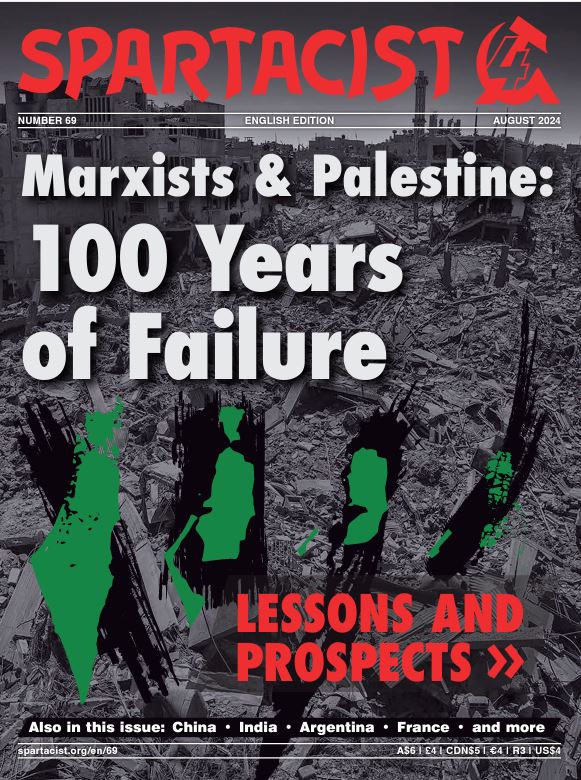
We consider that three closely related and comparatively recent changes in your positions are very positive. Firstly, your retrospective change of position on the 1948 Arab-Israeli war, which in fact was inseparable from the Nakba, the ethnic cleansing of Palestine, and necessitated taking the side of the Palestinian people resisting it, as well as those forces from neighbouring Arab countries resisting Israel’s creation through this enormous crime. These forces were both official (the forces of Syria, Egypt, then-Transjordan, Lebanon and Iraq), and unofficial (the Egyptian Muslim Brotherhood, who as documented by Ilan Pappe in his The Ethnic Cleansing of Palestine, sent in volunteers to Palestine to help the Palestinian people resist the ethnic cleansing on the ground). We profoundly agree with your change of position on this and embrace of a position on the entire Israeli-Arab conflict that the resistance of the Arab peoples to Zionist colonisation was a correct and progressive struggle, that Marxists were obliged to support as a matter of principle all along.
Secondly, we also agree with your criticism of James Robertson’s Shachtmanite heritage, which was not some long-overcome aspect of his political history, but an active political flaw that fundamentally distorted the proclaimed Trotskyist orthodoxy of the Spartacist tendency for the whole of its existence. Our draft programme notes the following about the Spartacists:
“The Revolutionary Tendency of the SWP became the Spartacist League of the US, which founded its own anti-revisionist tendency internationally beginning in 1966, though for several years it had to struggle against involuntary national isolation due to being bureaucratically excluded from the ‘anti-revisionist’ IC. Though they analysed the Cuban revolution correctly, concluding that Castro had established a deformed workers state, they had other fundamental political problems in their history and background which they failed to properly address.
For instance, the origins of their leading cadre: Robertson, Wohlforth and Mage, were in the Shachtmanite ‘Third Camp’ Workers Party (WP), later Independent Socialist League (ISL) in the 1940s and 1950s. They split to the left from the ISL in the aftermath of the 1956 Hungarian Revolution and embraced a Soviet defencist position that was obviously basically correct. But they never completely broke with another facet of the Shachtmanites’ politics, their pro-Zionism, support for Israel and softness on the nationalism of oppressor peoples in some important conflicts involving settler peoples in conflict with indigenous peoples who the colonists had subjugated and/or driven out.
A year or so after the Spartacist League/US was founded, it faced the political test of the June 1967 war between imperialist-colonial, advanced-capitalist Israel and several semi-colonial Arab states, centrally Egypt, Syria and Jordan. The SL/US took a ‘defeatism on both sides’ position, a fundamentally wrong position that failed to distinguish an oppressor, imperialist predatory state from oppressed semi-colonial nations that Israel targeted as part of its planned expansion into the West Bank, Gaza and Golan, land which it occupies to this day. Even worse, its article on this war makes clear that if Israel had been in danger of losing this war, and being eliminated as a state, the SL/US would have sided with Israel, and retrospectively took the position that it was correct for Marxists to support the defence of Israel in the 1948 war (whose outcome was the Nakba, the ethnic cleansing of Palestine of its indigenous Arab population by Zionist forces). This was not a new position for Robertson; it had in fact been the position of Shachtman’s Workers Party in that very war at the time, when he had been a young member of that organisation.
This revealed a central political weakness of the Spartacists. Even though they had correctly analysed the Cuban revolution, they then failed the test on another crucial question of the international class struggle. Subsequently, the Spartacists extensively debated Zionism and related questions involving settler-colonist-derived populations in conflict with oppressed colonised peoples and rejected Shachtman’s position on the 1948 war. Instead, they extended their neutral position on the 1967 war, and the subsequent 1973 war in which they had the same approach, back to 1948 and retrospectively advocated a dual-defeatist position then also. They claimed, because the US SWP had a similar neutral position at the time, that this was orthodoxy, though in fact it was a capitulation to Zionist pressure by the SWP also, involving again, neutrality between colonists and their victims. They then decided that such neutrality, or dual defeatism, should be a general principle, that it was wrong to deny the ‘right to self-determination’ to armed settler populations in conflict with indigenous populations anywhere.”
It seems to us that the position argued for in your recent article Marxists and Palestine: 100 Years of Failure is identical in this regard to the position argued in our Draft Programme.
Though importantly, we consider the leaflet that you issued in the immediate aftermath of the 7th October 2023 Hamas-led breakout from Gaza, to be badly flawed and wrong. The primary flaw is in the opening paragraph when it says:
“…the targeted murder of Israeli civilians by Hamas and its allies is a despicable crime which is totally counterproductive for Palestinian liberation.”
This is simply inaccurate, wrong, and reads like a reactionary attack on the organised Hamas militants who took part in that action, who it is clear did not aim at a massacre of non-military Israelis, but rather the capture of military and civilian hostages to exchange for some of the many Palestinians who are de-facto hostages of Israel, and indeed often tortured, raped and even murdered in Israeli custody. We note the date of that leaflet, 10th October, and that it appears to have been written hurriedly in the three days after the events in question, before the fog of war and hysterical Israeli/imperialist propaganda had time to remotely begin to clear. We are not supporters of Hamas, but we are not in favour of smearing and demonising them either. That leaflet does not mention the Israeli ‘Hannibal Directive’ whereby Israeli forces kill their own soldiers and even civilians to prevent them being captured. By 10th October the use of this directive on 7th October was not widely known but the lying nature of hasbara certainly was. It’s wrong to have accepted it.
We note that the Bolshevik Tendency do not share our common view of 1948 or the early political derelictions of James Robertson, but they did write a very good and balanced account of what actually took place on 7th October (see their article at https://bolsheviktendency.org/2024/03/06/for-a-bi-national-workers-state-in-palestine-israel/, particularly the section titled “Israeli civilian casualties on 7 October”. They quote Scott Ritter thus:
“…it turns out that the number one killer of Israelis on October 7 wasn’t Hamas or other Palestinian factions, but the Israeli military itself. Recently released video shows Israeli Apache helicopters indiscriminately firing on Israeli civilians trying to flee the Supernova Sukkot Gathering held in the open desert near Kibbutz Re’im, the pilots unable to distinguish between the civilians and the Hamas fighters. Many of the vehicles that the Israeli government has shown as an example of Hamas perfidy were destroyed by the Israeli Apache helicopters.
“Likewise, the Israeli government has widely publicised what it is calling the ‘Re’im massacre,’ citing a death toll of some 112 civilians it claims were murdered by Hamas. However, eyewitness accounts from both surviving Israeli civilians and military personnel involved in the fighting show that the vast majority of those killed died from fire from Israeli soldiers and tanks directed at buildings where the civilians were either hiding or being held hostage by Hamas fighters.” (—johnmenadue.com, 20 November 2023.)
And the BT remark:
“There is no question that, in addition to the victims of ‘friendly fire,’ hundreds of Israeli civilians perished at the hands of Palestinian gunmen during the breakout. Hamas has denied deliberately targeting Israeli civilians, and while its pronouncements cannot simply be taken at face value, it seems highly unlikely that the architects of such a tightly coordinated and precisely choreographed operation would prioritise activities (like shooting random civilians) that would reduce the forces available to go after more high-value targets. Hamas (and its resistance partners) are aware of the importance of distinguishing between civilians and IDF soldiers (or fascistic West Bank settlers). This is evident in the priority they have placed on maintaining the well-being of the hostages they are using to negotiate with the Israeli government.”
Nor are they uncritical of Hamas’ own errors that allowed other angry Palestinian militants to use the holes in the Gaza fence made by Hamas for their own, understandably but indefensibly vengeful reasons:
“It seems probable that most of the Jewish civilians killed by Palestinians on 7 October were the victims of the several thousand unorganised escapees from the Gaza concentration camp, rather than the elite resistance fighters executing their mission. Yet, as Scott Ritter pointed out, Hamas had operational control during the breakout and therefore bears overall responsibility for the actions of those who flooded across the border once the barriers were down. Hamas failed to make provision for controlling the border or providing some rudimentary security for the adjacent civilian population. The failure to do so was a mistake that helped fuel a popular appetite for revenge—had civilian casualties been minimised, the intensity of support for the current genocidal campaign in Gaza might have been considerably less.”
And they cite a historical analogy used by the World Socialist Web Site, that has also been evoked by others, it seems originally by Norman Finkelstein:
“In 1831, a slave uprising led by Nat Turner took place in Southampton County, Virginia. The escaped slaves used knives, hatchets and clubs to massacre dozens of white men, women and children. The rebellion was put down with even more extreme savagery, with roving militias and mobs murdering black people on sight regardless of whether they were involved in the rebellion. Turner’s body was flayed and his skin was turned into souvenir purses.
“Any objective historian, with the benefit of hindsight, would place the blame for the terrific violence of such uprisings not on the slaves, but on the slave system itself, with all its colossal inhumanity.”
In this context, we consider that despite the entirely progressive change in your position on Palestine, this leaflet did you a disservice. There is nothing wrong with strong criticism of movements like Hamas, but this criticism was inaccurate and slipped into demonisation. It appeared to equate the ‘terror’ of Hamas with the crimes of the Israeli state when it wrote:
“The entire Hamas strategy is to provoke a strong Israeli reaction, effectively strapping a suicide vest on all of Gaza. It is necessary to unequivocally stand in defence of Gaza against the bloody retaliation by Israel while at the same time opposing this disastrous strategy….
“…If socialists do not fight for a revolutionary solution to the conflict, the growing desperation of the Palestinian people will be channelled once more into the arms of Islamist reaction while Jews are pushed deeper into the arms of Zionism. This carnival of reaction will not stay within the borders of Israel and Palestine but will spread far and wide over the Middle East and the world. It is the urgent task of socialists to break this cycle.”
This is not an accurate rendition of the strategy of Hamas at all and is predicated on the view that their objective on 7 October was a mass slaughter of Israelis. It appears to equate oppressor and oppressed, and in some ways to be like the old-style Spartacist material equating the Shah and the Mullahs that you correctly criticise in the context of Iran in the 1970s. This is a weakness and contradicts your advance on the Middle East question. We would not particularly emphasise this leaflet had you not reproduced it, but it is important as it is a direct response to 7 October – an event of world-historic significance.
Robertson’s ‘continuity’ myth – foundation of cultism
We consider Robertson’s Shachtmanite component to be the basis for the cultist evolution/degeneration of the Spartacists under Robertson’s leadership from the 1970s onwards. In our view the critique of the Spartacist League’s ‘cultism’ by the Bolshevik Tendency/International Bolshevik Tendency certainly documented many terrible things that went on in the iSt/ICL, which damaged many militants, and which many veteran cadres of the ICL, including some in our own ranks, were badly affected by. But they never identified the political basis of this cultism. Yet all such instances in the workers movement must have a political explanation, some kind of political contradiction between the claims made by a leadership, and political reality, to explain them. In this case, armed with the above, the explanation is the contradiction between the Robertson leadership’s often claimed ‘continuity’ with James P. Cannon’s earlier US SWP and its predecessors, and the unfortunate fact that Robertson’s politics embodied elements of continuity with both Cannon’s organisation and Shachtman’s, two currents that were radically at odds with each other. The Shachtmanite element in Spartacist politics sometimes found expression in a rigid, inverted, sectarian manifestation, but this built-in contradiction in their politics profoundly deformed the Spartacists pretty much from birth, as you comrades correctly point out.
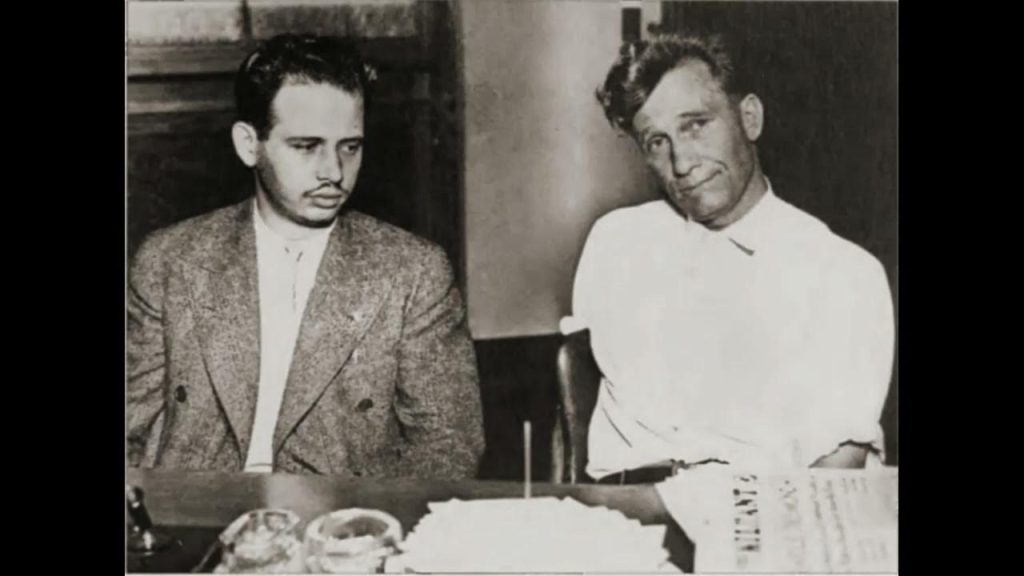
We note that the BT/IBT are at least critics of the cultism of the Spartacists but are flawed by their inability to nail down its political basis. Unfortunately, the New Zealand-centred IBT has shown signs of rightward political motion with its incorrect characterisation of Russia as ‘imperialist’ and taking positions denouncing ‘Russian imperialism’ in Ukraine and earlier Syria that are flatly wrong and reactionary. The BT are healthier but remain for now prisoners of their own political miseducation at the hands of Robertson and have not yet got to the root of the problem. The Norden tendency seems to be the only remaining trend in the original Robertson cult, and flatly defend indefensible actions of Robertson, smearing his critics in a manner that is like a time-warp from somewhere around 1983. This is because they were involved in such indefensible actions, despite having been later victimised by them, and unfortunately have so far been unable to come to terms with their own history.
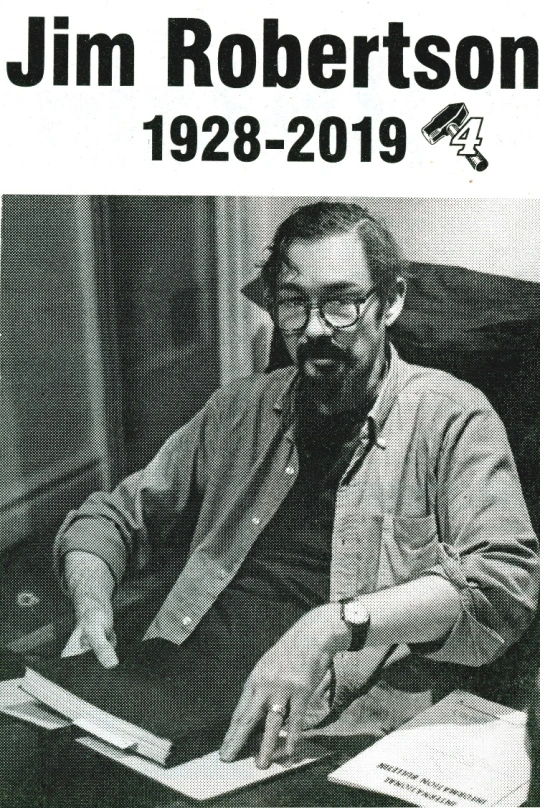
Anti-Imperialist United Front
Thirdly we agree with you about the Anti-Imperialist United Front (AIUF) as against Robertson, Norden and the Riley and Logan groups. The entire Spartacist tradition engaged in obscurantism and miseducation of their cadre about the AIUF, which was indeed put in thesis form particularly in the Theses on the Eastern Question at the Fourth Congress of the Communist International:
“The refusal of Communists in the colonies to take part in the fight against imperialist tyranny, on the pretext of their supposed ‘defence’ of independent class interests, is the worst kind of opportunism and can only discredit the proletarian revolution in the East. No less harmful, it must also be recognised, is the attempt to remain aloof from the struggle for the immediate everyday demands of the working class in the interests of ‘national unity’ or ‘civil peace’ with the bourgeois democrats. A dual task faces the Communist and workers’ parties of the colonial and semi-colonial countries: on the one hand, they are fighting for a more radical answer to the demands of the bourgeois-democratic revolution, directed towards the winning of national political independence; on the other hand, they are organising the masses of workers and peasants to fight for their own class interests, making good use of all the contradictions in the nationalist bourgeois-democratic camp…” (https://www.marxists.org/history/international/comintern/4th-congress/eastern-question.htm)
The argument of the old Spartacist tradition was that this was at odds with the permanent revolution, and that the Trotskyist movement ‘overcame’ this weakness and generalised permanent revolution to the whole of the colonial and semi-colonial world after the defeated Chinese revolution of 1926-7, thereby rejecting the AIUF. The view that the Permanent Revolution means rejecting the AIUF is shown to be false by Trotsky’s remarks on the nature of the ‘national’ bourgeoisie in his 1937 essay Not a Workers’ and Not a Bourgeois State:
“The internal regime in the colonial and semicolonial countries has a predominantly bourgeois character. But the pressure of foreign imperialism so alters and distorts the economic and political structure of these countries that the national bourgeoisie (even in the politically independent countries of South America) only partly reaches the height of a ruling class. The pressure of imperialism on backward countries does not, it is true, change their basic social character since the oppressor and oppressed represent only different levels of development in one and the same bourgeois society. Nevertheless the difference between England and India, Japan and China, the United States and Mexico is so big that we strictly differentiate between oppressor and oppressed bourgeois countries and we consider it our duty to support the latter against the former. The bourgeoisie of colonial and semi-colonial countries is a semi-ruling, semi-oppressed class.” (https://www.marxists.org/archive/trotsky/1937/11/wstate.htm)
“Supporting the bourgeoisie” of the oppressed countries against the imperialist oppressors is not blanket political support. It is self-evidently a variant of a united front, as explained in the Eastern Question theses:
“The workers’ united front is the slogan advanced in the West during the transition period, characterised by the organised gathering of forces. Similarly in the colonial East at the present time the key slogan to advance is the anti-imperialist united front. Its expediency follows from the perspective of a long-drawn-out struggle with world imperialism that will demand the mobilisation of all revolutionary elements. This mobilisation is made all the more necessary by the tendency of the indigenous ruling classes to make compromises with foreign capital directed against the fundamental interests of the mass of the people. Just as in the West the slogan of the workers’ united front has helped and is still helping to expose the social democrats’ sell-out of proletarian interests, so the slogan of an anti-imperialist united front will help to expose the vacillations of the various bourgeois-nationalist groups. This slogan will also help the working masses to develop their revolutionary will and to increase their class consciousness; it will place them in the front ranks of those fighting not only imperialism, but the remnants of feudalism.” (Theses on the Eastern Question, ibid)
This is not counterposed to the programme of permanent revolution. It is a transitional tactic pointing to the need for permanent revolution:
“While the bourgeois nationalists look at the workers’ movement from the viewpoint of its importance for their success, the international proletariat considers the new workers’ movement of the East from the viewpoint of its revolutionary future. Under capitalism the backward countries cannot share in the achievements of modern technical knowledge and culture without paying an enormous price in the form of savage exploitation and oppression by Great-Power capital. The workers in the East have to ally with the proletariat of the advanced countries, not only in the interests of their common struggle against imperialism, but because only the victorious proletariat of the advanced countries will give them disinterested aid in the development of their backward productive forces. Alliance with the proletariat in the West will pave the way to an international federation of soviet republics. For backward peoples the soviet system represents the smoothest form of transition from primitive conditions of existence to the higher Communist society which is destined to replace the entire capitalist world economy of production and distribution. This is borne out by the experience of the soviet system in the liberated colonies of the former Russian empire. Only the soviet form of government is able to ensure that the peasant agrarian revolution is consistently carried through. The specific conditions of agriculture in certain parts of the East (artificial irrigation), maintained in the past by a unique system of collective labour organised on a feudal-patriarchal basis but now undermined by capitalist greed, also require the kind of state organisation that can meet social needs in a planned and organised manner. In view of the special climatic and historical conditions, co-operatives of small producers will definitely play an important role in the transitional period throughout the East generally.” (Theses on the Eastern Question, ibid)
This both calls for a revolutionary alliance with the proletariat in the advanced countries, and explicitly holds up the example of the nations of the Soviet East – liberated by a revolutionary party whose leaders were driven by the practical carrying out of permanent revolution and the “Soviet system”, based on “state organisation that can meet social needs in a planned and organised manner”. This is obviously a tactic that concretely aimed at pointing the way to permanent revolution – the ultimate resolving of the tasks of national unification and social liberation under the class rule of the proletariat.
We therefore agree with your conclusion that:
“The anti-imperialist united front was essential then and still is today in all countries where the national liberation struggle is in the hands of the bourgeoisie. For communists to be able to break the bourgeoisie’s hold on the struggle, it is necessary to gain decisive influence among the proletariat, the peasantry and the lower strata of the urban petty bourgeoisie. And to do this, communists must not remain suspended in the air as immaculate critics on the margins of the struggle, but place themselves in the midst of the melee. We must win influence and prestige in the national and democratic struggle against foreign domination, and this can only be done by revealing to the masses the weaknesses, deficiencies and betrayals of the national bourgeoisie. That is the purpose of the anti-imperialist united front: to win the masses, to prepare the ground for the inevitable open conflict with the national bourgeoisie in the struggle against world imperialism.” (https://iclfi.org/spartacist/en/68/comintern)
What flows from the AIUF is an active, interventionist perspective regarding bourgeois-led movements related to democratic demands concerned with, or linked to, the national liberation of oppressed people vis-à-vis imperialist oppression. So, the AIUF mandated defence of Argentina in the 1982 Falklands/Malvinas war, in contradiction to the positions of the entire Spartacist ‘family’ (the Robertson, Riley, Logan and Norden groups). We certainly agree with your change of position.
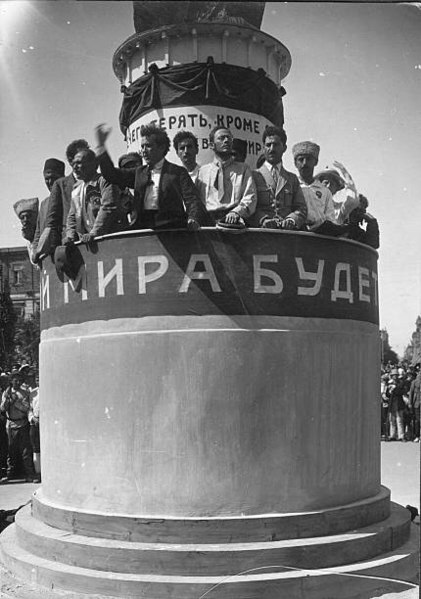
We also are pleased to see your active and interventionist position on the ground regarding national movements of oppressed peoples in the Global South, for instance your critical support for the left-nationalist Economic Freedom Fighters in South Africa, your refoundation of the Mexican section of the ICL based on an active aspiration to engage with national resistance to US imperialist domination. We are not able to simply endorse these positions in detail, as we do not have the detailed knowledge that would result from having forces on the ground in those countries, but we do endorse the aim of them – to positively apply the AIUF in a practical way.
We also note your intervention in the struggles against Milei in Argentina, and we certainly sympathise with your criticisms of sectarian elements on the Argentine left who make fine speeches in separate ‘Trotskyist’ events, that should be addressed to the mass of the workers who follow Peronism. We note your attempt to concretise the slogan of a workers’ government in Argentina, with the demand for an “FIT-U/CGT/CFA government”, consisting of the main ‘Trotskyist’ bloc, together with the main trade union bodies who are currently led by Peronistas. However, we do consider this may be mistaken in one sense, as the FIT-U does not currently have the degree of mass influence among workers that would make such a bloc viable. In part this is because of the softness of those tendencies involved on imperialism, which have meant they never generated such a mass base. We note the positive intent but suggest it probably needs more thought and the development of a base in the country itself. Not that this is easy or to be taken lightly – the creation of such an organisation is not an easy thing to do.
We agree with your repudiation of the chauvinist elements of the Spartacists’ position on the revolutionary upheaval in Iran in 1978-9, their fundamentally flawed equation of the movement led by the Shia ulema with the imperialist puppet Shah, and their evoking of fascist movements in imperialist countries to deny the component of the Shia-led movement that was directed against imperialist oppression. We consider this was a manifestation of the same Shachtmanism that led them to support Israel in 1948. We note that you correctly do not use this error as a rationale for any liquidationism in the face of the Khomeni movement:
“Our entire framework denied the fact that the struggle of the Persian masses to free themselves from the imperialist chokehold was a progressive struggle. Our task was to explain that as long as it remained in the grip of the mullahs, it would necessarily be directed against national and other minorities, leading to their persecution and at the same time undermining the liberation of the Persian majority itself. The only way to break the hold of the mullahs was to show concretely how their leadership was an obstacle to the legitimate and progressive aspirations of the masses to be free from the Shah and imperialism.” (https://iclfi.org/spartacist/en/68/permrev)
Overall, we consider the old Spartacists’ repudiation of the AIUF as containing a chauvinist component, refusing to involve themselves in the struggles of oppressed peoples, but attempting to cover up for this politically with a theorised rationale for abstention. We also consider this to be a manifestation of Shachtmanism, in an inverted, sectarian form. Shachtman in his earlier, more pseudo-leftist period, was capable of such leftist posturing, for instance in his denunciation of the Proletarian Military Policy in WWII, which the old Spartacists solidarised with, and also his withdrawal of support for China’s struggle for national independence against Japan in 1942, ostensibly on the ground that the Kuomintang then in command in China had become simply an instrument of Anglo-American imperialism. The Spartacists solidarised with both positions – those were sectarian manifestations of Shachtmanism, not as in most manifestations an opportunist manifestation.
Popular Fronts and Workers Parties
Another related manifestation of Robertson’s Shachtmanism in a sectarian shell is their theorising about tactics of dealing with mass workers parties that engage in popular fronts with ‘radical’ bourgeois parties. The classic case being France in the 1930s, when Leon Blum’s French Socialist Party was propelled into government on a Popular Front platform jointly with the Communist Party and the small bourgeois Radicals. They make a correct point: whenever such blocs are formed, it is imperative to oppose them and to place no confidence in them by means of electoral support and the like. The aim of any electoral tactics used is to draw the class line, warn against the dangers that are embodied in popular fronts in terms of leading to major defeats of the working class, and to split such blocs along class lines.
A key means of doing this is to hammer on the contradiction between the fact that the workers party components of the popular front were formed as deformed expressions of class independence, and their joining a governmental block with a bourgeois party to their right, which is at odds with the notion that a party and a government is necessary that is accountable to the workers, not the bourgeoisie. Because of that, there are circumstances when the working class themselves will express opposition to such blocs by voting in such a way as to try to force a social-democratic party to take power without its bourgeois partners. Trotsky, in his writings on France in 1936, pointed to such an action as an example of working-class resistance to popular fronts and solidarised with it:
“… even under these conditions the masses were able to give expression to their desire: not a coalition with the Radicals but the consolidation of the toilers against the whole bourgeoisie. […]
“The Socialists and the Communists worked with all their might to pave the way for the ministry of Herriot — at worst the ministry of Daladier [i.e. politicians of openly bourgeois parties]. What did the masses do? They imposed upon the Socialists and Communists the ministry of [SFIO leader Leon] Blum. Is this not a direct vote against the policy of the People’s Front?” (The Decisive Stage, from Leon Trotsky on France, Monad Press, 1979, pp157-8).
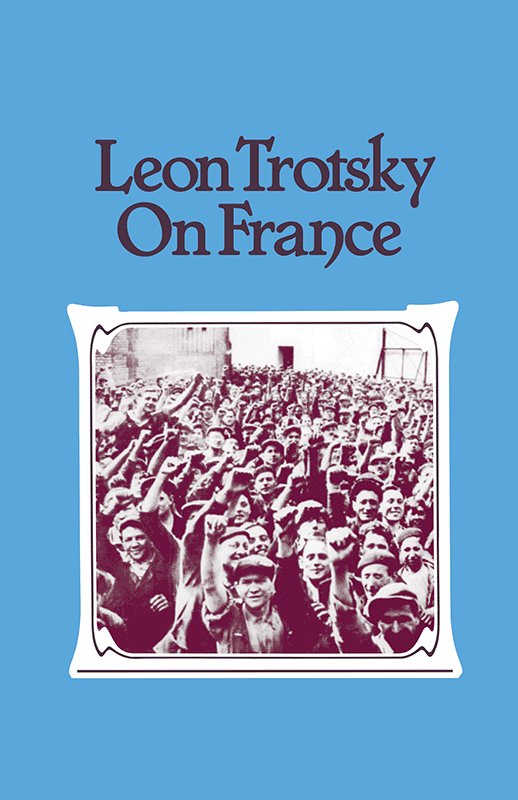
The Spartacists, while correctly warning of the danger of the Popular Front in Chile in 1970-72, developed a position that rejected this approach in principle, arguing that when a mass bourgeois workers party enters into a popular front coalition the class contradictions within it are suppressed, they cease to operate, and it is not possible for Marxists to exploit those contradictions until the popular front is broken. The leads to a Catch-22. They believe it is not possible to exploit such internal class contradictions to break the popular front. So how then are popular fronts to be broken? By ferocious denunciation alone?
This idea that such class contradictions cease to operate is a methodological position, again, derived from a sectarian inversion of Shachtmanism – it defines away the proletarian pole in a bourgeois workers party and treats it as an outright bourgeois formation for the duration. It leads to a passive acceptance of popular front coalitions on the grounds that nothing can be done to break them. It may sometimes be difficult to formulate an electoral tactic that can really exploit such issues and cause such a rupture, but for a Marxist organisation to refuse to attempt to find such tactics, and be reduced, in the words of the Spartacists themselves, to “giving out leaflets saying ‘please don’t vote for the popular front’” is not an effective policy. It is sterile abstentionism. This issue is discussed at some length in an exchange of ourselves with the then-IBT, but it was first raised internally in their organisation in 1998 (see https://www.consistent-democrats.org/critical-support-popular-fronts-and-bourgeois-workers-parties/), when they refused to discuss it. It is a policy consistent with the old Spartacists’ long-time refusal to seriously engage with, and try to split, mass social democratic and Stalinist organisations.
Permanent Revolution
We agree with many of your points about the essential identity in practice between Trotsky’s theory of Permanent Revolution, as initially laid out in his 1906 work Results and Prospects, and Lenin’s overall perspective in his 1905 Two Tactics of Social Democracy in the Democratic Revolution, which was written in February 1905. It should be noted that some of the limitations of the latter are rooted in that it was written without the full experience of the 1905 Revolution. Its hypothesis that the bourgeoisie would be hostile to and betray the revolution was correct, like Results and Prospects it projected that the working class would have to ally with revolutionary peasant masses to resolve the main democratic questions posed by Tsarism in opposition to the Russian bourgeoisie. However, it did not go so far, as did Trotsky’s later work, in projecting that the proletariat would have to conquer power as a class and institute socialist measures. It projected that the proletariat and peasantry would have to substitute for the bourgeoisie and force through bourgeois economic and social development:
“Marxists are absolutely convinced of the bourgeois character of the Russian revolution. What does this mean? It means that the democratic reforms in the political system and the social and economic reforms, which have become a necessity for Russia, do not in themselves imply the undermining of capitalism, the undermining of bourgeois rule; on the contrary, they will, for the first time, really clear the ground for a wide and rapid, European, and not Asiatic, development of capitalism; they will, for the first time, make it possible for the bourgeoisie to rule as a class.” (https://www.marxists.org/archive/lenin/works/1905/tactics/ch06.htm, emphasis added)
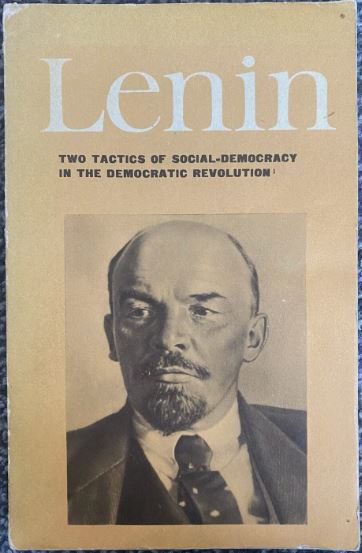
This was clearly flawed, as was shown in 1917, when Lenin was forced to relegate the slogan of the “Democratic Dictatorship of the Proletariat and Peasantry” to the “museum of pre-revolutionary antiques”. However, that ‘Jacobin’-like perspective of a radical worker-peasant alliance forcing a bourgeois revolution upon the bourgeoisie against its will mandated the creation of a disciplined working-class vanguard/combat party to carry it out, which Lenin and his immediate followers were highly successful and motivated in doing. They were in a way immersing themselves in the fight for the permanent revolution, even though they were not fully conscious of its nature.
To Trotsky, who was more conscious of the proletarian nature of the coming revolution and was closer to the practices of the European workers movement in that regard, Lenin’s party appeared to resemble a Jacobin, elitist party (as expressed in his 1904 essay critical of Lenin, Our Political Tasks). That misunderstanding could only be understood dialectically as a product of the interaction of differing class strands within a revolution that was building in a subterranean, molecular fashion. These strands belonged together in a synthesis, but that could only happen when the revolution burst the limits of Tsarism, as it failed to do in 1905, but did in February-March 1917. It then became clear that the Two Tactics perspective was unviable, but the party that had been built in struggling for it was the ideal instrument to carry out a proletarian-led ‘permanent’ revolution.
That in our view is the point of the difference between Trotsky and Lenin on the nature of the revolution before 1917 – Trotsky was closer to the truth about the actual nature of the revolution that must ensue from the overthrow of Tsarism, but Lenin’s more slowly developed understanding led him to build a party that could carry out Trotsky’s perspective, which Trotsky, because of his own errors and misunderstandings, was then incapable of building. This really demonstrates that the development of revolutionary organisations is not a linear process, but itself develops through contradictions.
Interpenetrated Peoples
We concur with your renunciation of much of the earlier Spartacists’ views on the national question and ‘interpenetrated peoples’. We consider your apparent change of position on Ireland to be correct as far as it goes, though it is not quite as clear as the position you have taken on the Middle East, as it does not clearly call for the unconditional reunification of Ireland, or “Self-determination for the Irish people as a whole” which was always a correct position along with the demand for immediate withdrawal of British state armed forces. Your polemic against your old position on Ireland is correct as far as it goes:
“…It was clearly impossible to ‘remove’ the national question from the agenda in places like Belfast or Gaza. We thus proclaimed the need for revolution. But the whole question remains: how can a revolution happen there? The entire program behind the ‘theory’ of interpenetrated peoples consisted of proclaiming the need for socialist revolution while rejecting the need to put the national liberation struggle of Palestinians and Irish Catholics at the centre of our revolutionary strategy. Instead, the socialist revolution is viewed as a process in which both national groups will shed their national sentiments in favour of unity on economic demands and liberal solidarity.
“Any ‘Marxist’ who thinks that the national liberation struggle is a thorn in the side of revolution and must be put aside in order to fight for socialism is at best condemned to irrelevance or, at worst, an agent of the ruling oppressor who demands that the oppressed abandon their national aspirations as the precondition for unity. The only way a revolution will happen in Israel/Palestine or in Northern Ireland is through an uprising for the national liberation of Palestinians and Irish Catholics, which would not impinge on the national rights of the Protestants and Israelis but emancipate the workers from their ruling class and its imperialist backers. It is precisely because Irish and Palestinian nationalists are incapable of and opposed to such a perspective that only a communist leadership can bring about a just and democratic resolution to the national problem there.
In a sign of utter impotence, the ‘Theses on Ireland,’ a key document elaborating our view on the national problem there, states in its first thesis:
“The strong possibility remains that a just, democratic, socialist solution to the situation in Ireland will only come under the impact of proletarian revolution elsewhere and concretely may be carried on the bayonets of a Red Army against opposition of a significant section of either or both of the island’s communities.”
In regard to Palestine, our articles constantly stressed that revolution is most likely impossible until there is a revolution in a neighbouring country. To declare in advance that we do not really believe in the possibility of a native revolution in Northern Ireland or Palestine and that we do not view our intervention as playing a vital, decisive role in these regions amounts to raising a banner reading: ‘We Are Bankrupt.’” (https://iclfi.org/spartacist/en/68/permrev)
We consider that the main agency of permanent revolution in Ireland is the nationalist working class, and the main agency of permanent revolution in South-West Asia is likewise the Arab workers and fellahin. What you say sounds good and we await further elaboration of your critique.
Quebec and other Smaller Nations
Related to this, we note the material from earlier in the evolution of the current within the Spartacists which gave birth to the current leadership, and the material it produced on the national question regarding Quebec within Canada, particularly in the document “The Struggle Against the Chauvinist Hydra”. We note that whether or not it is correct to call for the actual separation of Quebec from Canada (which is arguable), the position that you argued on the right of the Quebec legislature to pass the French language laws is correct, as the insistence on ‘equality’ of languages in the context of an overwhelmingly Anglo-dominated state can only act in practice to undermine the minority language. We endorse the right to self-determination of such nations as Quebec, and even short of separation, the right to resist what amounts to a forced assimilation by stealth seems correct, in cases where nationhood is closely associated with a widely spoken language.

We note that in the same document you made a series of important observations and proposed positions related to smaller, oppressed nations in parts of Europe, including Basques and Catalans (in Spain and France), the people of Corsica, the various peoples that make up the state of Belgium (Flemish and Walloons), calling for the dissolution that state. At the end of the sections on these questions you also include the demand for Scottish independence. This was published in the Summer of 2017, and we understand that you have moved on considerably politically since then, including posthumously breaking with Robertson who at the time professed to support you. Nevertheless, while we consider your points on these smaller nations are positive in attempting to address some important democratic questions, there are also some glaring contradictions in this. You wrote then:
“The national question in Belgium, as well as the fate of Brussels, is closely linked to the imperialist institutions on the ground. NATO and the European Commission both set up their headquarters in the capital, and the imperialists fear the instability that a breakup of Belgium would create. The EU, in particular, plays a leading role in maintaining national oppression among its member states. Independence for Catalonia, the Basque Country, Scotland or for the Flemish and Walloons would challenge the very existence of the EU, which fears that the borders of its member states may be redrawn. Thus, in the case of Belgium, it is all the more unlikely that the breakup of the country would take place absent a movement against the EU. We say: Flanders and Wallonia, out of the European Union! European Union, out of Brussels! Our wavering on this question is not unconnected to other problems of accommodating the EU that have been fought out in our organization. (https://old.iclfi.org/english/esp/65/hydra.html, emphasis in original)
The EU, or rather the main European imperialist states at its core, is certainly hostile to the rights of small nations, but so are the imperialist opponents of the EU. In Britain there was a ‘movement against the EU’ and Britain voted narrowly for Brexit a year earlier than this, in 2016. Previously in September 2014, there had been a referendum on Scottish independence, which was defeated based on the assumption that Britain would stay in the EU. The Scottish nationalists, understandably not keen on complete economic and political isolation in the event of a break with the UK, campaigned for ‘independence in Europe’ (i.e. Scotland joining the EU) but failed to win the referendum. Within two years the UK was on its course out of the EU and Scotland dragged with it. Of course, the British nationalists who fought to withdraw the UK from the EU had no truck with Scotland’s right to self-determination – they are British/English chauvinists. And yet the Spartacist League/Britain were so vehement in their support for Brexit that their rhetoric on this resembled UKIP!
Imperialist Separatism
The document on the ‘Chauvinist Hydra’ captured something about the impact of the EU on its various components when it wrote:
“The question should be addressed in the following general framework: first and foremost, we are for the shattering of the European Union from an internationalist starting point. That said, since its breakup is currently being posed through the exit of individual member states, we cannot be neutral when the question arises. There is no formula over when or how to raise the call for a member country to leave the European Union. That depends on the country in question as well as on the concrete circumstances. Before the proposal for a referendum in Britain, the call ‘Britain out of the EU’ could have only been perceived as nationalist: for a stronger, imperialist England ‘liberated’ from Germany. In contrast, the call for Greece out of the European Union can widely be understood in that country as opposition to the oppression of Greece at the hands of the European Union and Germany. In any case, such calls should be placed in the more general framework of our program for the breakup of the European Union, putting forward a class axis.”
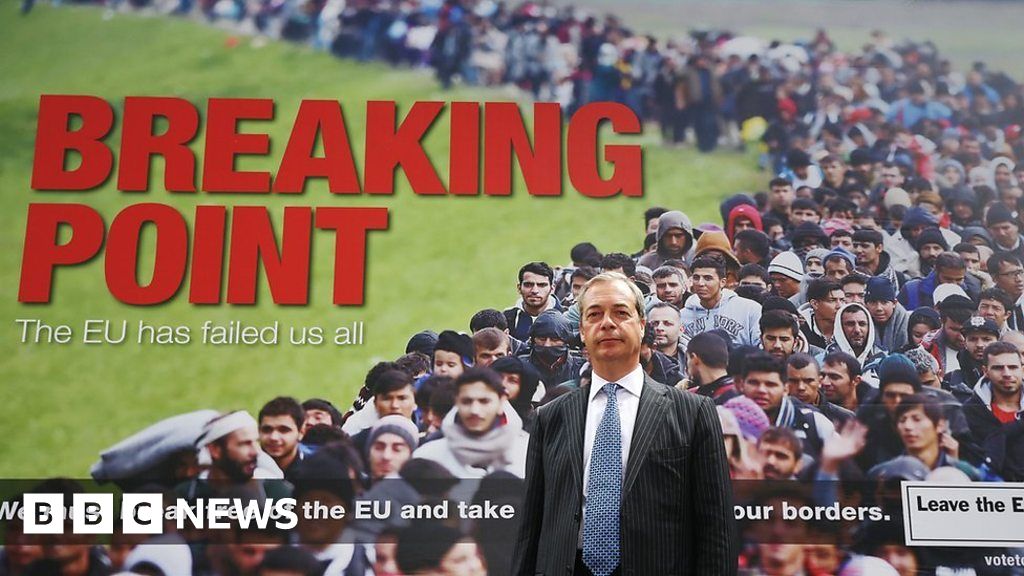
The Brexit referendum campaign in 2016 was dominated by UKIP and the nationalist right wing of the Conservative Party, and indeed was “for a stronger, imperialist England”. Even leftist, little-England Bennite campaigns for a utopian, national-reformist exit from the European Union were completely marginal – the thrust of the campaign was nationalist and anti-immigrant. There is no way to give such a campaign a ‘class axis,’ and attempting to do so led the SL/B to confessedly give political support to the Conservative Party, and to sound like UKIP. As was admitted in the 2021 Conference document, almost in passing, when characterising a particularly egregious, British nationalist SL/B article on Brexit:
“The implicit position defended here by WH is that Marxists must support whatever Brexit deal the Tories will cut in the name of “Brexit today”, which amounts to political support to the Tories.” (https://iclfi.org/spartacist/en/67/slb – emphasis in original)
We consider your point about the domination of the post-Soviet world by imperialist liberalism under an enhanced US imperialist world hegemony, and of there being a failure of the international left to oppose this liberalism, looking instead for inter-imperialist rivalry (which did not materialise after the collapse of the USSR) to be a worthwhile insight. But we suspect that you have taken it too far and overlooked one crucial aspect of the nature of the imperialist bourgeoisie, whose analysis by the Spartacists in the 1970s showed some real foresight. Ironically given your new leadership’s condemnation of “Seymour’s Marxism” – some of the relatively abstract articles he formulated to give a degree of theoretical weight to Robertson’s Shachtmanite deviations regarding the nationalism of oppressed peoples – when Joseph Seymour came to deal with the nationalism of the imperialist bourgeoisie, in our view he got something important correct. His 1977 Essay On Bourgeois Class Consciousness made the following important point about Lenin’s theory of imperialism:
“The issue was first posed sharply in the Marxist movement by Kautsky’s theory of ultra-imperialism, which held that competition between imperialist nations could be peacefully mediated in the same manner as competition between domestic monopolies. Lenin countered that the bourgeoisie cannot transcend national interests and that inter-imperialist agreements can only be based on the existing balance of strength which all parties are desperately seeking to change to their advantage.”
We consider that Seymour was right, that the nature of the imperialist bourgeoisie is that it is fundamentally a national class, and that phenomena such as the ‘liberalism’ and relative lack of national antagonism between imperialist nation-states that was dominant in the period since the collapse of Stalinism, was simply a product of a temporary relationship of forces – a US world hegemony – which is now breaking down. The conclusion to be drawn from this is that imperialist-nationalist hostility to pan-national imperialist blocs, such as the European Union, is not progressive in the least, but simply an expression of the more fundamental nature of imperialist capitalism reasserting itself. So, Brexit, and other similar movements against European ‘integration’, or indeed other forms of imperialist integration anywhere else in the world, are not in the interest of the working class at all, but simply reactionary expressions of imperialist interests. Despite knowing nothing of the post-Soviet world when he wrote this in 1977, Seymour appears to have anticipated Brexit, Trumpism, Salvini, the AfD, and other manifestations of renewed imperialist nationalism which you comrades seem to have illusions in. We note the peculiar, boxed-off presentation/publication of this essay by Seymour in Spartacist #24, and wonder if this was some kind of veiled polemic against Robertson’s implicit support for imperialist separatism, which became manifest in the Spartacists’ 1979 call to boycott the European elections.
Trotsky and the United States of Europe
The question of oppression of Greece by European imperialist powers, and the role of the EU as the agency of crucifying it, should have been addressed as an anti-imperialist struggle, not as part of hostility to European integration. The reason for the economic crucifixion of poorer member-states, which was not confined to Greece but also affected even imperialist Italy, is the contradiction between a single currency and separate state powers with fiscally separate national debts. In other words, that a single currency does not go far enough. It would certainly be legitimate for Greece to have repudiated its outrageous debts and created a new Drachma as an instrument to walk out of the Eurozone and logically the EU also.
That would have been a quasi-revolutionary, anti-imperialist act, and despite Syriza winning a referendum that effectively gave them a mandate to do just that, they did not have the political courage – they capitulated completely to the EU’s austerity programme. The job of workers in the rest of the EU would have been to solidarise with such an act of Greek resistance had it occurred, with political strikes and mass movements to force the EU to back down from all retaliatory measures against Greece. But there is one other relevant demand, particularly given that this resistance did not happen. And that is the demand for the Greek debt to be cancelled by the EU, or more accurately transferred to the debt of the whole EU itself. That demand begins to break down the contradiction between the existence of a single currency and separate state powers that rends the EU.
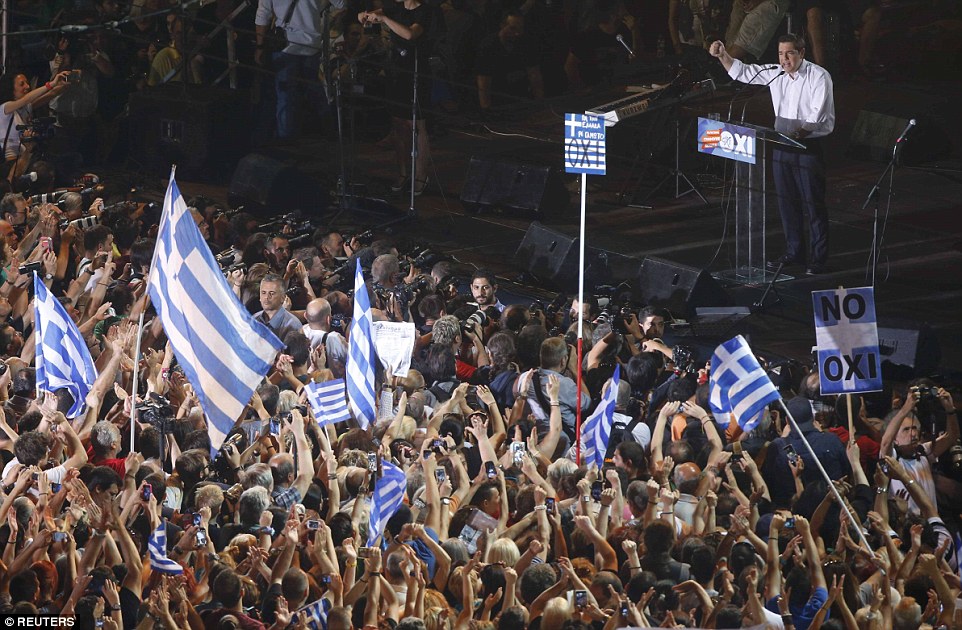
Robertson’s support for British nationalist opposition to the EU was long-standing and always wrong. You have renounced their boycotting on principle of elections to the European Parliament, which has been their public position since at least 1979, in passing along with repudiating their later un-Marxist position of refusing to stand for executive office in bourgeois states. But their Euro-elections position flowed from this position of supporting British nationalist opposition, which is reactionary and always was, and did amount to political support for imperialist nationalism. There is not and never was anything progressive about the policy of British withdrawal from the EU. Britain outside the EU is just as imperialist as Britain within the EU. To support Brexit logically means projecting the British state as in some way progressive. In which case political support for the Tories under Boris Johnson is completely logical.
From the standpoint of consistent Marxism and Trotskyism, there is nothing progressive about the withdrawal of any of the imperialist components of the EU, from that body. Defiance of the EU by any of the non-imperialist components of the EU can have an anti-imperialist content, but support for ‘national struggles’ led by imperialist nationalist forces against the EU inescapably points to the view that imperialist British, French, German, Italian, Dutch, Belgian, Danish, Swedish, etc nationalism are in some way progressive. They are not; taken separately these states are just as imperialist outside the EU as within it. There is nothing progressive about imperialist separatism and never was. And the correct context for raising the demands that you raise for “Independence for Catalonia, the Basque Country, Scotland or for the Flemish and Walloons” is in the context of fighting concretely for the transitional demand of a United States of Europe through demanding the abolition of the separate economic existences of the imperialist powers at the core of the EU, not through supporting imperialist separatism. Imperialist separatism is reactionary and is necessarily fascistic in its implications and programme.
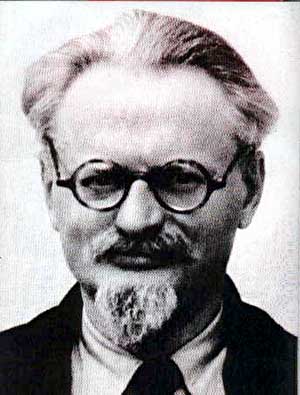
The logic of this characterisation can be found in one important, but neglected work of classical Marxism/Trotskyism – neglected, that is, by the Spartacists – and most other Trotskyists. We refer to Trotsky’s June 1923 essay The United States of Europe, which is subtitled: Is the Time Ripe for the Slogan: ‘The United States of Europe’? (A Discussion Article) (all quotes from https://www.consistent-democrats.org/the-united-states-of-europe/) In it, Trotsky projects demands for economic and political integration of the existing bourgeois states as transitional, pointing the way for the masses to the need for a Socialist United States of Europe, and connected with resisting the tendency of the US to try to dominate Europe. Trotsky wrote:
“In connection with the slogan of ‘A Workers’, and Peasants’ Government’, the time is appropriate, in my opinion, for issuing the slogan of ‘The United States of Europe’. Only by coupling these two slogans shall we get a definite systematic and progressive response to the most burning problems of European development.”
Trotsky continues to elaborate the transitional character of the demand:
“To the toiling masses of Europe it is becoming ever clearer that the bourgeoisie is incapable of solving the basic problems of restoring Europe’s economic life. The slogan: “A Workers’, and Peasants’, Government” is designed to meet the growing attempts of the workers to find a way out by, their own efforts. It has now become necessary to point out this avenue of salvation more concretely, namely, to assert that only in the closest economic co-operation of the peoples of Europe lies the avenue of salvation for our continent from economic decay and from enslavement to mighty American capitalism.”
Trotsky’s words were written in the period when the United States was in the process of jockeying for position with Britain and Germany in the quest for the position of imperialist hegemon, which it only gained after WWII. However, there are resemblances to this period now that the decline of US hegemony has led the US to take outrageous actions such as the destruction of NordStream, blatantly aimed to force Europe into a qualitatively enhanced dependency on the US. One could reasonably suspect that behind Robertson’s attitude was an unspoken US American chauvinist policy, of promoting the kind of US enslavement of which Trotsky spoke:
“America’s standing aloof from Europe, tranquilly biding her time until Europe’s economic agony has reached such a pitch as will make it easy to step in and buy up Europe – as Austria was bought up for a mere pittance. But France cannot stand aloof from Germany, nor can Germany stand aloof from France. Therein lies the crux, and therein lies the solution, of the European problem. Everything else is incidental. Long before the imperialist war we recognised that the Balkan states are incapable of existing and of developing except within a federation. The same is true of the various fragments of the Austro-Hungarian Empire, and of the western portions of tsarist Russia now living outside the Soviet Union. The Apennines, the Pyrenees and Scandinavia are limbs of the European body stretching out toward the seas. They are incapable of an independent existence. The European continent in the present state of development of its productive forces is an economic unit – not a shut-in unit, of course, but one possessing profound internal ties – as was proved in the terrible catastrophe of the world war, and again revealed by the mad paroxysm of the Ruhr occupation. Europe is not a geographical term; Europe is an economic term, something incomparably more concrete especially in the present post-war conditions – than the world market. Just as federation was long ago recognised as essential for the Balkan peninsula, so now the time has arrived for stating definitely and clearly that federation is essential for Balkanised Europe.”
It is almost uncanny the way the connection with Russia is posed: such measures as the destruction of NordStream were and are meant to break this connection today:
“Even if temporarily isolated (and with such a great bridge to the East as the Soviet Union, Europe will not be easily isolated), Europe will be able not only to maintain herself, but to consolidate and build herself up, once she has broken down the customs barriers and has united herself economically to the inexhaustible natural riches of Russia. ‘The United States of Europe’ – a purely revolutionary perspective – is the next stage in our generally revolutionary perspective. It arises from the profound difference in the situations of Europe and America. Whoever ignores this difference, will willy-nilly, drown the true revolutionary perspective in mere historical abstractions. Naturally, the Workers’, and Peasants’, Federation will not stop in its European phase. As we have said, our Soviet Union affords Europe an outlet into Asia, and from Asia into Europe. We are therefore, here envisaging only a stage, but a stage of great historical importance, through which we must first pass.”
Of course, the USSR no longer exists as a workers’ state, but nor have all traces of the revolution disappeared from the world geopolitical scene.
Marxism and the Covid-19 Pandemic
You appear to have been influenced in a contradictory way by some of the nationalist and right-wing populist political forces you have been tailing at times, and some of the influence seems to have played a role in you at least partially breaking from the most egregious, Shachtmanite political deviations of Robertson. We are not moralists – we recognise that this is a period of considerable ideological confusion between left and right which has even affected many good communists and socialists, as well as throwing up some very contradictory new layers and political figures who evidence genuine confusion of a similar sort. We will engage politically with layers who are a lot more politically confused between left and right than yourselves – in West Asia, there are many who have been on the receiving end of Zionist crimes who are confused about the historical truth of the Nazi holocaust, for instance. We do understand that some of the angst you comrades expressed in the Covid pandemic may have played a role in your breaking from old Spartacism.
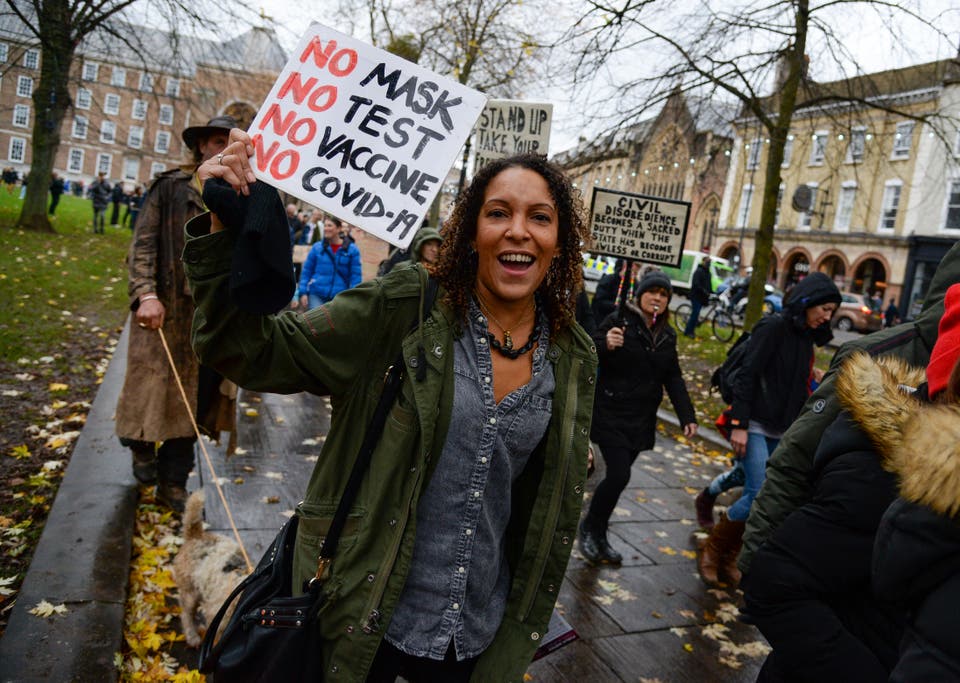
But you were still wrong about Covid. Simply calling for ‘Down with the Lockdowns’ was an absurd position faced with a new disease spreading rapidly between humans that killed a significant proportion of those infected and maimed many more. Carefully limiting social contact to avoid such spread is a basic act of collective self-defence of ordinary people. Of course, the ruling class exploited this catastrophe for their own purposes, of course our rights and social gains came under attack and that had to be opposed in whatever way possible. But preserving working class lives and safety are just as paramount, in some ways more so. You seem to be unaware that at least part of the ruling class – usually the populists like Johnson and Trump – wanted retired workers to die off to save on pension costs etc. Or as Johnson put it “let the bodies pile high”. We think the working class should seek vengeance for this.
In this country, after the disposal of Corbyn, Starmer and Johnson worked together to force re-opening of schools in the autumn of 2020 even before there was any vaccine available – and both attacked the teachers’ unions to do so. The infamous sacking of shadow Education Secretary Rebecca Long-Bailey professed to be about a preposterous accusation of ‘anti-Semitism’ – against someone who had grovelled to the Zionists during her own unsuccessful leadership campaign a few months earlier. Even in Starmerite terms, the accusation was completely phoney. The real reason is that for all her other capitulations, she refused to back down over supporting the teaching unions’ demands to keep the schools closed for safety reasons. Starmer sacked her so that he would be free to back Johnson’s demand for the schools to be reopened, several months before any vaccine was able to be manufactured and distributed.
But the anti-scientific bombast you came out with in practice backed Johnson and Starmer:
“Throughout the pandemic, all of the pseudo-revolutionaries — echoing the trade union tops — have preached the lie that the capitalist state is there to protect workers. Their programme to protect health and safety has been to advocate harsher and longer lockdowns, more plant and school closures and stricter safety rules and Covid guidelines enforced by the health agencies of the bosses. This is suicidal and a betrayal of socialist principles!
Unions are the elementary defence organisations of the proletariat. Their purpose is to defend workers on the job, not fight to send them home! Unions must fight now for trade union control of health and safety! The unions, not the capitalist state, should determine what conditions are safe to work under …” (https://old.iclfi.org/english/wh/247/pandemic.html)

Anti-scientific, and objectively anti-worker, anti-union nonsense. You don’t believe then that unions had the right in those conditions to demand workers be sent home to defend their ‘health and safety” in the face of a dangerous disease, then with no cure or vaccine, spreading among them! Unless they had at their disposal some biological or medical means to stop the spread of that disease, then you were basically saying that workers should risk their lives to keep their workplaces open. You didn’t really believe that “unions … should determine what conditions are safe to work under” if they concluded that, at that point, they were not safe. This was Boris Johnson’s position, and Starmer’s regarding the schools, but not the view of the unions. Your entire polemic was an inversion of reality – and you were demanding that unions should play Russian Roulette with the lives of their members in these conditions.
Then there is your equally foolish position on vaccines. Of course, vaccines are to be welcomed, albeit cautiously in the circumstances of the time. The same blind foolishness playing Russian Roulette with workers led you to write:
“It is in the interest of the working class that everyone on earth be vaccinated against Covid-19. We are for mandatory vaccination, ie being forced to get a jab in your arm. It is not a democratic right to refuse to be vaccinated and spread the virus.” (ibid)
There is an obvious problem with this. At this point these vaccines were new, untested and not proven to be safe. Many workers were fearful of them therefore, and the uptake was slower than it would have been if the vaccines were known to be tested and reliable. But you wanted to use physical force to force workers to “get a jab in their arm”. And you polemicise against the logical conclusion of this policy of compulsion:
But we oppose its enforcement through policies which attack the working class in the name of vaccination. We oppose the government firing NHS workers or any other worker because they aren’t vaccinated. Mass layoffs are an attack against the working class and the unions; we oppose them no matter the reason. We also oppose the vaccine passports, which would track every movement of the population and turn every pub employee and shopkeeper into a cop auxiliary. (ibid)
That only shows you did not have the courage of your convictions. As without state enforcement, your compulsory vaccinations would have been simply unenforceable. Any sane working-class militant would advocate further, gradual testing of the new vaccines and gradual increase of their usage insofar as they were proven to be safe. To build up resistance and restore full economic life as quickly as possible as to be compatible with safety. But in any case, all this bravado was only published after the vaccines began to be rolled out.
Unlike the ICL, the LCFI did not collapse during the pandemic. Nor did we engage in any adventurism with anyone’s health. We unfortunately had one person we had worked with politically in Britain die of Covid, and another contact who we spent a lot of time discussing with later died because of the flaws of a vaccine that was not fully tested. We produced this international statement April 2020, long before the vaccines appeared:
“We support the quarantine and demand effective measures of public health. We will also support agitation to force recalcitrant neoliberal regimes to carry out such measures where they a playing with obscenities like Johnson’s injunction to the British population to ‘take it on the chin’. While there is no vaccine or cure for this new disease the working class is in a defensive, backs-to-the-wall situation and needs to be extremely cautious about protecting its most vulnerable and frail components. We must seize on the weapon of quarantine to protect ourselves, and fight for the nationalisation of health provision and its supply chain, housing for the homeless, and protections for workers sacked because of the pandemic. We defend the international solidarity efforts of the workers’ states and peoples oppressed by imperialism against the pandemic, as Cuba has been doing.
But this situation is causing the capitalist system to totter economically, and we must demand of the bourgeois states every possible measure to negate the ruinous impact of capitalism and neo-liberalism on the masses. We demand the expropriation of private healthcare and the privileges of the rich to save as many working class people as possible from the pandemic. We demand the expropriation of failing industries in the economic crisis, and that all workers, in regular and ‘casual’ employment of all kinds, be paid in full for the duration of the pandemic. We demand economic planning to handle the economic needs of the masses under quarantine; the idea that market economics and neoliberalism can be any kind of solution to any of this is poisonous rubbish, too preposterous for words. Such is the international nature of this human crisis that this must be on a world scale if a terrible death toll is to be avoided in the poorest parts of the world.
At the same time we must be vigilant against attempts by far right and fascist forces to exploit the need for a quarantine to attack the democratic rights of the masses, to attack our freedom to criticise, to institute a dictatorship. An ominous example is the demand of Orban in Hungary for the right to rule by decree for the duration of the pandemic. There are similar dangers from Trump in the US, from Johnson in Britain, and in many other places. We must be on our guard.
Above all we demand and seek the world revolution, as the only way to save the working class, and the planet on which we live, which is being degraded and polluted, particularly through capitalist mode of production induced climate change, to the point where human extinction is on the horizon. Capitalism has caused a devastating Climate Change that in combination with systematic destruction of nature have caused unprecedented degradation of nature throughout the world. This allows deadly viruses such as the coronavirus to evolve, adapt, and jump from animals to humans. While we are facing such a deadly threat it may appear unrealistic to talk of world revolution, but the root causes of this calamity, and others to come, dictate political and economic tasks that only the world proletariat in power can solve. This particular disaster will end at some point and there must be a reckoning with its causes. We need worldwide economic planning, we need an end to the destruction of the ecosphere, we need the revolutionary overthrow of capitalism worldwide.” (https://www.consistent-democrats.org/uncategorized/the-covid-19-pandemic-and-the-world-capitalist-crisis-statement/)
We are perfectly prepared to believe, as you say, that the political blowup in the ICL over Covid played some kind of role as a catalyst for you to embark on a trajectory towards a healthy rejection of several of Robertson’s worst positions. Political life and evolution of currents is complex and often contradictory. But we will not pretend that your attitude to Covid was Marxist. It resembled a form of anti-scientific anarchism and seemed to be partly driven by tailing after some elements of right-wing populism.
Social Democracy, Critical Support and Entryism

We also consider that the Spartacists abstentionism when workers with a social-democratic consciousness go into battle against the bourgeoisie in elections was a manifestation of Roberston’s sectarian variation of Shachtmanism. We note that you appear to have broken with some of that that practice – the fact that you did work campaigning for George Galloway’s Workers Party in the 2024 General Election and attempted to do the same with the Socialist Party’s electoral vehicle TUSC, is evidence of a break with this sectarian manifestation of Shachtmanism that marred Spartacist practice for many years. We certainly regard that as a progressive development as far as it goes.
However, an examination of the conference document of the SL/B from 2021 shows clearly continued inability to politically deal with social democracy, and Trotskyist tactics towards it. It is strange indeed that this document devotes considerable space to agonising about supposed ‘adaptation’ to the movement around Jeremy Corbyn in 2015, and all kind of quibbles about nuances and alleged deviations among your comrades from some kind of ‘pure’ Spartacist line on how to deal with Corbyn, yet devotes much less space to the much more serious deviation from communist politics embodied in the self-confessed ‘political support’ your comrades gave to imperialist British nationalism and the right-wing populist politics of Boris Johnson’s Tories in the same period. This shows severe disorientation and is a reflection of your continued adherence to elements of Robertson’s deviant politics which found expression in Spartacist politics … his imperialist chauvinism. How on earth can this self-confessed political support for the Tories not be a much more serious issue in the SL than tactical differences on how to deal with the Corbyn movement, given the fundamental class difference between the two? This is a sign of serious disorientation in our view.
Your attitude to the Corbyn movement itself was an example of sectarian abstentionism. The victory of Jeremy Corbyn in 2015 in his challenge for the Labour leadership was the most stunning victory of a left-wing challenger in the entire history of the Labour Party. The only other such victories of those on the left of the party were those of George Lansbury in 1932, and Michael Foot in 1980. But neither are really comparable – Lansbury did not lead a challenge for the leadership – it fell into his hands virtually unopposed after the right-wing led by Ramsay MacDonald walked out of the Labour Party into coalition with the Tories in 1931, the most notorious act of betrayal to old-style finance capital in the history of the Labour Party. And Foot, by the time he became leader, was a near-geriatric who had already capitulated to the right wing decisively – Spartacist Britain in 1982 described him as a “caretaker” appointed by the union bureaucracy, and “a living metaphor for the shambling state of the party” after its election defeat by Thatcher in 1979.
The SL/B admit, in contrast, that “The 2015 election of Corbyn as leader of the Labour Party marked a sharp turn to the left after decades of Blairite domination of the party and represented a major change in the political landscape in Britain.” Yet you refused to draw the obvious organisational conclusion from this and carry out the classic Trotskyist tactic of entryism into the Labour Party despite conditions obviously as ripe for such an entry as they had ever been since the Second World War at least.
If entryism was not principled in Labour in circumstances of “a sharp turn to the left” after “decades” of right-wing domination and constituting “a major change in the political landscape in Britain”, then when would it ever be principled? You may be aware that prior to WWII, British Trotskyist organisations such as the Marxist League, the Revolutionary Socialist League and the Workers International League, conducted systematic entry work in Labour even in the absence of the kind of startling political shift in the working class that put Corbyn into the leadership.
Yet we see a somewhat surreal debate in the SL/B about the supposed ‘capitulation’ of the organisation to Corbynism and left-reformism in this context. A year after Corbyn was elected leader, the Blairites tried to engineer a coup, nicknamed the ‘Chicken Coup’ (because of the cowardly manipulation of those involved) to remove him from the leadership. Part of the bureaucracy, led the Blairite general secretary Iain MacNichol, even tried to abuse bureaucratic rules to exclude Corbyn, who had been overwhelmingly elected the previous year, from the ballot. Corbyn’s election, as you admit, represented “a sharp turn to the left” in “the political landscape in Britain” yet absurdly your document denounces your own comrades for “capitulating to Corbyn” for (from the outside) supporting Corbyn on the subsequent re-ballot. The attempt to exclude him was ruled to be unlawful – no doubt a reflection of ruling-class fear of what might ensue if this “sharp turn to the left” were to be forced outside the framework of the Labour Party.
Strangely, those comrades in your own ranks who wanted to support Corbyn against the ‘Chicken Coup’ were denounced for not withdrawing support for Corbyn when he failed to support Brexit. We have to observe that, while you admit that Corbyn’s election represented “a sharp turn to the left … in the political landscape in Britain”, Brexit meant exactly the opposite. It was a counter-tendency to this “sharp turn to the left” … if was the product of pressure from the extreme, anti-immigrant right of the Tory Party, from the right-wing populist UKIP party, and later Nigel Farage’s Brexit Party (now Reform) on the Tory Party mainstream that the Brexit referendum was even called at all. Brexit represented a “sharp turn to the right” in “the political landscape in Britain” because it was clearly an anti-immigrant, xenophobic vote.
Your leadership is badly confused with this position, as opposition to Brexit among Corbyn supporters was clearly an overwhelming view from 2015 onwards – because of the xenophobic and racist nature of the Brexit vote. If Corbyn’s election was a shift to the left – and it clearly was – the ruling class was absolutely hysterical about it – those in your leadership who denounced those comrades for defending Corbyn’s early leadership when it came under attack from a Blairite coup seemed to be saying that it was too far to the left for them, given their political softness on Farage, Johnson, Gove and all the rest of those reactionary English nationalists who were using Brexit nationalism precisely in order to poison the working class movement against this very “turn to the left”. The reasons why the Brexiters succeeded in defeating Corbyn in 2019 are complex and deserve careful analysis. Sabotage and manipulation of backward working- class layers by Blairites such as Starmer played a big role. But the fact that you seem to have less qualms and to attach less importance to your own comrades … in your words, expressing “political support to the Tories” than you do about support your comrades defending Corbyn’s leadership against an attempted anti-democratic Blairite coup within Labour shows severe disorientation, to put it mildly.
Entryism was perfectly possible during the Corbyn period, and the British section of the LCFI, with very limited means, carried it out. Our entry work was not at all liquidationist – almost from the beginning our comrades and our politics became an issue in national politics and the national press. The original leading comrade of Socialist Fight, our then British Section, comrade Downing, was excluded from the Labour Party for open Trotskyism in late 2015. He appealed his exclusion and actually won the appeal! He was then denounced by David Cameron in the House of Commons in early 2016 as a supposed defender of ‘terrorism’ for refusing to condemn the motives of the 9-11 attackers in a point made in an online post. He was immediately expelled again, and then our comrades were subjected to a considerable witchhunt in the media, not particularly over that item, but for our sharply critical Marxist analysis of Zionism, the Israel lobby and the Jewish Question (in the tradition of Karl Marx and Abram Leon). Socialist Fight comrades continued political activity within Labour as best we could, and our people who remained within certainly defended Corbyn against the Chicken Coup.
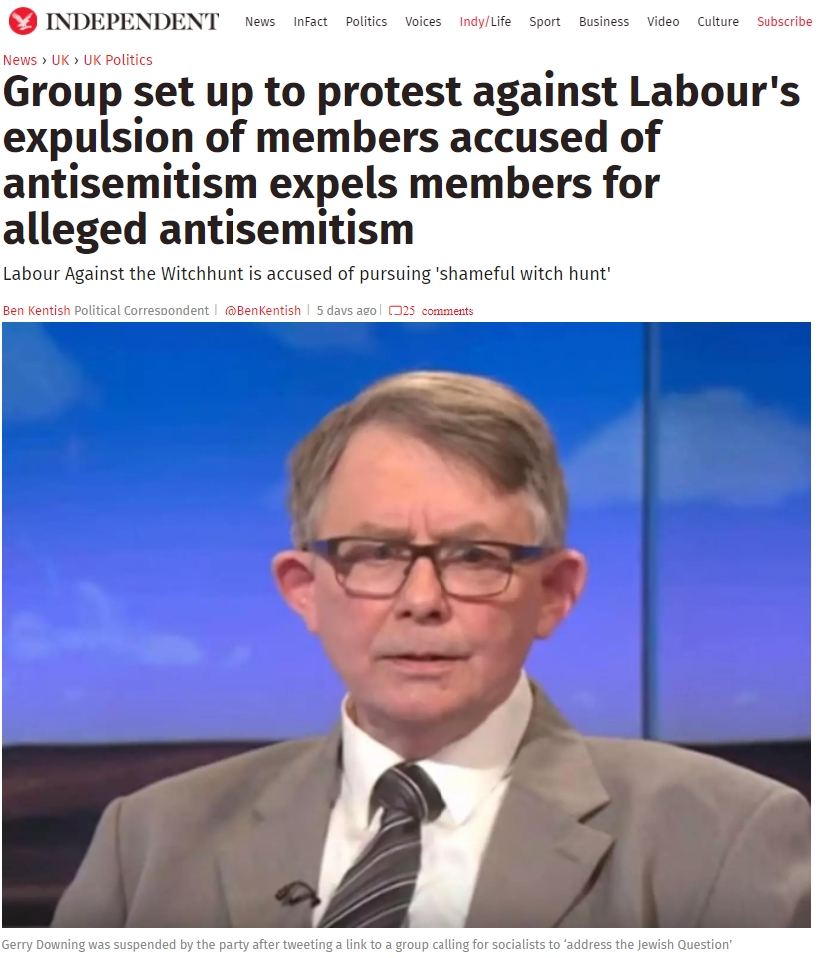
We were also highly critical of Corbyn and his capitulation to the witchhunt against phoney ‘anti-Semitism’ that accelerated in the years that followed. In late 2017 we participated in the founding of Labour Against the Witchhunt, conceived of as a broad left-wing campaign group whose name is self-explanatory. It was set up to defend the whole left, but some third-campist and Bundist-inclined Jewish leftists within it panicked when confronted with our sharp anti-Zionist analysis. They suddenly behaved like Corbyn in the face of Zionist pressure and attempted to exclude us from LAW on grounds that we were ‘anti-Semitic’, right while they were being threatened with exclusion on the equally phoney grounds that they were ‘anti-Semitic’. But when this proposal was put to the vote at an LAW meeting in December 2017, they lost the vote!
So the CPGB/Weekly Worker, along with the Maidan-supporting, anti-Assad war-supporting Socialist Resistance, declared a national mobilisation in January 2018 for a meeting to kick us out of Labour Against the Witchhunt. Predictably, they won the vote at that meeting by around 2 to 1. We did also manage to mobilise significant support ourselves, and we know that some of those involved – who we work alongside politically today – are embarrassed about what was done at that meeting, which made national headlines in the bourgeois press (see https://tinyurl.com/2ucexfps) . We are not – we are proud that our hard anti-Zionism was too much not only for the Corbynites but also for many in Labour to their left. In the light of today’s Zionist genocide that speaks well of our far-sightedness.
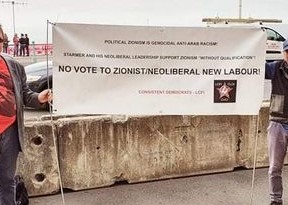
Our entryism came to an end when the Corbyn leadership was defeated by the Blairite right, through the sabotage of the 2019 General Election. Unfortunately, at that time the original leader of our British section, comrade Downing, changed his mind about our critique of Zionism and began denouncing what is now clearly the majority of the British group for ‘anti-Semitism’. He had been the focus of ferocious witchhunting and social pressure for several years and he vainly attempted bureaucratically to remain in his position as the leader of the British group. His splitting away was a tragedy, though his smaller group maintains an affiliation to the LCFI. But the bulk of the British section overcame this unfortunate split, and left Labour in good order when Starmer ousted Corbyn as leader in the Spring of 2020. As soon as we were able (in 2020 this was not possible due to Covid) we demonstrated with a banner outside the 2021 Labour conference with a banner reading ‘No Vote to Zionist/Neoliberal New Labour!’ making clear our break from Labour when an open Zionist racist became leader (see photo on front page of Communist Fight no 7, https://www.consistent-democrats.org/uncategorized/communist-fight-issue-7-available-now/). Despite the political problems we experienced – which are not unprecedented as anyone who knows the history of the Trotskyist movement will be aware, this is what principled entry-work looks like.
Labour, the Bourgeois Workers Party, and the Dialectic
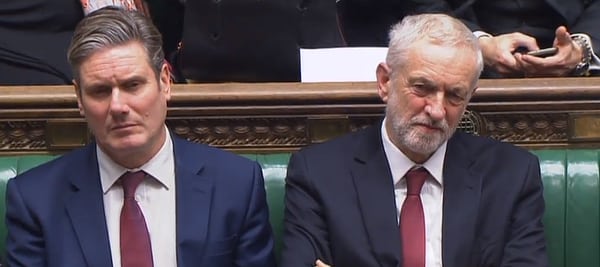
Another aspect of your internal polemics about the Labour Party strikes us as strange and un-Marxist. A difference of view, about the precise nature of the class contradictions in the Labour Party which seems to have been implicit and tenuous, is highlighted in your 2021 conference document thus:
“The reason the SL/B gave for supporting Corbyn was basically that the Blairites were qualitatively different from previous right-wing factions in the Labour Party. The SL/B presented the Blairites as if they no longer had the contradiction of having a bourgeois programme and an organic link to the working class but had a purely bourgeois class character despite being inside the Labour Party. This is simply false; Blair was not the first Labour leader wanting to separate himself from the working-class base of the party (which is different from being able to do so). The liberal bourgeois programme of Labour means that the tops are constantly driven into conflict with their working-class base, which constitutes both the source of their power and a shackle to their bourgeois ambitions.”
The main previous example of a Labour leader that ‘tried’ to separate himself from the Labour Party’s working-class base was Ramsay MacDonald, who exited from the Labour Party under fire into a coalition with the Tories and is reviled as the worst traitor in its history. However, the working-class base of the Labour Party has found it much more difficult to separate itself from Blairism, and there is a material reason for that. In the days when the industrial proletariat in manufacturing was the dominant social force, the political bureaucracy of the Labour Party acted as the agent of finance capital, which Lenin defined as the fusion of industrial and banking capital. With the massacre of manufacturing and the outsourcing of millions of jobs, it would be more correct to define today’s version of that bureaucracy as agents of financial capital, i.e. parasitic finance that has become far more autonomous from industrial capital in the classic sense. So instead of right-wing bureaucrats who embody the class-collaborationism of mass trade unions, in the mould of Ernest Bevin, Denis Healey, Peter Shore, Roy Hattersley, James Callaghan, etc, who were organically connected to organised workers (albeit often mediated by various CIA-funded ‘Labour’ fronts), today you have the likes of Starmer, Blair, Mandelson, and Labour Zionists like Streeting, Akehurst and the like, whose connections are with high finance, Hedge Funds, and rather often, the Israeli Embassy.
That is a material difference. It is also why in the period when the Labour Party really did command the loyalty of huge layers of organised workers as a political agency of finance capital, it was generally correct for Marxists to advocate critical support for it in elections. Trotsky, you might be aware, was scathing in the 1930s about leftists who refused to give electoral support to Labour. Today, when Labour in its death agony has a bureaucracy a considerable portion of who are simply open agents of financial sharks and privateers, the occasions when it is principled to give critical support to such parties are much fewer and far between. Formally, both these variants still represent a bourgeois workers party, and so vulgar ‘Marxists’ might think the same tactics should be applied. But your tendency avoids such questions by ignoring Trotsky’s writings on the Labour Party and critical support before WWII. Trotsky was scathing about this kind of ‘logic’ in In Defence of Marxism: ‘A is not equal to A’. Or as Heraclitus remarked, quite in the spirit of Marx’s dialectic, “It is not possible to step into the same river twice”.
By refusing to take sides in the ‘Chicken Coup’, which was a political class battle waged in the Labour Party by Corbyn’s base, and denouncing those in your own ranks who wanted to do so, you were again acting as pseudo-intransigent Shachtmanites – a left cover for the agents of financial capital who are actually seeking to destroy the working class element of Labour, which the most class-conscious workers seek to preserve as an expression of their own class interests. But if those trained by Robertson can give political support to Tories, then this kind of betrayal is not that different either.
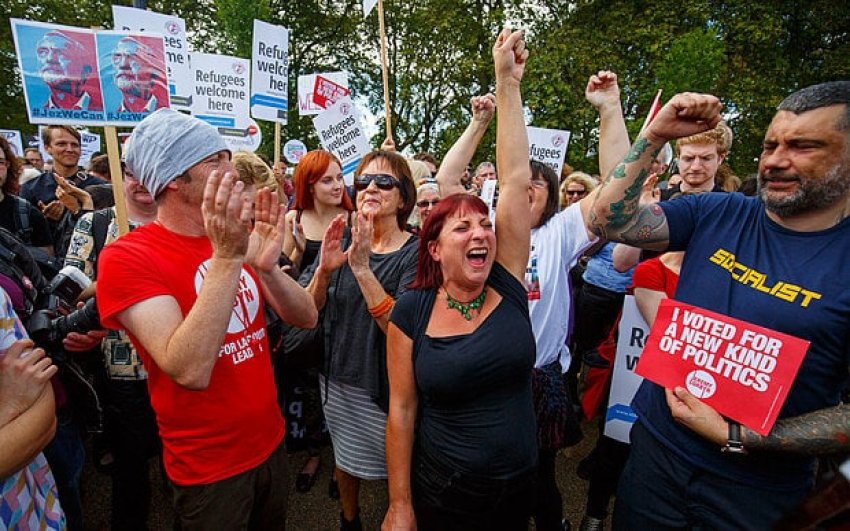
One other spurious piece of reasoning is the following formulation in your polemic against SL/Bers who were inclined to support Corbyn against the Chicken Coup was this polemic that against the idea that “driving the Blairites out would mean a step towards the proletariat no longer being subordinated politically to the bourgeoisie….”
Which logically means that it would be wrong to advocate driving the Blairites out of the Labour Party. Abstentionist nonsense. Even a quantitative move to the left if such an endeavour succeeded would result in more fertile conditions for those advocating “the proletariat no longer being subordinated politically to the bourgeoisie”- i.e. a qualitative shift. Such a split would likely be a step along the road to the real programmatic split we want. Otherwise, what’s the point in advocating driving the CIA-connected right-wing, or today’s Zionists, out of the Labour Party if “the programme of both wings of the Labour Party is bourgeois”, implying equally bourgeois? If it serves no useful purpose in class terms, there is no point. Trotsky said that centrism is ‘crystallised confusion’ and this strange and incoherent polemic is a case in point.
Russia, China, Revolution and Counterrevolution
Now we come to two sets of questions related to what those in the old SL called the ‘Russian Question”, directly or indirectly: your polemic against the old International Spartacist tendency over Poland and the positions that it took in 1981 over Solidarność and its suppression through martial law in December 1981 by the Polish Stalinist regime of General Jaruzelski, as well as a broader polemic against the SL that is apparently embodied in your polemic in defence of Trotsky’s call for an Independent Soviet Ukraine against the old Spartacists who formally renounced this call in 1993.
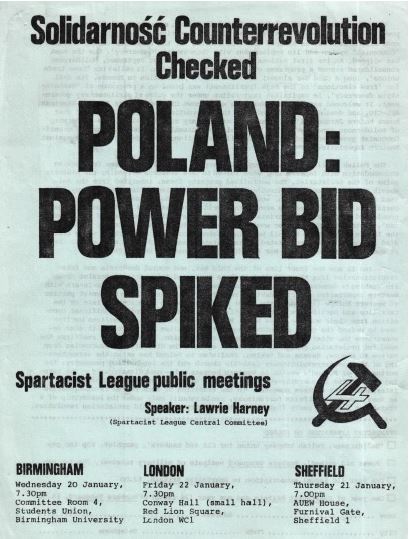
We consider that the first question embodies a question of principle, as laid out by Trotsky in a seminal point in his major polemic against the Shachtman-Burnham trend in the US SWP in 1939:
“We must formulate our slogans in such a way that the workers see clearly just what we are defending in the USSR, (state property and planned economy), and against whom we are conducting a ruthless struggle (the parasitic bureaucracy and their Comintern). We must not lose sight for a single moment of the fact that the question of overthrowing the Soviet bureaucracy is for us subordinate to the question of preserving state property in the means of production of the USSR: that the question of preserving state property in the means of production in the USSR is subordinate for us to the question of the world proletarian revolution.” (Trotsky, The USSR in War, from In Defence of Marxism, p21)
We do note your polemic against your political forebears over this, taking exception to the formulation they used in September 1981, to announce that, as its first Congress, held that month, the mass trade union Solidarność had consolidated around a programme of neoliberalism and capitalist restoration in the name of Western ‘democracy’. We also note that you appear to agree with them on the premise that apparently motivated the formulation that you denounce, because you say of the Stalinist bloc, in your document The Breakdown of U.S. Hegemony & the Struggle for Workers Power, that:
“By the end of the ’80s, the USSR and the Eastern bloc were in deep economic and political distress. The retreat of the Red Army from Afghanistan and the counterrevolutionary victory of Solidarność in Poland further demoralized the ruling bureaucracy in Moscow. After Moscow sold out the DDR (East Germany) and acceded to German reunification, it wasn’t long before it sold out the Soviet Union itself. The pressures of world imperialism combined with working-class demoralization from decades of Stalinist treachery led to the final liquidation of the gains of the October Revolution. By 1991 the international balance of class forces had decisively shifted in favor of imperialism at the expense of the working class and oppressed of the world. (https://iclfi.org/spartacist/en/68/breakdown, emphasis added)
Yet in you say of their call in September 1981 that:
“As the Polish and Soviet Stalinist regimes moved to stop Solidarność, the Spartacist tendency capsized Trotskyist defensism by declaring:
“If the Kremlin Stalinists, in their necessarily brutal, stupid way, intervene militarily to stop it, we will support this. And we take responsibility in advance for this; whatever the idiocies and atrocities they will commit, we do not flinch from defending the crushing of Solidarity’s counterrevolution.” (Stop Solidarity’s Counterrevolution, Workers Vanguard No. 289, 25 September 1981, cited in your recent article In Defense of Permanent Revolution—For Communist Leadership of the Anti‑Imperialist Struggle!, in Spartacist #68 https://iclfi.org/spartacist/en/68/permrev)
You condemn this formulation thus:
“That was a statement of political support to the Stalinist bureaucracy, utterly counterposed to mobilizing workers in the USSR and Poland to wrest political power from the Stalinists whose entire program undermined defense of both workers states.”
It seems to us that, though the formulation used is crude and provocative, it does not in itself amount to political support of the Stalinists. It does not call for any “idiocies and atrocities”, indeed it implies that it will support the Stalinists in a future military confrontation (at that point) despite such horrors. Though it had threatening overtones, which could be considered as a morbid sign of a Stalinophile bloodthirstiness in what was in fact a tragic situation, it did not formally break with the tenets of Soviet defencism. You continue
“As a ‘theoretical’ justification for its capitulation to Stalinism on the national question, the ICL repeatedly declared that self-determination and other democratic questions were subordinated to defense of the workers states, a ‘class question.’ To be sure, there are many historical examples of imperialist-backed forces raising the national-democratic banner as a rallying point for counterrevolution, as the Mensheviks did in Georgia during the Russian Civil War. In such cases, defense of the workers state is the primary need of the moment, although that does not erase the reality of national oppression and the need to combat it. Yet the ICL abused such history to reject the struggle for democratic and national rights in the workers states in toto. “
We would say that despite the provocative tone of the passage you criticise, it is important to be clear that in the Autumn of 1981, Solidarność had consolidated around a counterrevolutionary programme and was seeking to oust a Stalinist regime that was on the verge of collapse, and if it had done so, a counterrevolutionary regime would have been the immediate outcome. It was necessary to oppose that and, in the event that the apparatus of the Polish deformed workers state tried to stop that happening – as it did in December 1981 with Jaruzelski’s Martial Law, to side with those forces against Solidarność.
This seems (so far) to be the definitive passage that you have written about the Martial Law confrontation between Solidarność and the Stalinist regime in 1981. It has some ambiguities. On the one hand, it positively cites the precedent of Menshevik Georgia, which was forcibly ousted by the early Soviet power in 1921, led by Lenin and Trotsky. Yet it appears to attack that formulation of the Spartacists in itself as a “capitulation to Stalinism on the national question” for stating that “self-determination and other democratic questions were subordinated to defense of the workers states, a ‘class question.’” Yet of course, that was exactly the formulation the Bolsheviks used to justify the forcible Sovietisation of Menshevik Georgia. That is the ambiguity in the passage – it does not clearly state that, notwithstanding the enormous political gulf between the early Soviet republic in 1921, and the decrepit Polish deformed workers state in 1981, that element exists in common – the counterrevolution must be military stopped from gaining or holding state power.
If you are saying that despite taking a formally correct position on supressing the counterrevolutionary threat in 1981, the then-iSt’s brutal overtones in that passage reflected a barely hidden Stalinophile chauvinism, we would concur. As a current, we came to the conclusion while discussing our draft programme in 2020-21 that the basic Spartacist position on 1981 was correct, but that at the same time their propaganda was flawed by chauvinist and anti-working-class elements:
“Their response to the rise of Solidarność in Poland, once it became clear what the political thrust of the movement actually was, correctly was to highlight the developing pro-capitalist politics that were becoming dominant in the movement. However, their Stalinophile deviations manifested themselves in their propaganda that denounced the Polish working class in ways that resembled anti-union tirades from bourgeois politicians in capitalist countries. Polish workers were denounced for supposedly being too well-fed and the endemic shortages engendered by Stalinist bureaucratic misrule were blamed on the supposedly lazy and strike-prone Polish workers. While it certainly was correct by the end of 1981 when the Solidarność leadership were indeed driving to topple the Stalinist regime, to bloc militarily with Jaruzelski to prevent such a counterrevolution, the anti-union and anti-worker thrust of much Spartacist propaganda contradicted the pro-socialist thrust that should have permeated the revolutionary attitude: that we are for workers power, not capitalist restoration.
“Throughout the martial law period as Solidarność under Jaruzelski’s restrictions became more and more openly pro-capitalist and neo-liberal, and eventually called for a Polish Stock Market, the Spartacists fulminated against them while at the same time looking to ‘harder’ elements of the Stalinist regimes to fight the counterrevolutionary drift. So, there was a portrait of Poland’s Jaruzelski in their New York office. Around the same period, the Vietnamese Stalinist regime, whom Robertson visited and sought some kind of fraternal relations, as part of Đổi Mới also called for the creation of a stock market in Vietnam, and then began to implement its plans. The Spartacists were silent about this, though through their contacts with this regime they must have known about it.” (https://www.consistent-democrats.org/lcfi-draft-programme/)
It looks to us that your points about their chauvinism on the national question have some validity, but it is not clear that it was national oppression that drove Polish workers to support neoliberalism under the Solidarność banner any more than it was national oppression that drove many Russian workers to Yelstin’s neoliberal banner. It was despair at the evident bankruptcy and venality of Stalinist bureaucratic rule and the complete absence of a compelling perspective that could overcome it in a progressive direction, that drove many working-class people behind the fools’ gold of capitalist restoration.
It is highly doubtful that adapting to Polish national sentiment would have helped Marxists to overcome workers’ illusions in capitalism. It is true that the Hungarian revolution in 1956 was driven by an aspiring national communism, with genuine workers councils in major cities. In Hungary the national communists were brutally supressed, but in Poland they were allowed to take office in a controlled manner after some repression and proved just as bankrupt as their more conventional Stalinist former persecutors. The national-communists Gomulka, and then Gierek proved their bankruptcy, and paved the way for Solidarność. It was precisely their national-bureaucratism that undermined their own authority. We counterpose internationalism to that, not some kind of hybrid national-internationalism trying to feed off the sentiments that drove Solidarnośc, the various so-called ‘Popular Fronts’ in the Baltic states, etc.
The call for an independent Soviet Ukraine, or Poland for that matter is a perfectly appropriate way to seek to undermine national conflict involving perceived national oppression within a degenerated/deformed workers’ state. Obviously raising such a demand is a tactical question; it cannot just be raised independently of time and space – there must be some possibility of it being achievable when Marxists raise it, otherwise there is no point. In our view the old ICL contradicted themselves when they dismissed the possibilities of such a thing being reasonable. On the one hand they argued that:
“…in 1939 all tendencies of Ukrainian nationalism looked to Nazi Germany for support. There is little reason to believe that the demand for an independent Soviet Ukraine (which would be committed to the defense of Soviet Russia) would have found much receptivity among national-minded Ukrainians.” (Spartacist 49-50, Winter 1993-4, p13)
Then a few sentences later they cited evidence of the opposite:
“Events soon proved that Trotsky overestimated anti-Soviet attitudes among the Ukrainian masses. Many workers and peasants in the western Ukraine welcomed the Red Army occupation in September 1939, a fact which Trotsky himself emphasized in his polemics against the Shachtman-Burnham third campists. When the German Wehrmacht invaded the Ukraine in July 1941, they were to a certain degree welcomed as “liberators” by sections of the Ukrainian populace. However, the pro-Nazi Ukrainian nationalists – in part because of the extreme brutality and undisguised colonial character of the German occupation – were never able to gain a mass following.” (ibid)
It is peculiar that the ICL then equated Ukrainian national sentiment in that situation with “Anti-Soviet attitudes among the Ukrainian masses”. The fact that a significant part of the population could even consider welcoming an invading army as ‘liberators’ indicates considerable nationalist discontent. According to this rendering that was then rejected, and the opposite welcome subsequently happened in Polish Western Ukraine – the Red Army being welcomed because of the revolutionary changes it brought in its train. This showed, as clearly as any indicators are likely to, that national discontent with Stalinist rule co-existed with pro-Soviet sentiment in such a way that the demand for an independent Soviet Ukraine and indeed the revolutionary unification of Ukraine could have had considerable purchase if a significant force on the ground had been present able to fight for it.
The ICL’s own attempt to justify the renunciation of Trotsky’s demand, understood properly, backs Trotsky’s case. We would observe that it is peculiar that they only renounced Trotsky’s demand in 1993: in 1981 and through the whole period of the collapse of Stalinism they at least formally stood with Trotsky on this. It is obvious to us that this change was a symptom of a further move away from orthodoxy by the ICL after the collapse of Stalinism. It does not invalidate opposition to Solidarność. Since such pro-Soviet sentiments as the ICL noted in Ukraine at the start of WWII were simply absent in Poland in 1981.
We hope it is not the case that the new ICL is in the process of retrospectively embracing the various forms of East European nationalism that played a major role in the destruction of the deformed workers states of Eastern Europe. We suspect this is a smear from the semi-unreconstructed Robertson cultists of the Norden group, but some of your ambiguity on this is a cause for concern. Aspects of your position on the Ukraine war, and on China regarding the Uighurs, give some credence to such misgivings.
Marxism and the Post-Counterrevolution Cold War
We do not consider China to be a deformed workers state any longer. We consider it belongs to a similar new category of deformed bourgeois state as Russia does. This is a very important concept as there are still programmatic reasons for defending this new type of non-imperialist bourgeois state against imperialist attack and internal overthrow by imperialist-proxy forces, despite the liquidation of the actual proletarian dictatorship. Even though they cannot simply be equated with semi-colonies, they are more powerful than that, they are not imperialist and are still the object of class-based hatred from imperialism, which makes them in a similar way oppressed countries that we are doubly duty-bound to defend by the method of the AIUF, as discussed earlier.
Not least because, in the absence of a tested state apparatus proven in life to be dedicated to defending capitalism arms in hand against the masses, it might still be possible for the counterrevolutions to be reversed by the masses without a fully fledged civil war. Recall that Marx himself considered that a peaceful overthrow of capital was at least theoretically possible in Britain in the mid-19th Century, before such a hardened bourgeois state had consolidated there. It is probably more conceivable for that to happen in today’s Russia and China than at that point in British history. This is also the real reason for the eruption of today’s imperialist Cold War against Russia and China.
For us, deformed workers states were deformed by economic backwardness and lack of productive capacity due to isolation and imperialist encirclement, where to administer the limited means something akin to, in Lenin’s words in State and Revolution, a “bourgeois state without the bourgeoisie” emerged out of necessity to hold the society together. With the prolonged isolation of Soviet Russia and then the USSR, this bourgeois social excrescence within the workers state was able to politically expropriate the proletariat in their own state. This political expropriation necessitated a supplementary political revolution to return political power to the proletariat.
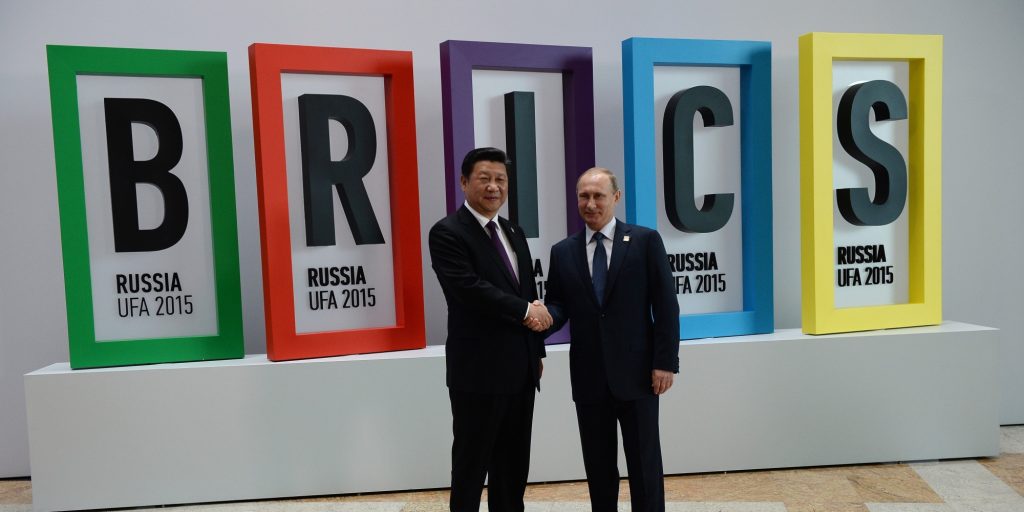
However, with the counterrevolution in the degenerated workers state of the USSR, and the giant deformed workers state that was China, the bourgeois states that resulted faced the opposite deformation – productive forces, and a state apparatus intertwined with them, that were developed massively under the embryonic beginnings of a higher mode of production than capitalism. It is true that these deformed workers states did not succeed and could not because of their isolation from the productive capacity of the imperialist world, in achieving the lower stage of communism, or ‘socialism’ as a fully developed mode of production. But they achieved massive expansion of their productive forces under a planned, socialised economy. The mode of production that operated under that situation was not socialist in the complete sense, but it was still a transitional form struggling, even if ultimately in vain because of the bourgeois deformations, to achieve that higher mode of production. It was therefore already somewhat higher in its developmental capacity than declining capitalism, as Trotsky noted in the Revolution Betrayed when he wrote that the Stalinist regime:
“… has not yet touched the economic foundations of the state created by the revolution which, despite all the deformation and distortion, assure an unprecedented development of the productive forces.” (Once Again: The USSR and Its Defence, https://www.marxists.org/archive/trotsky/1937/11/ussr.htm)
That unprecedented development of the productive forces took place under a mode of production, however embryonic and however stunted by the deformations of those workers states, more advanced than capitalism. And that development took place for several decades. It cannot simply be rolled backward automatically by the counterrevolution. On the contrary, those post-capitalist aspects of those society deform the counterrevolution, limit its sweep, and make those states into formations that imperialism itself does not consider reliably capitalist, or to be trusted at all. We sum up this issue theoretically in the following passages in our statement on Marxism and the Post Counterrevolution Cold War, linked to earlier:
“The existence of a workers’ state, however deformed or degenerated, means that that state has already begun the transition to a higher mode of production, communism. Even if the transition is blocked by social backwardness, imperialist encirclement and the monopoly of power of a bureaucracy that opposes and attempts to sabotage the world revolution and thereby the completion of the transition, the transition has begun. The train has left the station, even if it is stalled only a few hundred yards down a track that is many miles long. It is extremely heavy, and still very difficult to simply drag back to its starting point and beyond. (https://www.consistent-democrats.org/uncategorized/lcfi-statement-marxism-and-the-post-counterrevolution-cold-war/)
Furthermore:
“After the expropriation of the bourgeoisie through revolutionary processes and once the post-capitalist process of economic monopolization, centralization and planning has been unleashed, it is no longer possible to return to the previous conditions of the pre-capitalist capitalist mode of production. This generates a series of partial achievements of the society in transition. The restoration of capitalism cannot permanently and completely destroy all of the achievements of the society in transition created by the revolutionary process. The history of the last 30 years has revealed that it is much more difficult to destroy these revolutionary achievements than previously predicted, including by the Trotskyist movement. This substantially changes capitalism in Russia and China and has produced new types of what we could call ‘deformed capitalist states’, which are evidently not imperialist. The capitalism that has been restored is weak, not so much in the face of its imperialist tormentors and enemies, but in the face of the massive post-capitalist ‘deformation’ in its ‘capitalist’ economies. Finance capital and the systematic transfer of wealth from less developed economies played no role in their post-capitalist development, and there is no material reason for this to happen now. (ibid)
And yet more:
“Within a social formation, more than one mode of production can coexist, in an unequal and combined way. In this case, the post-capitalist mode of production coexists with ‘elements’ (of an ‘invading socialistic society’) of deformed proletarian dictatorships, which are, at the same time, the germ of a future socialist mode of production. It is important to remember, that in much of the semi-colonial world, capitalism coexists with a pre-capitalist heritage, and China and Russia coexist with a post-capitalist heritage.
There is a classic, dialectical quality in the reality that the outcome of the counterrevolution that destroyed deformed workers’ states that existed for several decades, should be a form of capitalist state that itself embodies major deformations and modifications that stem from those decades without capitalism, to the extent that imperialism still perceives them as a major threat to their rule and their hegemony.
Such deformed capitalist states can be of heterogenous types, depending on the specifics of their history and origins, and there is no pre-ordained ideological banner which is imperative for their ruling political trends to necessarily uphold. Though China is ruled by the Communist Party, whose ideology is a capitalist bastardisation of what was Stalinist ‘Communism’ but really isn’t anymore, Russia is ruled by the centre-right bourgeois (sui-generis) Orthodox Christian President Vladimir Putin, leader of the hegemonic and highly popular ‘United Russia’ party whose authority stems largely from economic programme and practice, which have tangibly and arguably hugely benefited most Russians since the end of Yeltsin’s carnage.” (ibid)
We could go on, but these are the most theoretically substantial parts of our analysis, which we suggest you read in full.
We consider this analysis of China in particular to be more consistent with the views of classical Trotskyism than the continued adherence to the theory that China remains a deformed workers’ state upheld by yourselves, both wings of the former IBT, by Norden’s tendency, and indeed by quite a few other Trotskyists. It is obvious that capitalism in China was restored from above by the Chinese Stalinists in the same period in which it was restored in the USSR, or rather slightly afterwards, in late 1992, with Deng Xiaoping’s Southern Tour. The possibility of such restoration from above was accepted by the ICL, the Nordenites, and much of the IBT. Regarding the August Coup of 1991 the ICL considered that the objective of the Yanayev-led coupists was a gradual, controlled capitalist restoration from above, as opposed to Yeltsin’s shock treatment. The Nordenites were within the ICL at that point and have never dissented from that. It was Bill Logan, within the IBT, who put forward the view that the Yanayevites were at that point resisting capitalist restoration. We think at that point he was right, though he has no monopoly of wisdom either as he is now the author of the IBT’s dreadful position that Russia has now become imperialist, which we completely reject. But the point is that theoretically, the idea of a controlled capitalist restoration from above is not outside the realms of possibility for Trotskyists. And China now has more billionaires than the US, though they are far behind the wealth of the US billionaire class. Including the General Secretary of the CCP, Xi Jinping, whose net worth is $1.2 billion according to Forbes.
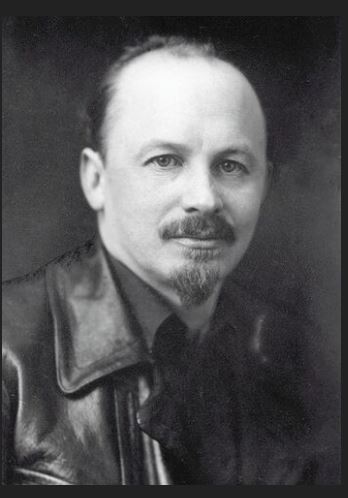
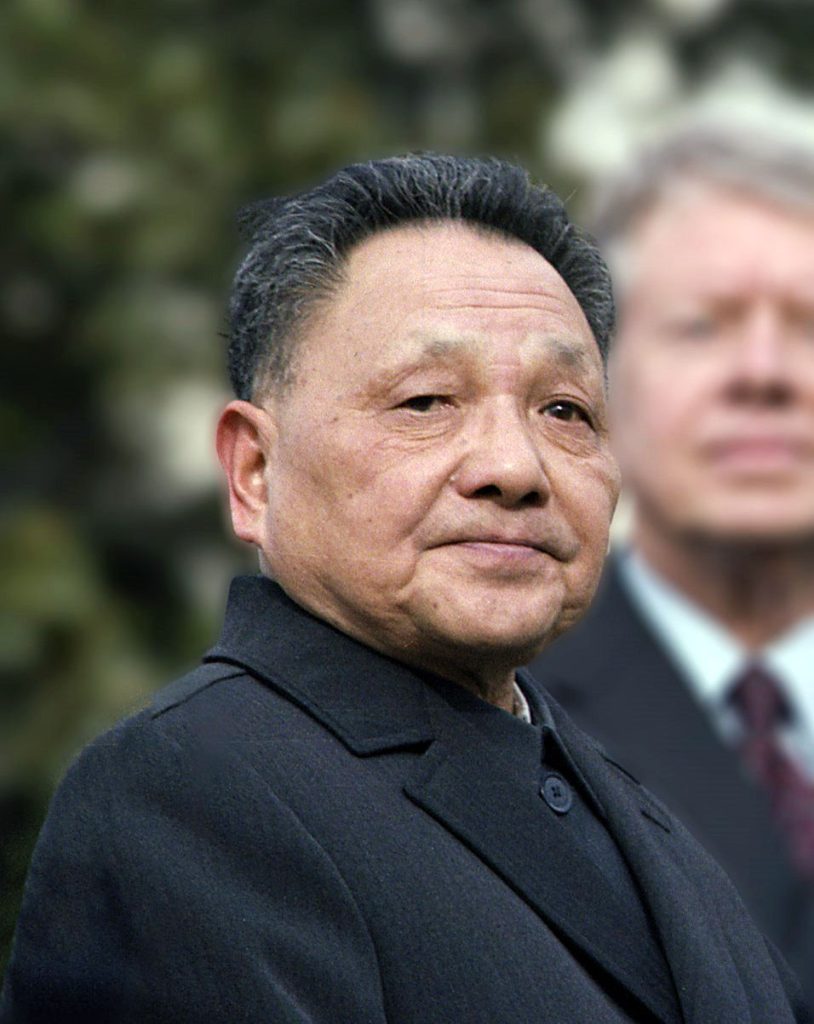
Relatedly, the idea that ultra-Bukharinist economic policies could be pursued by the bureaucracy of a deformed workers state for more than 40 years since Deng Xiaoping began that change around 1978, without a capitalist restoration of some sort, completely contradicts Trotsky’s understanding of the threat Bukharin posed to the Soviet workers’ state. Trotsky in the late 1920s considered Bukharin’s policy of “building socialism at a snail’s pace” through a deepened NEP, or Neo-NEP, bolstered by the call “peasants enrich yourselves” to be an immediate danger to the existence of the workers’ state. When Stalin broke with Bukharin and began the programme of collectivisation, Trotsky gave a degree of critical support to Stalin’s “turn” against Bukharin, to avoid the danger of counterrevolution. Yet Bukharin’s calls for the kulaks to enrich themselves was mild compared to Deng’s bald statement that “to get rich is glorious”, which was both urban and rural in its context and resulted in a massive growth of a new capitalist layer. If Bukharin’s economic policy represented imminent counterrevolution at the end of the 1920s, how could China, which has implemented four decades of market policies far more radical than Bukharin’s, still be a workers’ state?
However, as emphasised above, we defend both Russia and China against imperialist attack and any pro-imperialist “colour revolution” that would obviously be aimed at deepening the counterrevolutions in both to bring them into line with imperialist aims, perhaps by engineering the fragmentation of both.
We have no objection to the defence of China against imperialism and attempts by imperialism to foment pro-imperialist regime change in China. We are with you on that. We do have serious misgivings about some of your recent remarks about the Uighurs, and the need for Trotskyists to take up their cause against the Chinese government. Given the totally false and poisonous smears about Chinese ‘genocide’ in Jinjiang, this is something that should be handled with extreme caution. While we are opposed to any policy of Han Chinese oppression or inequality against Uighurs, Tibetans, or any other minority population, given the history of imperialism seeking to use such questions against China, both when it was a workers’ state and still today, we think Trotskyists should focus their fire on defending China.
We are also critical of your polemic against the CCP for its Covid policy of the use of lockdowns and widespread vaccination to control the pandemic, which was extraordinarily successful especially since the pandemic appears to have had its starting point in China. We note that even the most severe estimates from external sources of the number of Covid deaths in China puts it at around 700,000 – around half that of the United States. China has approximately four times the population of the United States. Which means that China’s effort at combatting Covid was at least eight times more effective than that of the United States. We consider that in such conditions as that of the Covid pandemic, any policy must be judged by its efficacy in saving working-class lives. Your tailing of Covid-denialist forces following in the wake of Trump was completely wrong. Indeed one concrete example of our defence of China against imperialism is our denunciation of the opportunist imperialist attempts to exploit anti-lockdown sentiment in China to foment a colour revolution (see https://www.consistent-democrats.org/uncategorized/imperialists-try-to-exploit-covid-safety-measures-to-foment-colour-revolution-in-china/)
Ukraine as a proxy of NATO for war against Russia
We are also critical of your neutral position regarding the Ukraine war, which we consider to be an imperialist proxy war whose strategic objective is regime change in Russia and its dismemberment as laid out in the well-known Brezinsky plan. We are firmly on the side of Russia in the war over the South-East of Ukraine, where real national oppression is being dealt out to the half of the country that speaks Russian as its native language. We note your points about Great Russian chauvinism and the early efforts of Lenin and Trotsky to combat it when Stalin and Ordzonikidze treated Georgian communists with contempt in the aftermath of the justified Sovietisation of Georgia in 1921. We are hostile to those expressions of Great Russian chauvinism and also anti-Semitism that Trotsky and others criticised that were part of the degeneration of the revolution under Stalin. This is elementary.
But it is not the only political problem that the Stalinist regime in Russia have bequeathed, is it? To be sure, Stalin’s deportation of Crimean Tatars and also Chechens to Central Asia was appalling. But what of Krushchev’s gifting of Crimea, with its mainly Russian population particularly after Stalin’s Tatar action, to Ukraine in the early 1950s? That was also irrational but was hardly an act of Great Russian chauvinism. That has laid the basis for serious problems today connected with the Ukraine war, and Great Russian chauvinism is not in play here. In any case, Great Russian chauvinism is a survival of the fact that Russia, prior to 1917, was an imperialist country (though the most backward of imperialist countries). The Russian imperialist bourgeoisie had its class rule torn out by the roots in the aftermath of the October revolution, never to return.
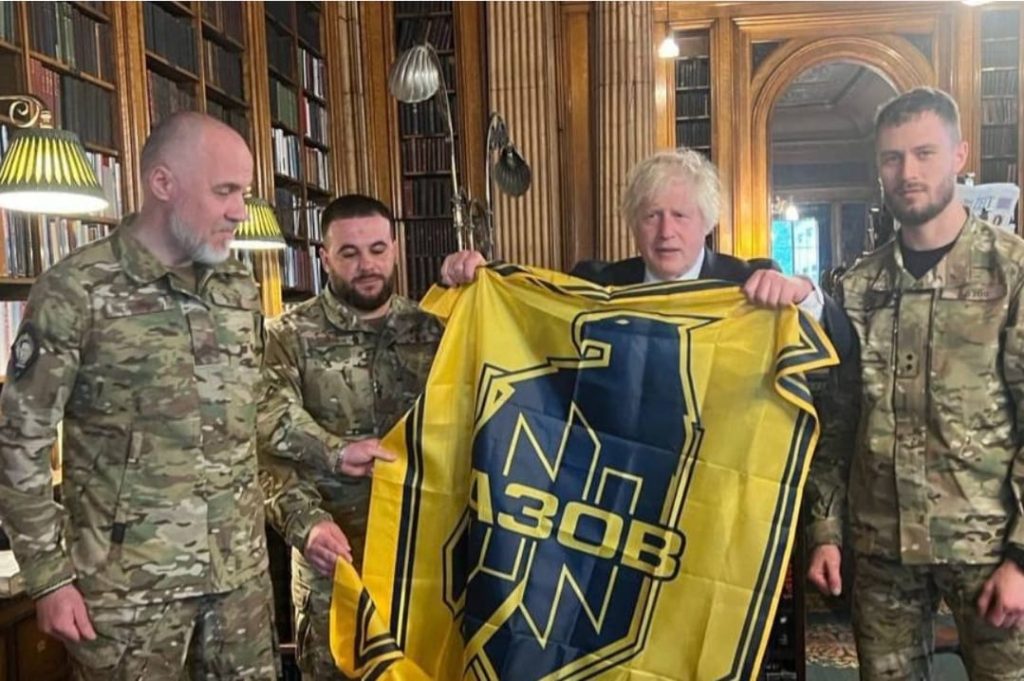
Bourgeois Russia today is not imperialist, in fact it is the target of one of the most virulent forms of imperialist racism, which no longer drapes itself in the tawdry flag of ‘democratic’ anti-Communism and feigned sympathy for the poor Russians suffering under ‘Communist’ tyranny. Now you see bans on Russian cultural artifacts from the works of Pushkin and Dostoevsky to past images and awards given to historical personages like Yuri Gagarin, to bans on sports teams, art exhibitions, you name it. This is because Russians (and this is beginning to happen to Chinese people as well), are seen as a disobedient national group, organically subversive and hostile to the imperialist world order. The imperialists are aware of the considerable popular support for Putin – his 87% of the popular vote in the Presidential election earlier this year was matched by Western opinion polling in Russia that gave him similar approval ratings. But this has been known for years. Modern Western imperialist Russophobia is like Hitler’s hatred of Jews because he and his followers believed that Bolshevism was organically Jewish. Russians today are an oppressed nation on an international level, despite the power of Russia as a state, and any Marxist material on the Russian question has to reflect that.
The Ukraine war is a proxy war waged by imperialism and NATO, and Ukraine plays no independent role whatsoever. Though its far-right leadership are puppets, the most you can say it that that they are greedy puppets, always demanding more weapons and resources from their sponsors. They can do this because they know that their war is a class project for their imperialist sponsors. Your contention that this is a national conflict between Russia and Ukraine and the imperialists are not decisively involved is a complete travesty of the facts. We are not opposed to Ukraine’s right to exist as a nation, but we do not support its ‘right’ to act as a proxy and a trojan horse for NATO and the United States. You contradict yourself on this, when you write:
“Should workers side with Russia?” Some on the left believe that since Russia is challenging the imperialists it should be supported in its war. This is a capitulation to Great Russian chauvinism. Russia is not at war with the imperialists but with the Ukrainian government. The proletarian strategy to fight imperialism in Ukraine and Russia lies in common revolutionary struggle of Ukrainian and Russian workers, not in supporting the designs of the Kremlin…” (https://iclfi.org/spartacist/en/67/ukraine, emphasis added)
And yet you write earlier in the same article:
“This war is fundamentally about whose sphere of influence Ukraine is under…”
So, it’s not about Ukraine per se, but about which bloc it is part of. This admission completely negates your point that “Russia is not at war with the imperialists but with the Ukrainian government”. If the Ukrainian government is fighting “not to liberate Ukraine but to further enslave it to the NATO/EU imperialist powers, to which it has been bound since the 2014 U.S.-backed coup” (which is accurate) then it is precisely a war between NATO and Russia. You cannot have it both ways. No matter how many (irrelevant) bits of verbiage you insert about the terrible oppression of Ukraine by Putin, you cannot reconcile this contradiction. It renders your policy incoherent.
The only reason the NATO powers have not dared to openly send their troops as an expeditionary force to fight Russia in Ukraine, is fear of Russia’s massive nuclear arsenal, which is now more powerful than that of the United States. We are glad that it is so powerful, the counterrevolution in Russia has proved impossible (so far) to decisively consolidate and this means that Russia, with China now the most powerful part of the non-imperialist global South, is still providing protection for the peoples of the non-imperialist world from untrammelled imperialist domination.
Your call for workers in Russia and Ukraine to “turn the guns around” and jointly overthrow their capitalist rulers in this context is a capitulation to imperialism. Just as much as it would have been if some pseudo-left tendency in the Iraq wars of 1991 and 2003 had called on Iraqi workers, Kuwaiti workers, American and British workers, to “turn the guns around” and jointly overthrow their “capitalist rulers” (they are all capitalist rulers, right?) Or perhaps you should call for Israeli workers and Palestinian workers not to “fight” each other and instead “turn the guns around” against their “capitalist rulers” (again, they are all capitalist, right?) Psuedo-leftist verbiage does not prettify a capitulationist policy before imperialism one iota.
This phrase, “capitalist rulers” hides the fact that one side in this war is imperialist, and one side is not. It’s a weasel phrase to avoid the necessity of an Anti-Imperialist United Front with non-imperialist Russia against a NATO proxy. Again, you admit Ukraine is a NATO proxy when you write “The Ukrainian government is fighting not to liberate Ukraine but to further enslave it to the NATO/EU imperialist powers, to which it has been bound since the 2014 U.S.-backed coup.” This cannot be emphasised enough. As Trotsky wrote in 1937:
“Nevertheless the difference between England and India, Japan and China, the United States and Mexico is so big that we strictly differentiate between oppressor and oppressed bourgeois countries and we consider it our duty to support the latter against the former.”
Notwithstanding the economic and social development of China and Russia since under deformed proletarian dictatorships since, this applies to both Russia and China. Indeed, the post-capitalist deformations of the ‘bourgeois’ states of Russia and China provide additional reasons why such an Anti-Imperialist United Front is obligatory. It would be as obligatory with China if a similar proxy war in Taiwan broke out in the future as it is today with Russia over Ukraine. Frankly, your claims to be championing the supposedly “independent” action of the proletariat in refusing to call for the proletariat to take sides in this war, sound like Hal Draper.
In an exchange with the Bolshevik Group of Korea you wrote:
“This brings us to the nature of the conflict, which is not fundamentally a national war for the liberation of Russian minorities, but first and foremost a proxy war between NATO and Russia over whose influence will predominate in Ukraine. The expansion of NATO influence to Ukraine, a country Russia considers to be in its sphere of influence, has been at the root of the conflict from 2014 and beyond. From February 2022, the war aim of Russia has not been to simply support the Donbass republics but to ‘denazify’ and ‘demilitarize’ Ukraine. This clearly implies installing some kind of pro-Russian regime in Kiev. It is not a democratic right of Russia to change the regime of a foreign country, even if this regime is backed by imperialism. How does the march of the war not fall in line with what you yourselves warned against at the outset of the conflict?” (https://iclfi.org/spartacist/en/2024-kbg-letter, emphasis added)
So once again, you admit that this is not a war between Russia and Ukraine, as you originally asserted, but a proxy war between Russia and NATO about whose “influence” will “dominate” in Ukraine. You apparently have no preference between the two. How is this compatible with defence of Russia, as a non-imperialist country, against NATO imperialism? And yet you sagely lecture “It is not a democratic right of Russia to change the regime of a foreign country, even if this regime is backed by imperialism”.
So imperialism, for its own reasons, initiates a coup in a neighbouring country, using Nazi forces that openly proclaim their adherence to the Hitlerism that in a previous invasion of Russia from the West which resulted in the deaths of millions of Russian-Jewish USSR citizens and tens of millions of ethnic-Russian USSR citizens, and actively persecutes Russians and Russian speaking Ukrainians! And yet Russia has no “democratic right” to use force to remove that foul imperialist puppet regime from power? How is that remotely compatible with defence of Russia against imperialism?
And just before that, you wrote:
“While there was an armed uprising in support in Donetsk and Luhansk following the Maidan coup, this was not the case in the other regions which Russia now claims. At the very least, the sentiment in these regions is contradictory. Even if one is to believe that there was no manipulation of the 2022 annexation referendum results—which would indicate blind faith in the Kremlin—it is impossible to deny that these referendums only took place in the Russian-occupied parts of these territories—in which much of the population has been displaced—and cannot be considered a clear representation of popular sentiment. Even if Russia does not occupy all of Ukraine, it aims to occupy large portions of territory whose prewar population did not want to be part of Russia. Let’s be clear, comrades: Russia’s considerations are first and foremost strategic; it is not elaborating its military plans according to the democratic aspirations in Ukraine.” (ibid)
We note you don’t mention the terrible massacre in the Odessa Trade Union House, which was a clear indication of mass discontent far beyond Donetsk and Lugansk, which the regime drowned in blood. So, try and organise some kind of democratic expression in a war of attrition that had been prepared by imperialism for eight years previously with massive fortification of conquered territory in the mainly Russian-speaking sections of Ukraine. You don’t say that the population of some of these areas has been forcibly displaced by Nazi terror. The Ukrainian Nazis don’t respect the result of the Crimean referendum either – they regard the fact that the overwhelmingly Russian Crimean population voted to join Russia as a license to bomb and murder that civilian population. And there have been no elections in Ukraine since the SMO started – Zelensky’s presidential term has clearly expired. Apart from the fact that he is waging a brutal war against many of those in the Donbass and other Russian-speaking parts of Ukraine who originally voted for him because of his mendacious promises of “peace.” Your attack on those who defend Russia over this as expressing “blind faith in the Kremlin” has a bad taste of Russophobia implicit in it. In our view clearing out Nazi terrorists from the government of Ukraine is a “democratic aspiration” in itself.
There is no suggestion from Russia that Ukraine will not be allowed to exist as a nation once the Nazi regime is destroyed, though it will become a smaller nation of mainly Ukrainian speakers. The most that has been said by some Russian nationalists is that if ‘errors’ had not been made in the past, Ukrainian would have withered away as just a dialect of Russian, and the nations would have merged. We consider that unlikely and utopian, but it is not a suggestion that Ukraine today should seek to exist. The Russian Ministry of Education has mandated the teaching of Ukrainian in schools in the new Donbass territories, unlike the Ukrainian regime, which has since 2014 repeatedly attempted to suppress the teaching of Russian in schools.
What’s amazing is that unlike Bill Logan’s International Bolshevik Tendency, you don’t regard Russia as imperialist. If you did, at least your injunctions to “turn the guns around” on both sides, and militant refusal to take sides, would make sense. But you deny that Russia is imperialist. If Russia is not imperialist and is involved in a war against imperialism, even it is waged “by proxy” (because the imperialists fear Russia’s nuclear capabilities) then the application of the AIUF is a question of principle for Trotskyists.
Concluding Points
Just two other matters we would express agreement with you on. We agree with your energetic but critical support for the Party of Socialism and Liberation (PSL) in the current US election campaign. This is a welcome break from the SL’s previous abstentionism, particularly since they renounced running for executive offices themselves.
We also agree with the aspiration of yourselves to intervene in trade unions using the Transitional Programme itself as a basis. We note that the SL’s practice of creating caucuses in various unions based on a variation of key transitional demands was a ruse to get around McCarthyite anti-communist rules which forbade open activity by a communist party. We do suspect that their activities were often marred by the SL’s sectarian vices, and note that dissident Spartacists, such as the BT’s Howard Keylor, were often more effective in carrying out such work as the SL itself. So, we share your aspirations on this, even though our forces are inadequate.
We hope this letter, with its mixture of agreement and credit when deserved, and strong disagreement and critique when merited, will provoke serious political thought and reconsideration of key questions by yourselves. We do seek principled regroupment through open polemics of this type, and our objective is the creation of a new International to replace the mass Communist International, whose number “Fourth” or “Fifth” is not in itself a principled question. We do seek debate and discussion with your tendency about the above with a view to principled regroupment, therefore.
Yours fraternally
For the Liaison Committee for the Fourth International
Bolshevik Militant Tendency – Argentina
Consistent Democrats – Great Britain
Communist Party – Brazil
United Fronts vs Popular Fronts
Below is a presentation given by a Consistent Democrats speaker at a Zoom forum on 29th September 2024. The whole discussion is available as a podcast here.
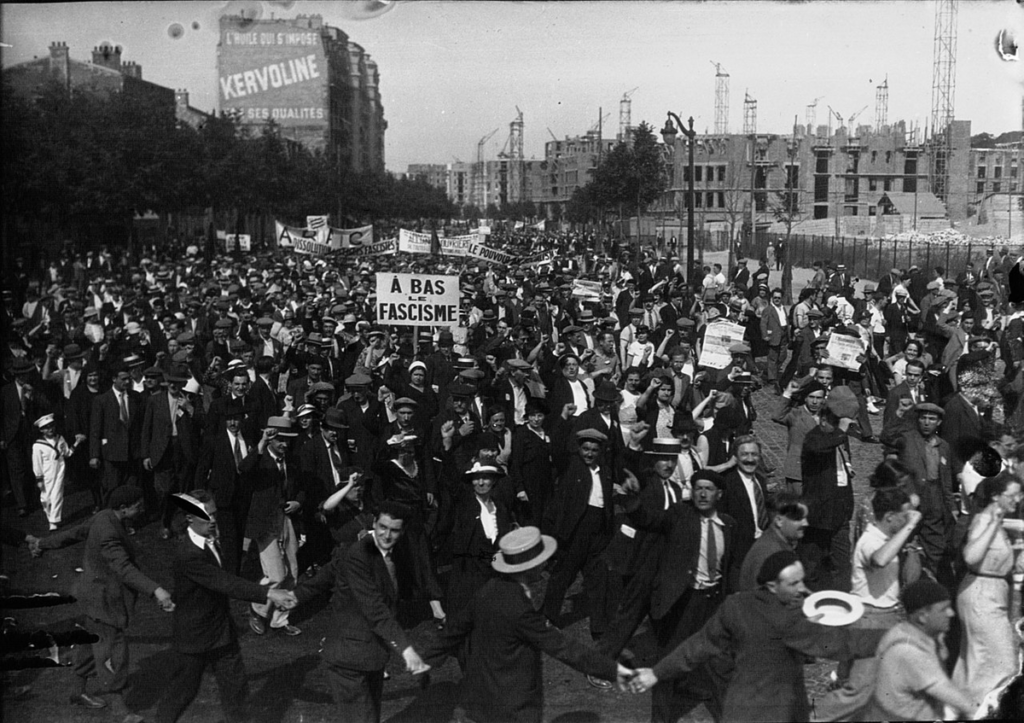
This is a crucially important topic. The united front is a vital necessity for those struggling against any form of class exploitation or even extra-class oppression. It is something that communists always fight for as a matter of principle when we are involved in a class struggle. It is worth revisiting Marx and Engels’ Communist Manifesto when looking into the roots of this. In the passage titled ‘Proletarians and Communists’, they write:
“In what relation do the Communists stand to the proletarians as a whole?
“The Communists do not form a separate party opposed to the other working-class parties.
“They have no interests separate and apart from those of the proletariat as a whole.
“They do not set up any sectarian principles of their own, by which to shape and mould the proletarian movement.
“The Communists are distinguished from the other working-class parties by this only: 1. In the national struggles of the proletarians of the different countries, they point out and bring to the front the common interests of the entire proletariat, independently of all nationality. 2. In the various stages of development which the struggle of the working class against the bourgeoisie has to pass through, they always and everywhere represent the interests of the movement as a whole.
“The Communists, therefore, are on the one hand, practically, the most advanced and resolute section of the working-class parties of every country, that section which pushes forward all others; on the other hand, theoretically, they have over the great mass of the proletariat the advantage of clearly understanding the line of march, the conditions, and the ultimate general results of the proletarian movement.”
This is the essence of communist tactics in the united front. We are the firmest advocates of unity in action of working-class forces. We apply this tactic to mass trade unions, to parties that claim to stand for the interests of the working class, etc. We argue for unity in action of all forces that have an interest in a struggle, irrespective of particular political views. Operationally, the political views of those who involve themselves in a struggle ought to be irrelevant.
Rarely will a united front involve a single, discrete action. Usually, it involves a series of actions in pursuit of a particular objective. The objective might be ongoing – e.g. to organise regular demonstrations against the imperialist proxy war in Ukraine. I.e. IUAFS. We champion the rights of all those who involve themselves in such a struggle to argue their own views about the way it is conducted. The only restriction on that is practical – if we are involved in a life-or-death struggle/action right now, an outbreak of discussion during the action is likely to derail that action. But as soon as that action is carried out, there must be full freedom to criticise it, and the conduct of all involved in it, by all involved.
This is particularly relevant when we are talking about the participation in struggles of political formations that have some sort of class contradiction within them. For instance, bourgeois workers parties like the Labour Party. Which are likely to have elements in the leadership who are hostile to the aims of a particular struggle. For instance, the struggle against British troops in Ireland, or against the Iraq War. It was the Labour Party that sent British troops into Ireland in 1969. It was the Labour Party under Tony Blair that invaded Iraq. At the same time there are elements in the Labour Party, on its left-wing, who oppose these things, and might want to join in a united front against them. We welcome their participation and seek to encourage and deepen their involvement in the struggle. That is a key part of the non-sectarian, unity in action ethos of the united front, and our participation in it. The aim is that the bigger platform, with more diverse forces involved, will attract greater numbers of previously uninvolved masses to take part in the struggle.
But here is where freedom of criticism becomes absolutely crucial. The presence of left reformists and the like not only expands the scope of those likely to be drawn into a struggle. It also has the potential to undermine it. Because those from the reformist party that support the struggle also have party loyalties, to the party leadership that may well be the main antagonist of the struggle. They may not want to ‘burn their bridges’ within the party, or risk being thrown out of it. They may also have qualms about the radical tactics, the mass actions, necessary to really win the struggle and defeat their own party leadership. Or they may be in a party in opposition, that verbally supports the struggle, and yet has similar qualms about the actions necessary to win.
This is where freedom of criticism is crucial. Communist criticism. The communists must be free to expose these inadequacies of their bloc partners and allies to all those who have been drawn into the struggle. Sometimes at such a point, the reformists will take offence and violate the ethos of freedom of criticism. They will attempt to impose ‘discipline’ on the participants in a united front to stop such criticism. Then the continuation of the united front may become unprincipled, and it will be necessary for the communists to break it, to break this ‘discipline’ that the reformists attempt to impose, to expose such treachery to the objectives of the struggle.
There is nothing wrong with breaking with a united front, if there are sufficient reasons to do so. Such a break by the communists can become a living factor in itself, put increased political pressure on the more right-wing participants in the united front, and lead to the reestablishment of a united front later on a healthier basis. That would be a political defeat for the right wing.
Failure to do this in some ways brings us onto the topic of what a popular front is. A united front does not necessarily exclude all bourgeois elements. A united front to defend a political prisoner, or against an attack on gay rights, for instance, may attract a degree of bourgeois support. That is just fine, provided full freedom of criticism is maintained. It is what happens when it is not where the problem of popular frontism begins.
A particularly high level of united front may be a campaign to elect to office the candidates of a working- class party, even one with a partially bourgeois programme like the Labour Party. It may well be that communists will participate in such an election campaign, and seek to push the reformist party into power, so that its promises can be tested before the masses, to see whether it will really fight for them, or whether it will betray them in power. It is obvious that the communists will demand full freedom of criticism of the reformists both during the election and afterwards, which is particularly relevant when the party is indeed elected. This may well be the ideal situation for a substantial revolutionary organisation to begin to really grow. Such situations are ideal but have so far been quite rare.
But there are other situations where the reformists are not keen to be thrust into office alone. They either do not have enough support, and are looking for a shortcut, or are looking for an alibi to excuse whatever treachery they may do in power. This is a starting point of a popular front on the electoral, governmental level (there are also popular-frontist blocs possible on the non-electoral level – more on that shortly). The reformist, bourgeois workers party will run for office in a bloc with some kind of outright bourgeois party, (e.g., Liberal Democrats, Greens, etc). Or a smaller reformist party may try to hang on the coat-tails of a much larger bourgeois party, using the excuse that it needs to get ‘some’ degree of power, even though it does not have enough support to be elected outright. This is the politics of the DSA and Bernie Sanders etc in the US.
Our position is that we do not support such blocs. If a working-class party does not have enough support to win an election in their own name, that is tough. The masses need to gain more experience of the way the capitalist system works to propel them to support a working-class party next time. We don’t support opportunist blocs for government with bourgeois forces – to campaign for such blocs in elections is a breach of the principle of class independence.
It is possible, in some circumstances, when the reformist party does have enough support to take power but engages in rotten attempts at an agreement with bourgeois parties, for the masses to use their own independent electoral tactic to force the reformists to take power without their bourgeois bloc partners. This could happen when the masses refuse to vote for the reformists bloc partners as instructed, and vote only for the reformists, thus sabotaging the bloc. This happened in France in 1936, when Leon Blum, the leader of the SFIO, was forced to take office when the plan of the Popular Front was to put Daladier, the leader of the bourgeois Radical party, into office. That was truly a revolutionary event – as soon as Blum was forced to take office this way, his new government was greeting by the most enormous general strike in French history, to hold him to his promises. That was a truly exceptional situation, when a mass sabotage of a popular front gave birth to a revolutionary situation.
But the danger of a popular front in power, is that it gives the reformists an excuse to betray what they stand for. They tell the masses: “we would like to do more, but our coalition partners will not allow us to do so”. This erects a barrier to political radicalisation, as the masses can be fooled to accept this ‘logic’, and therefore become demoralised, creating the political space for a far-right attack on the workers movement itself, a rise of fascism, a military coup (like in Chile in 1973), or similar. So, we never support such blocs, better for the workers parties to be out of power than involved in such insidious class collaborationist blocs, which lay out a road to power for fascism.
There are also smaller scale popular front type bodies, that do not seek governmental power per se, but still play an insidious role in restricting the struggle against aspects of capitalist reaction. Formations like the Anti-Nazi League, for instance, which used the ideology of classless ‘anti-Nazism’ to fight the rise of the National Front in the late 1970s or Unite Against Fascism and Stand Up to Racism today. It should be remembered that the SWP led mass actions against the National Front, a large, growing and threatening fascist party in August 1977 in Lewisham and then Ladywood (3 days later). Thousands of left-wing and working-class people turned out and smashed NF marches off the streets. However, these demonstrations did not have the protection of trade union endorsement – and the organisers were left exposed. There was an element of substitutionism about these tactics. There was a massive witchhunt in the media against the SWP, who were equated with terrorists, after this, and it was mooted that they might be banned.
After this therefore they initiated the Anti-Nazi League. They had sponsors including the Labour Party, football managers like Brian Clough, the Young Liberals and their well-known anti-Apartheid Activist Peter Hain (who years later joined Labour and became a minister under Tony Blair). They appear to have tried and failed to get the sponsorship of the Federation of Conservative Students. More to the point was the effect that the Anti-Nazi League had on anti-fascist struggles. Their strategy was to jointly organise Carnivals with Rock Against Racism. RAR was a worthwhile endeavour in injecting anti-racist and left-wing politics into popular music.
But the problem was these Carnivals were also part of a search for respectability. Both of the two major Anti-Nazi League Carnivals were held a long way away from the prime areas where the National Front were mobilising, which in London at that time was the area around Brick Lane. The Carnivals were held in Victoria Park, Hackney in April, and Brockwell Park, Brixton in September. For the whole of that period, the NF were terrorising Brick Lane – it was the sharp end of their concentrated attack on the new Bengali communities that were forming up in the East End, particularly in Tower Hamlets and Newham.
So, there was a huge problem. On these occasions, the ANL/RAR managed to mobilise over 100,000 anti-fascists to go to Hackney and Brixton, while the NF was terrorising Brick Lane. They had the ability to swamp the NF and wreck their activities if they had wanted to. But respectability stopped them. The second ANL carnival was the first demonstration I ever went on. I was 17. The Spartacist League, to their credit, mass leafleted the Carnival goers earlier in the day asking them to go to Brick Lane and join the mobilisation against the fascists there, instead of singing and dancing about it. But with a bit of flexibility and initiative from the leadership, they could have done both. That they didn’t was an indictment of the SWP’s sinking into popular frontism in response to a witchhunt.
The ANL did not stop all serious protests against fascism. One important such battle was during the General Election in 1979 in Southall, when a large mobilisation of anti-fascists against an NF event was battered by the cops, resulting in the murder of Blair Peach, a local teacher and SWP member. But this was weaker than it could have been because of the ANL’s flaws. Maybe the cops would not have dared carry out such brutal attacks if the SWP has mobilised on a class basis over the previous two years, and sunk roots for this into the working-class movement.
And we see the fruits of this with subsequent popular frontist anti-Fascist campaigns that the SWP have initiated, like Unite Against Fascism, which had David Cameron as an endorser. Or Stand Up to Racism, which had insisted on including Zionists on its marches in some places, to demonstrate its opposition to ‘anti-Semitism’.This is not how the left should organise against fascism. Trotsky’s writing on the United Front against fascism in 1930s are exemplary. The SWP does not do this; it builds ‘respectable’ blocs with ruling class elements that resemble Stalinist popular front campaigns from that period.
Communist Fight Series 2, issue 4 is Out Now!
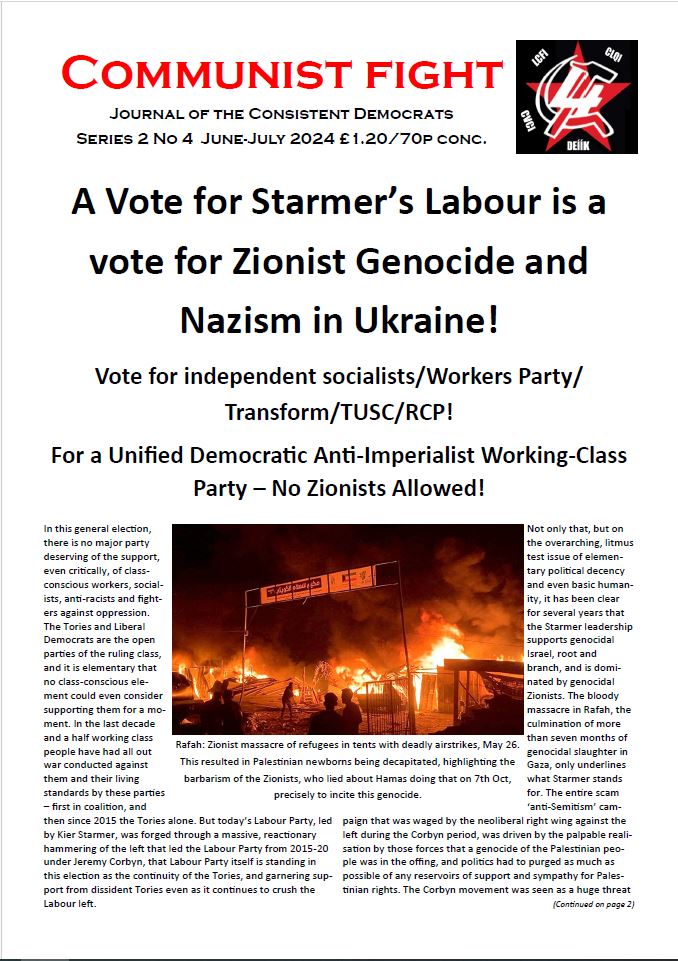
This issue centres on the General Election, and the Gaza genocide, and also refers to the Ukraine war.
The lead article is an extensive and detailed analysis of the various parties and trends standing in the General Election. It concretely makes it clear why the Labour Party is not supportable – the current leadership is one that has waged a class war against all elements within it who aspire to stand up for workers and the oppressed. The Zionism of this leadership was always genocidal, and it is pretty clear in hindsight that there was plenty of conscious understanding of this among the various ‘Friends of Israel’ and ‘Jewish Labour Movement’ witchhunters who targeted the Corbyn movement.
Starmer’s clear endorsement of the use of starvation/dehydration and deprivation of power as a weapon of genocide after the break out from the Gaza concentration camp on 7th October, caused a major crisis in the Labour Party, with many defections, including of sitting councillors, who often retained their seats in the local elections in May. Now there is a layer of socialist-inclined independents standing all over the country against Labour – the most prominent being Jeremy Corbyn himself, as well as at least four national left-wing organisations, most prominently the Workers Party of George Galloway. The main article gives life to the concept of critical support, elaborating in some depth the strengths and weaknesses of the various trends and putting forward a perspective of what is necessary to create a cohesive and democratic socialist alternative to bankrupt neoliberal social democracy.
The article on the back cover also contains useful material on the election, in the form of an account of a public debate between two left-wing trends, with the CPGB-Weekly Worker advocating votes for Starmer’s genocidal leadership in the election, and the Spartacist League opposing it. The rightward motion of the CPGB-WW is evident here; during the whole Blairite period they were opponents of the left hustling votes for the pro-privatisation, warmongering Blairites. But now that Starmer has taken that a stage further and publicly endorsed openly genocidal actions, they suddenly click their heels and denounce those hundreds of thousands of class-conscious militants who abhor voting for Starmer as ‘third period’-ists, “Ohlerites” and similar nonsense. “Left” Islamophobia and softness on Zionism are what is driving their drift into the Starmer camp. Their opponents in the debate, the Spartacists, have ironically some similar flaws, but on the issue being debated: for or against voting for Starmers openly righwing Labour, they are correct.
Another article, an edited transcript of the presentation at the forum we held on the genocide at the beginning of May, gives a lot more historical and contemporary detail about the roots of the genocide, as well as its relationship with the decline of US hegemony and the rise of resistance to that hegemony from a block of the global South with the ex-workers states of Russia and China.
As well as these substantial articles, we have a number of short pieces on the war in Ukraine, the arrest warrants that are in train from the ICC against Israeli leaders, and also an update on the recent partial legal victory of Julian Assange at the Court of Appeal on May 20. And we have a brief piece by our Argentinian comrades on the 9 May General Strike against the fascist-inclined President of Argentina, Javier Milei, and the ferocious attacks he is carrying out against the working class of that country as part of a US-funded counteroffensive of recolonisation in Latin America.
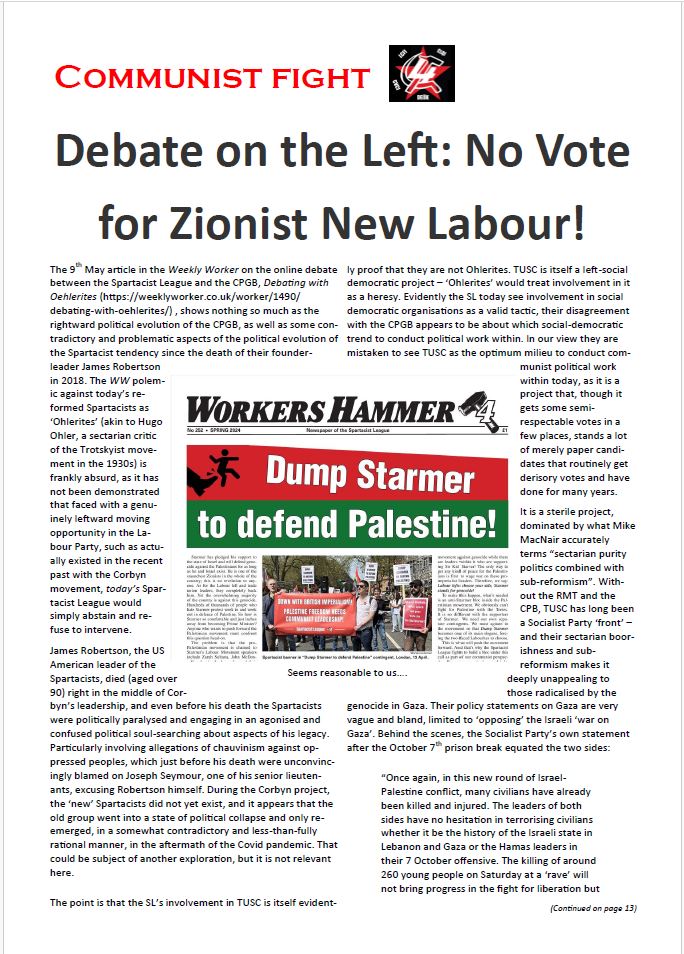
The Irish Easter Rising
The History of the Class Struggle in the oldest colony on the planet
Humberto Rodrigues
This article is an updated and improved version of a 2011 article on class struggle in Ireland. It was taken from the original version of the Communist League blog: IRISH REPUBLICAN PRISONERS: For recognition of the status of political prisoners and for freedom for Irish republican prisoners from the clutches of British imperialism!, From Bolshevik #5.
2024 marks 108 years since the Easter Rising and 43 years since the hunger strike of Irish political prisoners, two of the most important conflicts in the Irish national liberation struggle. That last event, the 1981 hunger strike, was led by Bobby Sands and was one of the most heroic events in world history.
Ireland was for centuries the oldest of the colonies, it was stunted from the 12th century until today in its development by the invasion of England, which made the neighbouring island its first colony, subjugated “through the most abominable reign of terror and the most reprehensible corruption” (Letter from Marx to Kugelmann, 29/11/1869).
The struggle of these people has always been passionately followed by socialists since Marx and Engels, who uncompromisingly defended Irish national liberation and the Fenian political prisoners (an Irish revolutionary guerrilla organization). For Marx, the liberation of Ireland was “The” preliminary condition of the socialist revolution in England, the main capitalist nation of his time.
“It is therefore the task of the International, everywhere, to bring to the fore the conflict between England and Ireland, by openly siding with Ireland. And it is the task of the Central Committee in London to awaken the consciousness of the English workers to the fact that for them the national emancipation of Ireland is not a question of abstract justice or humanitarian sentiments, but the first condition of their own social emancipation.”
Letter from Marx to S. Meyer and A. Vogt, London, 04/09/1870, emphasis in the original.
It is from this struggle that Marx deduced that “a people that subjugates another, forges its own chains.”
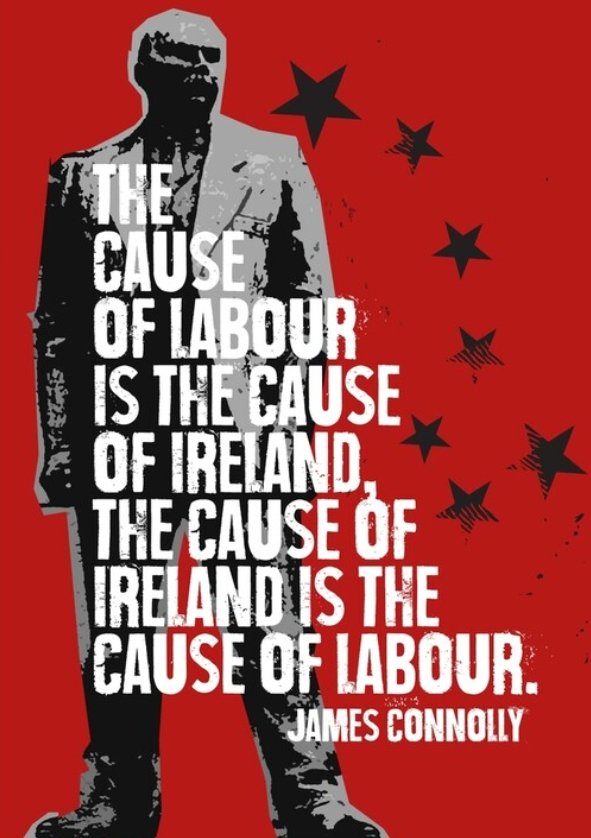
From the fusion of the workers’ struggle for Irish national liberation with Marxism, a brave workers’ leader called James Connolly was born, who warned his brothers about the inability of the Irish bourgeoisie and petty bourgeoisie to lead the country’s emancipation from colonialism. In one of his earliest writings, a pamphlet entitled Erin’s Hope – the End and the Means (1897), he concluded that the Irish working class was “the only sure basis on which a free nation can be built.”
Thirteen years later, in his main work Labour in Irish History (1910) he states that the middle and propertied classes “have a thousand economic ties in the form of investments that link them to English capitalism […] Only the Irish working-class remains the incorruptible heir of the struggle for freedom in Ireland.”
It is impossible not to notice that, in an embryonic form, Connolly had ideas similar to those that were fully developed by the Russian revolutionary Leon Trotsky at the same time, and which came to be known as the theory of permanent revolution. Despite being embryonic, these ideas were visionary for the future of the class struggle in their country. He said: “If they withdraw the British army tomorrow and raise the green flag over Dublin Castle, unless they organize a socialist republic, all their efforts will have been in vain and England will still govern them through the landowners. , capitalists and commercial institutions”.
At the end of 1911, Connolly, in the leadership of the General Transport Union (ITGWU), the country’s main union, faced off politically and militarily against the employer lockouts and the police controlled by the British army. In this dispute, workers formed a defence organization, a “Irish Citizen Army”, to protect themselves from the police and armed strikebreakers. This “Irish Citizen Army” was a precursor of what would become the Irish Republican Army, the IRA, a guerrilla organization founded in 1919, as a military arm of Sinn Fein (Ourselves Alone), the bourgeois republican nationalist political party.
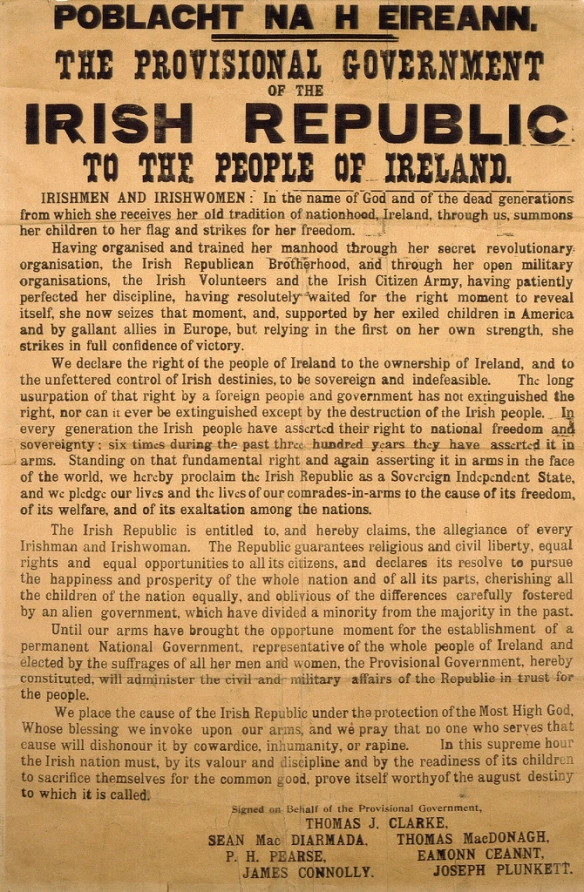
The Irish revolutionary was prophetic in fearing the harm of a division of the island for the future of the struggle for its liberation. He had predicted that the partition that would take place between Ireland and Northern Ireland a few years after its execution by British troops “would mean a carnival of reaction in North and South, set back the Irish labour movement, and paralyze all progressive movements for as long as it lasted.”
Regarding this, Connolly is increasingly correct not only about his country, where the “divide and rule” rule was valid as a prototype at the beginning of the 20th century, but also about all other counter-revolutionary secessions of colonies, manipulated by imperialism (Korea, Vietnam, Sudan… with Libya now being the hot topic). However, in 1916, the carnage of World War I and a series of defeats and betrayals confused the Irish revolutionary, who came to put aside a series of conceptions he had defended throughout his life, to lead a premature uprising without the essential independent political and organizational action of the working class in the form of a revolutionary party. The betrayal of the insurrection led by Connolly by bourgeois nationalism cost him his life. The military uprising known as the “Easter Rising” was cruelly crushed. Connolly was seriously injured and arrested. Soon afterwards, he was court-martialled at the army hospital and transferred to a prison where, upon arrival, he was shot by occupation troops.
After the massacre of the “Easter Rising”, in the revolutionary wave opened by the Russian revolution of 1917 and the German revolution (massacred in 1919), Irish Republican fighters returned to fight bravely, causing a civil war that ended in 1921 with a relative retreat for British colonialism. Representatives of the Irish bourgeoisie established a Treaty with England that recognized the “Irish Free State” on the condition that the “Free State” remained part of the British Commonwealth, that members of the Irish parliament swore loyalty to the English King George V and that six of the 32 Irish counties, with a Protestant majority located in the north, remained under British occupation and under the control of the Irish Unionists, defenders of unity with England. The IRA was then divided between the defenders of the Treaty, or treatyists, led by Michael Collins, today represented by the Fine Gael party, and the anti-treatyists, led by Éamon de Valera, who years later broke with Sinn Fein and the IRA and founded Fianna Fail. There is a film that romanticizes these events called “Michel Collins, the price of freedom” (1996), and justifies Collins’ betrayal. Filmmaker Ken Loach in “Winds of Freedom” (2006) portrayed this period better, more truthfully.
Throughout the 20th century, republican nationalists capitulated to several peace agreements or were crushed several times and new fighters raised the anti-colonialist flag again, reorganising dissent from the IRA to fight by all means against the separation imposed on the country by the agreements between imperialism and the corrupt Irish bourgeoisie.
In 1939, the Marxist magazine “The New International”, published by the Trotskyists of the Communist League of America, noted:
“Bombs are exploding again in Ireland and England. Under the very nose of the Home Office in London, beneath the monument to English kings in Belfast, beneath the walls of the prisons where thousands of Irish patriots served their sentences, and beneath the customs offices along the Ulster border, loud and sudden explosions mark the 23rd anniversary of Easter Week. And these explosions are not merely celebratory. They serve to remind the world of the struggle for national independence of a people who have fought tirelessly for seven hundred years against the most powerful and merciless oppressor of all colonial peoples: the ruling class of the British Empire. (…) Understanding that without the combined forces of the Irish working class and English workers and the revolutionary forces in the colonies, national independence cannot be completely won, we cannot simply dismiss the current bombings as futile or reactionary. They are not merely isolated acts of violence committed by dismayed and frustrated individuals. They are, on the contrary, carefully planned and conducted according to a plan organized and drawn up by revolutionaries who, themselves, admit that the bombs are only the first step in the renewal of the struggle. These men know and are planning the necessary steps to unite the opposition forces. The bombs are serving to draw attention to the Army of Occupation now in Ireland and the return of the repression that preceded the last war. Revolutionaries everywhere must mobilize to support the movement to wrest freedom and independence from ‘Europe’s greatest landlord’ and thus, by striking a blow to the heart of the world’s greatest imperialist power, unleash the forces of revolution in all colonial countries before war engulfs humanity in a struggle to destroy itself for the profits and power of capitalism” .
New International #4, 04/1939
In 1972, British occupation troops fired on a peaceful demonstration in Derry, Northern Ireland, killing fourteen people, seven of whom were minors. All the victims were unarmed and five of them were shot in the back. The protesters were protesting the Northern Ireland statelet government’s policy of summarily arresting people suspected of terrorist acts. This policy was directed against the IRA. After “Bloody Sunday”, the IRA gained a huge number of young volunteers, giving the guerrilla group even greater strength. In 1973, Marian Price, who had just qualified as a nurse, was recruited by the IRA. She and nine other militants were arrested, accused of planting bombs in London in order to blow up the Old Bailey (Central Criminal Court), Hillgate House (a government building) and the Whitehall army recruitment centre. Two hundred people were injured, one man died of a heart attack and his death was attributed to the bombings. Marian Price was sentenced to life in prison.
In 1981, several IRA militants imprisoned by Britain, led by Bobby Sands, an IRA leader, went on hunger strike to demand that the Crown recognise their status as political prisoners. After 66 days, the inflexibility of the Britain government led to their death. But the strike demoralised the Iron Lady, Margaret Thatcher, founder together with the Yankee Ronald Reagan of the anti-worker offensive called neoliberalism. Thatcher increased the presence of British troops in the six counties of Northern Ireland and attempted to criminalise Irish Republicanism in the eyes of public opinion, suppressing any difference between the treatment meted out in prisons to the IRA and ordinary prisoners.
In response, Irish Republican inmates launched a hunger strike. Their demands: not to wear prison uniforms; not perform forced labour; freedom of association and organization of cultural and educational activities; right to one letter, one visit and one package per week; and that the days of protest were not deducted when calculating the sentence served. Refusing to be treated as criminals, they simultaneously defended their personal dignity and the legitimacy of the struggle for the liberation of their country.
Sands, the first of the strikers to refuse food and the first to die after 66 days, led a tenacious political struggle that was portrayed in the film “Hunger” (2008). Even in prison, his companions inside and outside prisons managed to elect him to the British Parliament as a representative of Northern Ireland. The objective was, obviously, not the parliamentary mandate, but to prove the support of the Irish population and the political recognition of the Republican prisoners and their struggle. It was only after this that British legislation began to prohibit prisoners from running for office. From then on, the Northern Irish population elected, every year, in elections held by imperialism, candidates who refused to swear loyalty to the Queen in support of the struggle for independence.
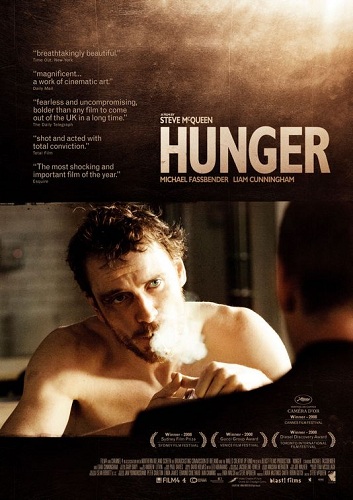
The second setback imposed by the hunger strike lies in the very way in which it was organised. Against the intransigence of their enemies, they were, in an intelligent way, even more intransigent, converting an announced defeat into a political victory, turning time, an extremely unfavourable element in a hunger strike, into a political weapon for the strikers. They established intervals of days between them for the beginning of the refusal to eat, in order to increase the political weariness of the British government with the extension of the durability of the strike movement as a whole. This is how a movement that could last at most two months (the maximum limit that someone can fast without dying of hunger) if everyone started the strike at the same time, dragged on for a long seven months. The international impact of each prisoner death from starvation was repeated ten times over, claiming the lives of Bobby Sands (died at age 27), Francis Hughes (25), Ray McCreesh (24), Patsy O’Hara (23), Joe McDonnell (29), Martin Hurson (24), Kevin Lynch (25), Kieran Doherty (25), Thomas McIlwee (23) and Mickey Devine (27). The strike began on March 1st and only ended on October 3rd, 1981, when, under pressure from the Roman Catholic Church, the families of the strikers broke their commitment to disallow tube feeding when they fell into a coma, making it impossible to continue.
The Irish musicians of the trio the Wolfe Tones, exponents of the so-called Irish rebel music, banned from playing in England, made a song for the Irish heroes “Joe McDonnell Live” (www.youtube.com/watch?v=LrqjAQVLzzE) . In a performance by the Tones in 2008, when the names of the ten martyrs are mentioned and their images displayed during the song, one can see, through the audience’s reactions, the place they occupy in the hearts of the Irish people. In 1982, during the Falklands War, the Wolfe Tones composed another song in support of Argentina in the war.
At the cost of 10 deaths, the strikers achieved two victories: a moral one, by making the British, even without officially granting them the status of political prisoners, ease the prison repression a few months after the end of the movement; and a political victory, by frustrating plans to criminalise the struggle for Irish national liberation in the eyes of the world, which was truly a great feat, taking into account that in her eleven years of government, Thatcher crushed everyone who crossed her path, from the Argentine military dictatorship (in the Falklands war) to the English trade union movement. Convicted until the end of his days, Bobby Sands stated: “They have nothing in their imperial arsenal that can break the spirit of an Irishman who does not want to be broken.”

In 1998, Sinn Féin signed the Belfast Agreement, also known as the Good Friday Agreement (GFA), to dismantle the guerrillas. The agreement, articulated by Great Britain, Ireland and the USA, put an end to the armed conflict in the North, establishing power sharing in Northern Ireland between the Unionists and Sinn Fein. The main objective was to guarantee bilateral relations between Northern Ireland and Ireland, through the good development of investments and trade. This agreement is an expression of the strengthening of imperialism, after the capitalist restoration in the USSR, over that national liberation struggle. The most industrialized part of the island has become an important base for the financial parasitism of multinationals seeking to enter the European Union. As a consequence, Ireland was the first country in the European Union to officially enter into recession in the 2008 crisis. The austerity policy is violently employed by the government with the complicity of Sinn Fein through a brutal cut in public spending and the increase in the reserve army of the unemployed, forcing a fall in wages in the North, the South and also in Great Britain. This growth in misery affected Catholic and Protestant workers equally, but the English and Irish imperialist bourgeoisies stimulate inter-worker sectarian tensions through paramilitary groups such as the Ulster Volunteer Force, to divide the proletariat and manipulate their class dissatisfaction against their own brothers. In this package, the repression against Irish Republican political prisoners increases, mainly among activists who disagreed with the capitulation of the IRA, such as Marian Price, a dissident who became leader of the 32 Counties Sovereignty Movement (32CSM).
Like Sands, Price and other prisoners went on a hunger strike to be transferred from English prisons to a prison in Northern Ireland. But they were force-fed for 200 days as she recounts:
“Four male prison officers tie me tightly to a chair. You clench your teeth to try to keep your mouth closed, but they push a metal spring device around your jaw to open it. They force a wooden tong with a hole in the middle into your mouth. Then, they insert a big rubber tube and you can’t move and through this tube they punch you with everything they put in a blender: orange juice, soup, or cartons of cream if they want to top up the calories. They take jugs of this liquidized porridge and pour it into a funnel attached to the tube. Force-feeding takes 15 minutes, but it seems like it will never end. You have no control over anything. You are terrified that the food will go the wrong way and choke you, you cannot speak or move. You are afraid that you will suffocate to death.” .
The Guardian, 03/13/2003
Price was in the 1990s one of the main voices opposing Sinn Féin’s “peace strategy”, the GFA, as she said: “It certainly wasn’t this sort of thing that I came to prison for.” see more sense for the national liberation struggle today, Marian Price argues: “as long as the British presence in Ireland remains, there will always be justification, republicanism will never go out. My principles and ideals will never be crushed. I did not make the choices I did for individuals within the republican movement or Sinn Fein. The fact that they sold out in no way detracts from my cause” (ibid).
Republican political prisoners have been attacked in a cowardly and savage manner in their own cells by prison guards, with the aim of breaking their political resistance through systematic physical violence. As highlighted in the Bulletin of the Irish Political Prisoners Support Group (IRPSG, facsimile on page 29 of the newspaper O Bolshevique #5), one of the attacks suffered by political prisoner Harry Fitzsimmons:
“…in Maghaberry prison on 29/05/2011, Harry’s cell was invaded by riot police, without there having previously been any confrontation or exchange of words, just brutality. His glasses were broken with such force that glass entered his eyes. He has multiple lacerations on his face. The uniformed bandits held him down, while others punched, kicked and tore his clothes.”
According to Gerry Downing, leader of the British Socialist Fight and Secretary of the IRPSG, “there are Irish prisoners of war today fighting as they were in 1981. Resistance is inevitable. Republican ‘dissenters’ denounce that British imperialism continues to divide the Irish people by force and that is why they continue the fight for the expulsion of the crown forces. The fight for recognition of the status of political prisoners, which was abandoned 13 years ago with the signing of the GFA, is intensifying inside prisons, in the same way that the 10 on hunger strike died 30 years ago. The GFA made it difficult to unify Ireland. At the Sinn Féin Conference on the 30th anniversary of the hunger strike on 18/06/2011 in London, we demanded that participants in this meeting take seriously their responsibilities towards today’s prisoners by fighting for their political prisoner status and that the Sinn Féin breaks with the policy of economic austerity on the working class and the poor.” This austerity policy, where Irish workers are forced to pay for the imperialist crisis, expresses how England continues to govern Ireland, now through Sinn Féin.
In June 2012, Sinn Féin leader Martin McGuinness, Deputy First Minister of Northern Ireland fraternized with Queen Elizabeth. McGuinness’ symbolic gesture did not surprise the fighters for the Irish national cause nor the workers of that country, which has suffered for years from the perverse austerity plans imposed by the coalition government made up of the political wing of the IRA in the service of its majesty and imperialism. Meanwhile, as part of this colonialist policy, the best Irish republican fighters, known as POWs (prisoners of war), as well as thousands of other martyrs in the struggle for Irish self-determination against British imperialism, endure brutal oppression in the prisons of the British Crown, as the Communist League denounced at http://lcligacomunista.blogspot.com.br/2011/07/prisioneiros-republicanos-irlandeses.html . Here , we reproduce an article by Charlie Walsh, from the editorial board of Socialist Fight, British member of the Liaison Committee for the Fourth International. Socialist Fight comrades also drive the Irish Republican Prisoner Support Group (IRPSG).
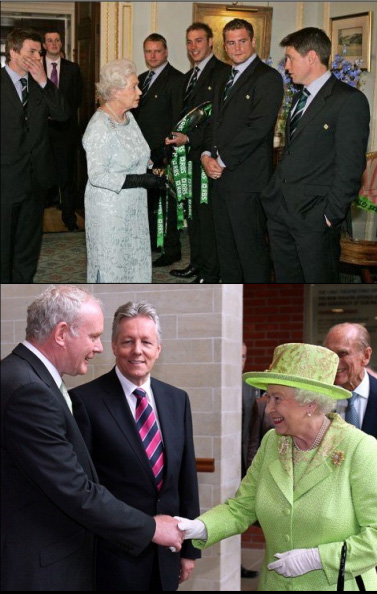
The socialist revolution in England continues to depend on the resolution of the Irish question and, as Connolly concluded, the resolution of the Irish question remains in the hands of the Irish proletariat, which in turn will only emancipate itself when it arms itself with the program of permanent revolution, fights for Irish unity and together with their British and European brothers build their own revolutionary, socialist and internationalist party, for a federation of European socialist republics to bury the old capitalist world.
Political Zionism And its Genocidal Hegemony in the Imperialist World
By Ian Donovan

[This article is an updated and improved version of an earlier article from 2015, titled Political Zionism: The Hegemonic Racism of the early 21st Century1, which was published by Socialist Fight. The earlier article contained substantially the same analysis of Zionism but was flawed by an incorrect analysis of the nature of the USSR, derived from the views of a US left-wing trend, the League for the Revolutionary Party2, led by Walter Daum, who I was then still partially sympathetic to.]
Socialists (and anti-racists more generally) have to confront the role of political Zionists as the chief promoters of open racism today. This means open racism, not racism in general. There are many other types of racists active in the advanced capitalist countries, but apart from the political Zionists they largely operate in an obscured, cryptic manner in terms of political discourse. Whereas political Zionism, as we see in Gaza, is openly and brazenly genocidal.
We have to address this because we do not reduce all questions involving oppression to economic relations alone. This would be a vulgarisation of working class politics, which is more complex than that. Class and social antagonisms are refracted through, and often obstructed by, a substantial overlay of questions resulting from other complex types of oppression that cannot be simply reduced to ‘class’. As Lenin put it over a century ago, when dealing with often very different concrete questions, but of the same type:
“the Social-Democrat’s ideal should not be the trade union secretary, but the tribune of the people, who is able to react to every manifestation of tyranny and oppression, no matter where it appears, no matter what stratum or class of the people it affects”
https://www.marxists.org/archive/lenin/works/1901/witbd/iii.htm
The concretes may have changed, but the basic principle is the same. Socialists are consistent democrats, and need to be able to address questions involving such forms of oppression concretely, completely, and in an up-to-date manner in order to help resolve them and bring the explicit class aspects that underlie them to the fore. In today’s circumstances of the Gaza genocide, with politics in the imperialist countries, including British politics massively influenced by Zionism, and with injunctions from leading people influenced by it in all the major parties as to what views are, and are not, considered legitimate in the body politic, getting this right is a matter of the highest importance. Later I will deal with some historical manifestations of this from the period when Jeremy Corbyn held the leading position in the Labour Party, but first it needs a proper elaboration and concrete theorisation.
We must define what we mean by political Zionism. This is a movement whose objective is the maintenance by any and all available means of a Jewish ethnic state in the territory now known as Israel, which was taken by force from its indigenous Arab inhabitants over 70 years ago, and is still maintaining that state by the most monstrous force against the indigenous people of Palestine, including now outright genocide. Though in its core it is Jewish, Zionism is not just confined to Jews. If it were simply a narrowly Jewish movement it would not be so dangerous and hegemonic. Rather, it has a great moral authority among the ruling classes of the advanced capitalist countries, in a manner analogous to the way that white supremacism, anti-communism, homophobia and even ironically anti-semitism once had a similar authority.

There is a common thread to all these bigoted ideologies, which have taken root as ideological watchwords of the bourgeoisie in discrete historical periods. They are/were all seen by the bourgeoisie as means of ideological terror against the opponents of the capitalist system, and thus as means to preserve a capitalist social system that does not have much appeal to its victims among the working class and exploited people generally. If the political representatives of capitalism proclaimed openly that the system was dedicated to the enrichment of a tiny minority of the population, it would not last very long. Its strength is in its ability to create ideologies that hide that reality, that instead provide reasons for sections of the subject population to hate other sections to the benefit of capitalism.
Imperialism and ‘racial’ supremacy
Capitalism lives by scapegoating; this technique is the basis of convincing part of the working class and middle class population that they have a common interest, not with each other against capital, but with capital against some population oppressed by it. This has always been the purpose of racism in all its varied forms. It was obviously the purpose of white supremacism, which existed since the dawn of capitalism; to create an ideology whereby instead of opposing slavery and colonial oppression, part of the working class particularly of the oppressor nations considered that they benefitted in social terms from the enslavement of the (usually) non-white working class in the colonial countries.
There was, and still is (in a modified form) a material basis for this in that the enormous profits gained initially from the hybrid capitalist form of chattel slavery were used to fund the industrialisation of the first advanced capitalist countries, notably Britain, France, Holland and later the United States. This laid the basis for these states to wage extensive wars of conquest around the globe, and thus for the later exploitation of colonies and semi-colonies under modern monopoly capitalist imperialism.
As the gap between the emerging advanced capitalist nations, and the countries and peoples their ruling classes plundered and enslaved, grew progressively greater in material terms, some of the wealth thus gained was, and still is, used to buy off a layer of the working class in advanced countries, with social gains that, it was clear, depended on the fortunes of ‘their’ imperialist country in the world order. This was justified by the pernicious idea of racial superiority and inferiority; this was actually always the basis of imperialist ideology in the working class.
The doctrine of white ’racial’ superiority was dominant within imperialist ideology throughout the colonial period, but suffered a seemingly huge, discrediting blow with the defeat of Nazi Germany in WWII. Hitler’s regime was the concentrated expression of this doctrine; although by virtue of its defeat in the 1914-18 war Germany’s colonies in Africa had been taken away. Instead of a colonial empire based on plunder in what is now known as the Global South, Nazi Germany concentrated its main efforts to the East. Its version of ‘racial superiority’ treated Slavs, and in a more concentrated form Jews and Roma as untermenschen (subhumans) who were to be exploited as slaves and ultimately exterminated for the supposed benefit of the Aryan übermenschen.
Contradictions and Paradoxes
The blow to notions of racial superiority that resulted from Hitler’s defeat was not without its contradictions, paradoxes and ambiguities, however. One being that though the ideological roots of National Socialism were firmly rooted in white supremacism, many if not most of its victims in the genocidal terror that was concentrated in Europe, were actually white (though considered not to be ‘Aryan’ according to the Nazi racial ideology).
The claim that the slaughter of Jews was simply unique, made today mainly by Jewish chauvinists or those who follow elements of their ideology, is false. The Nazi genocide of between 5 and 6 million East European Jews, today called the Holocaust or Shoah, took place alongside a similar number of non-Jews murdered, including at least four million Slavs of various nationalities, half a million Gypsies, tens of thousands of homosexuals and numerous identified Communists.
It was not even the first such mass killing of millions under modern imperialism. A comparable slaughter took place, of approximately 10 million Congolese Black Africans, at the hands of the Belgian State, which instituted personal rule of the Congo by its king, Leopold II, just prior to the beginning of the 20th Century. This incredible act of mass killing is infinitely less well-known than the slaughter of Jews in WWII (see the 1998 work King Leopold’s Ghost by Adam Hochschild for a comprehensive account).
The reasons for this lack of knowledge are severalfold; one is that a great deal of effort was expended by the Belgian ruling class to cover it up. They had plenty of help from more powerful imperialist allies; Belgium was the casus belli for Britain’s involvement in WWI. The violation of the ‘neutrality’ of ‘poor little Belgium’ by Germany as a military manoeuvre against its opponent France was the excuse for Britain’s (already planned) declaration of war in 1914. The portrayal of Belgium as a victim would not be quite so convincing if it were widely known that Belgian imperialism was guilty of an act of slaughter that massively exceeded any then known, and that even Hitler probably did not exceed.

The genocidal slaughter of black Africans in the Belgian Congo is also indicative of something else that is grossly hypocritical about the claim of Western imperialism to have overcome racism. This is only the worst of many atrocities committed against non-white peoples by colonial and imperialist powers. Yet it was the not the slaughter of dark-skinned Africans that supposedly discredited the cause of racial supremacy – on the contrary the Belgian crime and many others in Africa and Asia have been marginalised in public consciousness and are under-recognised to this day. Rather, it was the mass killing of European Jews that is supposedly the seminal event that discredited the notion of racial supremacy.
Yet despite the supposed rejection of racial supremacy that the Jewish Shoah brought about, imperialism still slaughters people in the Global South who challenge imperialist domination, and such slaughters proceed unabated, albeit these days often under the banner of ‘humanitarian’ intervention instead of open racial supremacy. Except that where Israel’s dispossession of the Palestinian Arabs is concerned, even this fig leaf is missing as the ‘Jewish state’ is overtly supremacist, has openly racist laws, and is now openly genocidal.
Cultification of the Shoah
The way this is rationalised in the West is through the cultification of the Jewish Shoah. So while such events as King Leopold’s Congo murder of millions are not given anything like the historical prominence they deserve, in effect covered up by omission, the Shoah of Jews (though of not Hitler’s other victims) is sacralised as the ultimate crime in human history. Jews are portrayed as the ultimate victims, their suffering the Shoah is implicitly deemed to put them in a different, saintly category to the rest of humanity. For those who subscribe to this hypocritical ideology, which is itself genocidal in its logic, past Jewish suffering means that Jews are completely entitled to establish a Jewish ethnic state in the Middle East by expelling the majority of the indigenous people of Palestine. Furthermore, according to practitioners of this ideology, which include almost all North American and West European bourgeois politicians, as well as political servants of the bourgeoisie on the so-called left, Israel “has the right to defend itself” from the people it dispossessed by force, and whom it drove out of their own country. This purely racist concept manifests itself whenever Israel decides to “mow the lawn” with mass slaughter of Palestinians. Now it has gone further and many such ideologues support Israel’s right to ‘defend itself’ by openly supporting the genocide of Palestinians particularly in Gaza.
Whenever this happens, in response to completely justified rage and hatred from normal, decent working-class people against the beasts who carry out these enormous crimes, you hear a caterwaul about so called ‘anti-semitism’ which is purely racist in content. After all, it’s only Arabs who are the victims, and they don’t really matter at all, what really matters is the dominance over them of Israeli Jews, who are part and parcel of ‘Judeo-Christian civilisation’, and so valuable to the capitalist system itself that normal considerations of human decency go right out of the window. This is the mainstream racist ideology in the West today, shot through with a hypocritical, gangrenous pseudo-anti-racism. Though it is facing a huge challenge from below because of the exposure of Israel’s genocidal nature.
One important consequence of such events as Leopold’s Congolese carnage remaining little-known is that it helps to propagate the myth that the barbarism of Nazi Germany was some kind of aberration, something extraneous, not rooted in the capitalist mode of production itself. Nazi Germany is deemed alien to the humane and tolerant ethos of profit-making that is supposedly characteristic of capital. They instead tried to associate it with ‘communism’, and the degeneration and decline of the Russian revolution under Stalinism.
The developing bureaucratic regime in the first workers state, trying to stave off counterrevolution and attack from imperialism while having abandoned the strategy of international revolution, made shifting alliances with all the different camps in the inter-imperialist conflicts that took place in the 1930s and 1940s. The USSR tried desperately to forge an alliance with the Western powers against Nazi Germany between 1933 and 1939, was rebuffed, and from 1939-41 had a ‘non-aggression’ pact with Nazi Germany, trying to stave off war, which Hitler broke by invading the USSR in June 1941. Then the Stalinist regime forged an alliance with the US and Britain to defeat Hitler. It took the bulk of casualties in that brutal war, around 27 million USSR citizens were killed resisting the Nazi invaders.
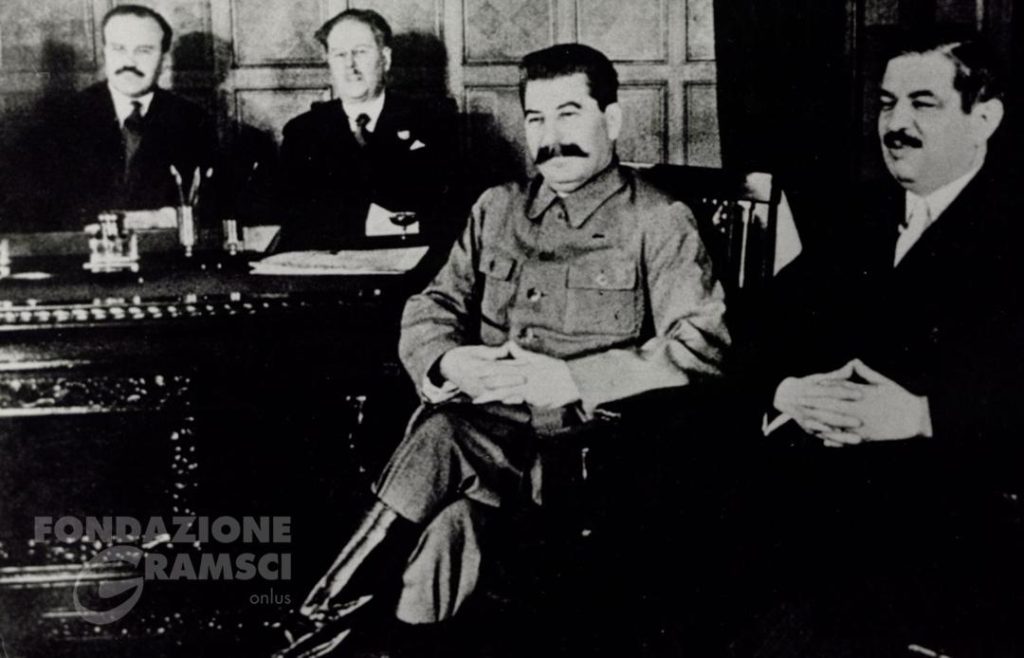
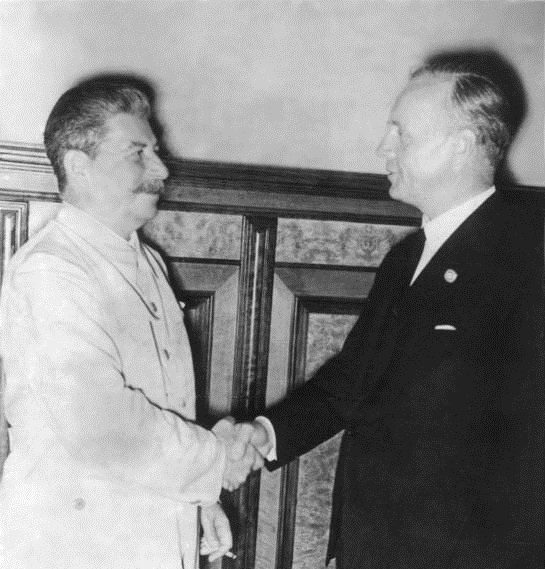
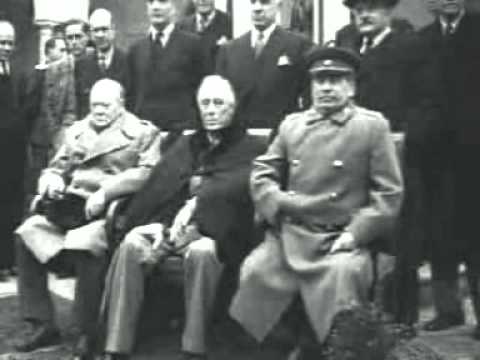
Stalinism undermined the ability of the proletariat to play an independent role in the revolutionary and counter-revolutionary conflicts and smaller wars in the 1920s and 1930s, caused by the extreme decay and convulsions of capitalism particularly in the era of the Great Depression. Those defeats led to the cataclysm of World War II, and in its attempts to preserve its anomalous and unstable form of bureaucratic rule, the regime indulged in rampant terror against those who upheld the undiluted internationalism of the Bolsheviks. Earlier, in the late 1920s, the developing bureaucratic regime, through conciliation of the wealthy peasantry, a policy strongly opposed by the Left Opposition, allowed a challenge to develop to the conquests of the Russian Revolution from these kulaks, which developed into virtually a civil war with these kulaks and others resisting collectivisation. 3-4 million died in a famine across the USSR resulting from this conflict during 1931-2.
The Moscow purge trials of 1936-38, and Stalin’s 1931-2 famine, are for anti-Communist propagandists the epitome of ‘communist’ totalitarianism and the basis for their attempt to equate ‘communism’ with ‘fascism’ as supposed twin antitheses of ‘democratic’ capitalism. The former was the result of a policy, of conciliation of the kulaks, that the revolutionary and internationalist Bolshevik Left Opposition, led by Leon Trotsky, warned against, and fought against, for years. The Moscow purge trials were aimed at eliminating the Left Opposition and all trace of its influence.
The chief defendant, in absentia, was Trotsky, the co-leader with Lenin of the October Revolution of 1917. The Fourth International, the infant revolutionary communist international party founded by Trotsky after he was exiled from the USSR by the bureaucratic regime, warned during WWII that there was no fundamental difference in nature between US and British imperialism, and Nazi Germany, as potential forces that would bring about world barbarism. The recrudescence of Nazi-style barbarism personified by Netanyahu’s attempted genocide of two million Gaza Palestinians has vindicated that and brought the barbaric and genocidal nature of capitalism to the attention of new generations, including in the imperialist countries themselves.
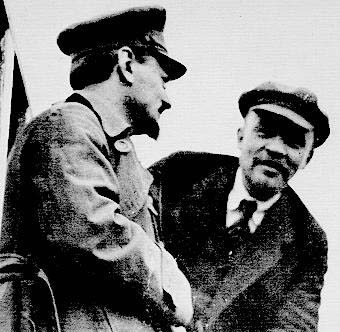
This is corroborated by the fact that this is happening concurrently with the US/NATO proxy war in Ukraine, where the West, as Hitler did before them, are backing outright Nazi terrorists in massacring parts of the Russian population. Particularly those who in Donbass and Crimea have the temerity to vote in referenda against being annexed and oppressed by fascist Western puppets, or in elections for political trends personified by Putin whose roots in the remaining productive forces and structures created under the former workers’ state give them the means to disobey Western imperialist/neoliberal dictates.
Shifts in the imperialist ‘racial’ hierarchy
Zionism is not a parochial movement confined to the Middle East, but rather something that plays an important role in several imperialist countries, notably the United States, but also in Western Europe. In discussing the rise of such a movement to prominence, and the world role that it actually plays in the present phase of the epoch of capitalist-imperialist decline, the wider world context in which such developments took place also needs to be understood.
These events are important for understanding how Zionism gained the hegemonic position in bourgeois politics that it has today. It is bound up with a major change in the position of Jews in the pecking order of peoples that is inevitable in a world divided not just into classes, but also into a system of nation-states in which a number of wealthy imperialist countries systematically extract tribute from less wealthy nations and the corresponding peoples that underlie them. Thus overlaying the class divisions between the working class and the bourgeoisie are massively unequal relationships between peoples. The ruling classes of some nations actually play a role in suppressing the economic and political development of other peoples, though plunder, and both direct and indirect exploitation. Thus we get the phenomenon of oppressor and oppressed peoples, in all its variation, which contaminates the ‘pure’ class struggle with complex national questions.
Also overlaying this is the oppression of important ethnic minorities in the imperialist countries. For instance, there is the oppression of the black population of the United States, which was derived from slavery in the early capitalist period and is still a long way from real equality. There is the oppression of aboriginal peoples in a number of former colonial-settler states, in Australia and New Zealand where this is still a major social question; or for that matter in the United States and Canada where the remnants of the Native American population have been driven to the margins and treated as pariahs. In the past there were colonial-derived settler states where formal racial discrimination was state policy, such as apartheid South Africa and ‘Rhodesia’. Something similar in some ways is being attempted in Occupied Palestine though there are some important differences.
There is also the situation of numerous immigrants from ex-colonies in the imperialist countries. Such as Afro-Caribbeans, South Asians, and latterly Africans in the UK, Maghrebin Arabs and others in France, as well as Black Africans and those from French Caribbean dependencies, Turkish ‘guest workers’ in Germany, or the Korean migrant population in Japan. More recently migrations of East Europeans in the EU free movement context, have complicated, but not fundamentally changed, these issues.
All of these questions involve the creation of ethnic (or ‘racial’) hierarchies through historical processes, both within and without the imperialist countries. All of them are in some way abound up with the enforcement of some kind of servitude or second class status on entire peoples, to the extent that it is true that the majority of humanity is not just subject to exploitation in the sense of a worker under capitalism, but is also to some additional form of national or racial oppression on top of that. Something that in practice deprives them even of equal status with ordinary working class people of the imperialist countries, who themselves constitute an exploited and often semi-suppressed class. These kinds of relations between peoples, once consolidated under capitalism, have tended to become intractable, an inherent part of the system, to the point that it is obvious to anyone who seriously studies such things in their historical sweep that the real emancipation of these peoples from such systematic oppression can only fully take place when capitalism is abolished.
The exception to the rule
There is one glaring exception to this: one formerly oppressed population that under capitalism has escaped from oppression and degradation, and even a serious attempt at genocide in the middle of the 20th Century, to ascend the de-facto hierarchy of peoples that capitalism has created, right to the top. Jews have, uniquely under capitalism, escaped from being a semi-pariah population in the early 20th century to being joint top dogs of the imperialist world in the early 21st Century. Symbolic of this is the term ‘Judeo-Christian civilisation’ that is habitually used by ideologues of Western imperialism to denote the supposedly innate superiority of the West to its perceived ‘others’. By degrees, this has become the dominant narrative; since the 1967 war at least it was the default view, marginalising the anti-Jewish themes of the previous manifestations of imperialist reaction. In the 2000s, with the eruption of imperialism’s ‘war on terror’: ideological cover for an attempted partial recolonization of part of the Middle East by imperialist states, it has become a feverish, militaristic barely-disguised racist narrative in its own right.
The reversal of the position of the Jews in imperialism’s pecking order of peoples has a materialist explanation. Unlike virtually every other victimised population that has been subjected to racial oppression under capitalism, Jews were never, except in the circumstances of the actual attempt at genocide, an enslaved population of colonial-type subjects. Rather, the Jewish population was a different type of pariah population with a complex origin bound up with their economic role in pre-capitalist European society. They were a commodity-trading and later money-trading people-class, in societies where commodity exchange, let alone commodity production (which was virtually unknown), was an activity at the margins of the economic system, which was based on natural, agricultural economy and a form of exploitation based on the appropriation of material goods (i.e. use values in Marxist terms), not exchange values.
This is a complex subject, which has been treated in full elsewhere. It was touched on by Karl Marx in his celebrated early essay On the Jewish Question. The understanding of the Jews as a people-class of traders in pre-capitalist society was elaborated at length in Abram Leon’s notable work The Jewish Question: A Marxist Interpretation, and some extensions of this analysis were much more recently put forward by me in a series of articles on Marxism and the Jewish Question, most synthetically in the 2014 Draft Theses on the Jews and Modern Imperialism.
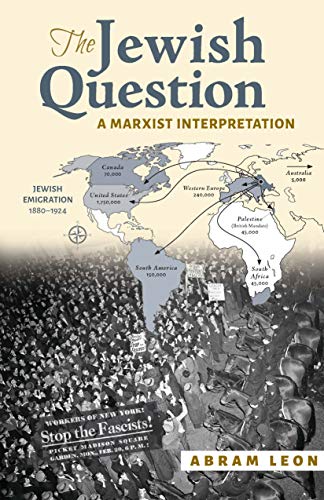

The core of this understanding is that the pariah role of the Jews was a transitory phenomenon that was not organic to capitalism, but rather was a hangover from the late feudal period, when their pre-capitalist role as a ‘foreign’ commodity-trading class was rendered superfluous by the emergence of the bourgeoisies as competitors. They were pushed to the margins and became a pariah layer associated above all with usury, forced into ghettos by feudalism which increasingly used them as a scapegoat for mass discontent with a disintegrating economic system, while at the same time being regarded as insidious competitors by the emerging native bourgeoisies.
This pariah status and oppression, as well as the wide-ranging international trading connections of the Jews derived from their status as a religious minority in many countries, led to their being radicalised both as an intellectual layer and an artisan proletariat, and in those roles playing an important role both in the bourgeois revolutions, where the demand for Jewish emancipation from the ghetto was an important democratic issue, and in the early working class, socialist and communist movement. At the same time, the centuries-long experience of Jewish traders, merchants and usurers in the world of commodities gave them a cultural advantage in the new capitalist societies that were based on generalised commodity production and exchange. Part of the Jewish population was therefore absorbed into the bourgeoisies of the new capitalist countries in Europe and then North America, and became often extremely successful, in a proportion far beyond the proportion of Jews in the general population.
This combination, of successful Jewish capital, and Jewish participation in the working class movement, was the material base that gave birth to a peculiar, racist and deeply reactionary ideology, classical anti-semitism, when capitalism ceased to be an expanding, progressive system in the late 19th century. This ideology was based on a counter-revolutionary racist demonology; it saw Jewish bourgeois as the financiers of a Jewish-led subversive movement against ‘Christian’ civilisation. This was initially the ideology of late-feudal reaction in 19th Century Tsarist Russia, where the large Jewish population was subjected to vicious attacks and pogroms. But as many Jewish refugees fled Russia to the West, the ideology of ‘anti-semitism’ and the Tsarist forgery The Protocols of the Elders of Zion became a major force in European politics first in France with the Dreyfus case, then in Germany in the early-to-mid 20th Century, culminating in the rise of the genocidal anti-Jewish National Socialists under Hitler’s leadership.
Some say that the defeat of Nazi Germany and the exposure of its mass slaughter of the Jews, along with other less well-regarded minorities such as Roma and homosexuals, a considerable number of Slavs, as well as many communist and socialists, were decisive in discrediting racism. It is ironic then that today, the one state in the Western ‘family’ of nations based on the ‘Judeo-Christian’ tradition that openly propagates ethnic criteria for whom it regards as a real citizen of the state, and which openly engages in violent, oppressive treatment, mass expulsions of (non-Jewish) people indigenous to its supposed national territory on ethnic grounds, and now open genocide, is Israel: the Jewish state. It is also notable that this genocidal ethnocratic oppression takes place with the fulsome approval of its Western allies in Europe and America, with only the occasional half-hearted slap on the wrist when Israel ‘goes too far’.
This indicates that the outcome of World War II was not the straightforwardly devastating defeat for racism that Western imperialist liberal apologists would like to pretend it was. Rather, it suggests that imperialist racism underwent a quasi-revolutionary transformation of its form, into something more sophisticated, more synthetic, and in many ways more pernicious and hypocritical. However, it was still racism in practice: an ideology that, whatever its finer points, justified the systematic oppression and repression of the mass of the people of entire ethnic groups, based on a rationale that considered those groups as in some way collectively inferior and expendable for the supposedly greater good of the dominant peoples. Jews had now joined the dominant peoples, as indicated by the now prevalent trope about ‘Judeo-Christian civilisation’.
Transformation into the opposite
The reason for this is not obvious, but can be explained by historical materialist analysis. One of the very factors that had created the conditions where ‘anti-semitic’ racism, and indeed the Nazi genocide, could take place, had been transformed into a novel way into its opposite. Prior to the genocide, as mentioned earlier, the combination of the disproportionate success of Jewish bourgeois in capitalist business with the radical role of Jews in the workers movement had produced anti-semitism as a racist, counterrevolutionary paranoia among the non-Jewish imperialist bourgeoisie.
The Nazi genocide dealt a savage blow to Jewish radicalism, by physically exterminating an enormous number of communist and socialist Jews. But it also dealt an even more devastating blow, as the sheer barbarism involved and the lack of effective solidarity that such Jews received from the (previously crushed) non-Jewish proletariat in Germany and its expanded Reich laid the basis for the political displacement of Jewish socialism by Zionism, as a nationalist movement that, even though it initially took left-sounding forms, had a deeply divisive and anti-communist logic. And thirdly, though the Jewish bourgeoisie suffered grievous losses in Hitler’s Reich, the overrepresentation of Jews among the bourgeoisie that had in part prompted the rise of anti-semitic agitation (the “socialism of fools”, as Bebel called it), remained completely intact in the United States, not to mention the UK and other European imperialist countries, even if some of those Jewish bourgeois did have to take refuge elsewhere for the duration of the conflict with Hitler.
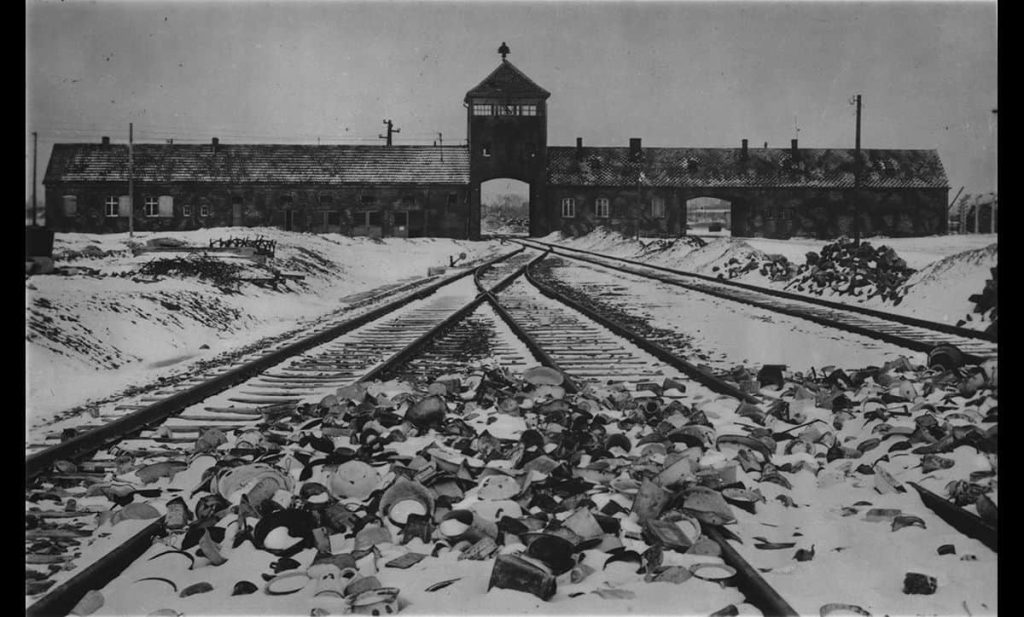
What WWII and the genocide brought about was an ideological (counter)-revolution, a major qualitative and regressive leap in the consciousness of the Jewish people. The pro-working class, radical part of the Jewish people was physically wiped out, and where it was not, was ideologically wiped out. This regressive change is irreversible in terms of the specific peculiarity of the Jewish people as a partial vanguard of socialism prior to the genocide: these specific elements of Jewish mass consciousness and the vanguard role they once played are gone and can never be re-created.
A crucial indication of this is also represented by a major change in the relationship between Jews and the Communist movement, both the genuine internationalist (‘Trotskyist’) minority, and more significantly in terms of brute social power at least, the degenerated ‘Communist’ movements led by Stalin and his successors, both within and without the USSR. The previous radicalisation of the Jews as a result of their anomalous position in early capitalism led to Jewish intellectuals and workers playing a disproportionate, and thoroughly progressive, vanguard role in the early socialist and communist movement. However, the decline of genuine internationalist communism with the degeneration of the Stalin-led communist movement from internationalism to ‘socialism in one country’, as well as the spread of similar formations in the post-WWII anti-colonial/revolutionary struggles in China, Vietnam, Cuba, etc., consolidated this fairly generalised rift of Jews with the communist movement.
Both the internationalism of the bulk of the early communist movement, and the internationalism of the radical Jews who supported it, were extinguished, and replaced by forms of ruinous and often reactionary nationalism. Where communist Jews were not exterminated by the fascists, many lost the real internationalist element within their tradition and became Zionists, seeking the re-creation of a 2000-year-old semi-mythical Levantine Jewish state in the conditions of modern capitalism: a totally reactionary goal. Some hid the reactionary implications of this, even from themselves, by projecting a ‘socialist’ Israel – the USSR even armed the infant Israeli state, before being quickly rebuffed. Over time the rift between Zionised Jews and the Stalinist-ruled deformed workers’ states became a massive one; the participation of many Western Jews with Israeli government supporters in campaigns to ‘Free Soviet Jewry’ (they hoped to settle these in Israel) was also a crucial factor in turn in bringing about an equally drastic change in the views of the non-Jewish imperialist bourgeoisie about Jews.
Whereas previously they had often looked at the Jewish bourgeoisie with suspicion, as a potential danger to them, now with the defeat of the Jewish left, they began to develop the opposite conception, which is the case today. As part of the outcome of these events, the non-Jewish bourgeoisie has come to regard its Jewish compatriots as a priceless resource of the capitalist system itself, a kind of vanguard, class conscious layer, the bearer of a culture whose connection with commodity exchange is older than capitalism itself, as a system based on the generalisation of commodity production and exchange. This became clear in the post WWII period, particularly after the rise of Israel and the 1967 war. It was manifested in the rise of neo-liberalism, with ideologues like Milton Friedman, and then neo-conservatism in Cold War II and later the neo-colonial wars against the Muslim world, with the very prominent role of Zionist ideologues, often Jewish, in these bourgeois political movements and trends which have become pretty well hegemonic in bourgeois politics.
Vanguard of imperialist racism
And that is the take-off point for the situation we have today. Zionism has become the vanguard of racism in the main, traditional imperialist countries. Zionists are the vanguard of anti-Muslim agitation, they have been the core of the neo-conservative movement that has been, and still is, the vanguard of imperialist militarism in the Middle East. To a real extent, they are seen as a vanguard by the imperialist ruling classes in the most advanced countries. This has a material basis; for the historical reasons mentioned earlier, Jews have always been over-represented in the bourgeoisie of the advanced Western capitalist countries. In the earlier period of Jewish involvement in genuine revolutionary anti-capitalism, this was seen as threatening by many non-Jewish bourgeois in the imperialist countries.
But with the revolutionary change of consciousness referred to earlier among both Jews and the non-Jewish bourgeoisie, this has been transformed into its opposite. Jews are now seen as almost the Holy of Holies by the Western imperialist bourgeoisie. This process was inseparable from the rise of the state of Israel with its peculiar citizenship law, the Law of Return, which gives everyone regarded as Jewish in the conventional sense the right to Israeli citizenship. Thus the overrepresentation of Jews in the ruling classes of the imperialist countries added an additional element; that overrepresented layer acquired a material stake in another state, one they had already been considerably involved in funding and bringing into existence in the earlier period on the basis of a Zionist-nationalist vision. What in effect happened is that part of the ruling classes of the Western countries came to overlap with the ruling class of Israel, the most recently and artificially created of the advanced-capitalist, imperialist states. That is the material basis of Zionist power in the advanced capitalist countries; the ‘moral’ authority of Zionism and Israel has had its own autonomous elements, but materially it is based on that.
Corbyn, Labour and Zionism
This has particular relevance for what happened in the British Labour Party during the Corbyn period, when a working-class revolt from below expressed itself in a rejection of neo-liberalism and the imperialist militarism of the neo-conservatives, as most classically expressed by the legacy of Tony Blair. This was done, not surprisingly, against the bitter opposition, resistance and hatred of Zionists.
Zionists played an enormously prominent role in attacking the Corbyn movement. At that point in time the working-class movement was unable to give a complete political answer to Zionism’s witch-hunting methods and strategies because it lacked (and still does) a coherent and consistent Marxist understanding of the Jewish Question and its implications. But the analysis laid out above does answer the basic points that need to be addressed in combatting this, now extremely powerful, form of racism in the imperialist countries.
Corbyn was targeted for destruction because of his anti-racism and because, despite his left social-democratic political limitations, this anti-racism has led him to solidarise with the victims and opponents, some flawed, others politically confused, of this historically specific type of racism and virulent reactionary nationalism that is currently hegemonic in Western societies.
Distinction between oppressor and oppressed
The attacks on Corbyn for fraternising with Hamas and Hezbollah, for instance, during his victorious election campaign, were trumpeted far and wide by the bourgeois media and echoed by Blairite shills and even some left Zionists in and around the Labour Party, such as the Alliance for Workers Liberty. Corbyn was forced somewhat on the defensive when accused of sharing platforms with Hamas and Hezbollah militants at events opposing Israeli crimes against the Palestinians and Lebanese and rationalised his addressing their representatives as ‘friends’ as simply a diplomatic form of address to people he nevertheless strongly disagreed with and sought to persuade of the benefits of ‘peace’. This was a concession to bourgeois ‘public opinion’, and reflective of contradiction and weakness in Corbyn’s ideology. ‘Peace’ is all very well, but only possible when legitimate grievances are fully addressed and when oppression comes to an end.
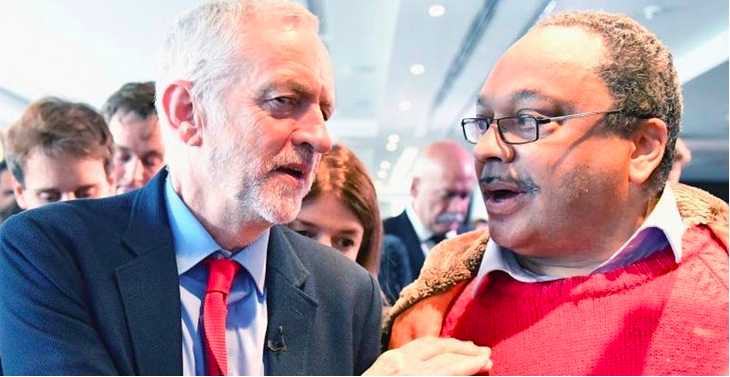
Corbyn should have had nothing to apologise for about engaging in joint protest activity and campaigning against Zionist and imperialist oppression with representatives of the Palestinians and Lebanese Shia Muslims who have systematically (in the case of the Palestinians) and periodically (in the case of the Lebanese Shia) been murdered and oppressed by racist Zionist Israel, with Western support, for decades. Those who scream about the supposed ‘anti-semitism’ of Hamas and Hezbollah, and thereby imply that Israeli-Jewish armed settlers (which is what, in reality all adult Israelis amount to in current political conditions) are in some sense the actual or potential victims of their ‘racism’, are themselves peddling an anti-Arab, racist narrative.
Anti-racism cannot ever be an injunction on the oppressed to love their oppressors and not to hold views of them that are tinged with hatred, even if expressed in religious and/or racialized terms. Racism is not about the oppressed holding such views about their oppressors. Racism is rather an expression in ideological terms of a power relation that an oppressor people maintain in oppressing an oppressed people. It systematically regards the oppressed people as in some sense of a lower order, as deserving of the oppression visited upon them.
This understanding is the basis of the elementary distinction that Marxists have always made between the nationalism of the oppressor and the nationalism of the oppressed, or between the violence of the oppressor and the violence of the oppressed. As Trotsky said of this issue in Their Morals and Ours:
“A slave-owner who through cunning and violence shackles a slave in chains, and a slave who through cunning or violence breaks the chains – let not the contemptible eunuchs tell us that they are equals before a court of morality!” )
https://www.marxists.org/archive/trotsky/1938/morals/morals.htm
The record is quite clear. Palestinians have been driven out of their homeland for the past 70 years, and those in the additional parts of Palestine Israel conquered in 1967 have been under Israeli racist-terrorist rule for 50 years. Now they are facing outright genocide. The Lebanese Shia, the main Lebanese population that has been periodically targeted for massacre by Israel since Begin’s day, are likewise in a power relation with Israel that is crystal clear. What is true of violence and nationalism is also true today of religious fundamentalism or even so-called ‘racism’ (or ‘anti-semitism’) by supporters of these movements – we distinguish between the ideologies and actions of the oppressor, and the oppressed.
So actually, ‘concern’ about ‘anti-semitism’ by supporters of Hezbollah and Hamas in the context of Israeli ethnic-cleansing and mass terrorism is akin to ‘concern’ about ‘anti-white racism’ among blacks in the context of apartheid South Africa, or white ‘Rhodesia’, or Jim Crow in America, and all manner of other racist crimes. It is racist demonology.
While Marxists do not subscribe to the programmes of these movements or the ideologies that underpin them, neither do we consider them in any way comparable to the racism of Israel and its supporters and apologists in the West. They actually arose, to a considerable extent, because of the successful actions of Zionism in destroying and humiliating earlier, secular movements against Zionist oppression. Which make these Zionist attacks on the ‘reactionary’ politics of their supporters doubly hypocritical. There should be no concession to the calumnies about the ‘anti-semitism’ of the Arab victims of Zionism, but rather those who raise these ‘concerns’ should receive a robust response.
It is these critics who are the racists, who are inverting the relation between the oppressor and the oppressed in the Middle East in a truly Orwellian manner. They are in reality devotees of the dominant racist narrative of the bourgeoisie of the ‘Judeo-Christian’ imperialist countries, using this anti-Arab, anti-Muslim narrative to justify massacres, ethnic cleansing and the threat of nuclear war in their neo-colonial offensive that has reduced much of the Middle East to chaos and bloodshed. Now they are trying to exterminate the people of Gaza, with the West Bank Palestinians next on the list for mass murder.
Paul Eisen and the Holocaust
Another question Corbyn was castigated about during his victorious 2015 campaign for the Labour leadership was his supporting events by so-called ‘anti-semites’ and Holocaust Deniers. Corbyn was denounced for having attended events organised by Deir Yassin Remembered, an organisation that was founded mainly by Jews and Israeli expats to commemorate the Zionist massacre of over 100 Palestinian villagers at Deir Yassin, on the edge of West Jerusalem, in April 1948. The Director of Deir Yassin Remembered at the time was Paul Eisen, a British Jew living in North London.
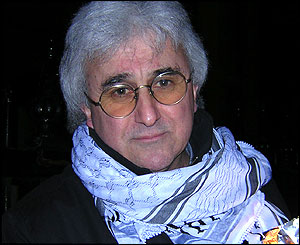
Any examination of Eisen’s material would reveal that he is deeply sensitive to the crimes that have been committed in the name of the Jewish people (and thereby himself), and has an emotional response to this that may be eminently comprehensible, but is hardly the best way to achieve political clarity. He embodies a deep sense of guilt for crimes committed by his own people, as he sees it. This is not an unfamiliar phenomenon to those active on the left. One sometimes comes upon those who have a similar response to their British, German or American heritage, and are consumed with guilt about the crimes of imperialism. This is not usually a working class response; however neither is it anything to fear, it can be the beginning of wisdom if those usually quite middle-class radicalised types break with their guilt reaction and seek to analyse imperialism politically, using Marxist methods of analysis.
What was new at that time, and still is relatively new, is coming across Jewish people who have a similar guilt complex about their own Jewish origin. This was evidently the case with Eisen, who reacted to the cultification of the Shoah and its use to justify crimes against the Palestinians today, by publicly expressing strong doubts about the truth of key aspects of the Shoah, particularly the existence of gas chambers and whether there was ever a Nazi plan to exterminate Europe’s Jews in 1941-5. He considered that Jews were subjected to arbitrary imprisonment, starvation and slave-labour which caused many deaths, but that this was aimed at ethnic cleansing and expulsion, not mass extermination, and that the number of Jewish victims was therefore inflated, partly by inaccurate estimates of the Jewish pre-war population.
This is a fair summary of Eisen’s views and motivations at that time, some of which are still available on the web. His personal website was made private when his views and activities became a political issue during Jeremy Corbyn’s 2015 election campaign. Corbyn himself had attended some events of Deir Yassin Remembered, as in 2013, when he was pictured at a public event along with the late Gerald Kaufman, then the ‘father of the House [of Commons]’ (longest serving MP) who in his younger days had been a fervent and idealistic Zionist; in later life he became one of the most outspoken Jewish critics of Israeli crimes and himself was frequently denounced as a ‘self-hating Jew’. It appears that Corbyn sometimes gave donations to this grouping for its work in commemorating a hideous, too-little-known massacre and bringing it to public attention.
Eisen’s views were misguided and historically wrong. Apart from the dubious factual basis of the material he directly cited, mainly gleaned from dubious sources on the old-style far right concerned to minimize Hitler’s crimes (which Eisen accepted without any real examination of motives, a product of guilt about Zionist crimes), his analysis accepted one key aspect of Zionist ideology that neither he nor most of his detractors even noticed – the view that the Nazi genocide was really only about the Jews.
But it was not: half a million Roma gypsies were also wiped out by the Nazis. Also, several million Slavs, gays and communists. Jehovah’s Witnesses even. Jews had the highest death toll because they were the target group with the highest population, but it was not all about the Jews. But while Eisen had become fixated with debunking the essentially true but misused facts about the actual slaughter of Jews, many of his most vehement critics shared this focus on the Jewish ownership of the Shoah. But unlike Eisen, most of these did this same thing from a straightforwardly Jewish chauvinist standpoint.
Jewish racism against … Jews?
After all, racism is above all a reflection of real relations of oppression. We have to judge in that regard, the allegations of ‘racism’ that were then flung at Eisen, and also at Corbyn by association. How on earth was Eisen a racist in propagating his (incorrect) views on the Shoah? Was he, as a Jew, engaged in some form of oppression of other Jews by means of his opinions? Not at all, the idea is absurd, since (a) Jews are not an oppressed minority, but a rather well-off and in many ways privileged minority in British society, and (b) if they were in some ways oppressed, they would then have a lot more to worry about than the views of a mistaken Jewish individual like Eisen. The hounding of Eisen by the media to get at Corbyn was an act of chauvinistic bullying by the most powerful gang of organised racists in Western societies at that time, and still today. It is the kind of thing the workers movement needs to oppose. But to oppose things like this, it is necessary to understand the complexities of the question and why this is necessary.
This was also a problem also with some who aspired to be anti-Zionists and supporters of the Palestinians. For instance, when the ‘scandal’ of Corbyn’s sometime association with Deir Yassin Remembered was in full swing, and Corbyn had issued the necessary statements pointing out that he had no sympathy for Eisen’s views (obviously true), then a letter was put together by a bunch of Jewish leftists ‘defending’ Corbyn against the attacks of the Jewish Chronicle:
“You report Paul Eisen as saying that Jeremy Corbyn donated to Deir Yassin Remembered. So did many people before discovering the existence of antisemites and Holocaust-deniers in the organisation. Many people attended the occasional fundraising concert that DYR organised, without either knowing of or sympathising with Mr Eisen’s views.”
http://www.thejc.com/news/uk-news/142553/anti-israel-activists-attack-jc-challenging-jeremy-corbyn
What is notable about this letter is two-fold. One is that while it is obviously correct for Corbyn to dissociate himself from Eisen’s views, which no-one has ever seriously suggested he had anything in common with anyway, this letter attacked Paul Eisen as an ‘anti-semite’, i.e. as a racist. This went further than simply dissociating the authors (and Corbyn) from Eisen’s views. The other point is that this letter does not mention that Eisen is actually Jewish himself. This is not accidental. For if it had mentioned this, it would have somewhat undercut elements of ideology that these leftists share with the Jewish Chronicle and the main bevy of Jewish chauvinists attacking Corbyn.
Attacking a Jewish person as ‘anti-semitic’ is very odd. In situations where real oppression is taking place, in Nazi Germany, for instance, or in Israel/Palestine today, it is perfectly possible for some member of the oppressed population to betray their own people. There are examples, both current and historical. Many Palestinians have long considered, with good reason, the sinister former PLO official Mohammad Dahlan, to be an Israeli agent. There were good grounds, in times past, to consider the Stern Gang (Lehi) terrorist and later Israeli Prime Minister Yitzhak Shamir to be a Nazi collaborator. Similar things occur in every struggle against oppression, in South Africa during the anti-apartheid struggle the Zulu chief Buthelezi was a blatant collaborator and traitor. During the Jim Crow period in the US, the phenomenon of the ‘Uncle Tom’ was also well known – Booker T Washington was perhaps the best known example.
Such people betray their own people in a struggle against oppression. It would not be accurate to actually call them racists against their own people, but their betrayals were certainly products of their own weakness, cowardice and corruption in the face of the oppressor. They are, and were, rightly reviled.
But Jews are not the victims of oppression today. They are the perpetrators of oppression in the Middle East. And many, maybe still most, diaspora Jews support that, though Israel’s now open genocide may change that in time. Jews are subject to no oppression in the advanced capitalist countries. So where do allegations of ‘anti-semitism’ against Jewish figures like Paul Eisen come from? How is it possible to be racist against yourself, or even in some way a traitor to your own people in a situation where your own people are not oppressed, but many of them are either participants, or complicit, in oppression or even now outright genocide, themselves?
These are not idle questions. Paul Eisen was the tip of an iceberg. There is quite a long list of people of Jewish origin who have been accused, including by Jewish activists on the far left, of being anti-semites, i.e. anti-Jewish racists. If you sat down and wrote out a list, you could come up with dozens of prominent people – a look at the board of directors of Deir Yassin Remembered yields quite a few to start with. And if those are the prominent ones, it is doubtless true that there are many more non-prominent ones who agree with them. So, a whole layer exists of ‘anti-semites’ of Jewish origin who the Jewish left and those influenced by them, then joined with Zionists in denouncing and ostracising. This issue sporadically resurfaces even today.
Some of the most sophisticated of these ‘left’ Jewish chauvinists, uneasy about the logic involved in this, conceded that these Jewish non-conformists are not dangerous in the least to Jewish people. But they said, the Palestine solidarity movement must be ‘protected’ from their influence to avoid it being ‘discredited’ as ‘anti-semitic’ by the Zionists. This argument is steeped in paternalism, apparently non-Jews in general (and Arabs in particular) are too stupid to be able to handle this complex problem through democratic engagement and debate. It has to be solved by surgical means by Jewish political vigilantes.
The real explanation for this is that many of those on the left who aspired to be anti-Zionists nevertheless shared the dominant prejudice that for all the crimes of Israel and its supporters internationally (particularly the bourgeois ones who significantly materially and politically support it), there is something inherently progressive and enobling about being Jewish, something that puts Jews on a higher moral level to the rest of humanity. This is itself a conceit that needs to be broken with.
Collective guilt vs. collective innocence: a false dichotomy
We as Marxists reject the notion of collective guilt of entire peoples. Many good liberal middle class Germans, often quite leftist in their aspirations, are consumed with guilt about Germany’s past, and even mobilise politically on the basis of such guilt. Such is the basis for the middle-class left anti-Deutsch movement in Germany, whose guilt about the Shoah leads them, logically enough, to turn a blind eye to the crimes of Zionist Jews today because Jews were once victimised appallingly by German imperialism. Their slogan, we should note is “Never Again Germany”. The German bourgeois state, partly cynically, partly ideologically, is conforming to this today in its current backing for Israel in its genocide in Gaza.
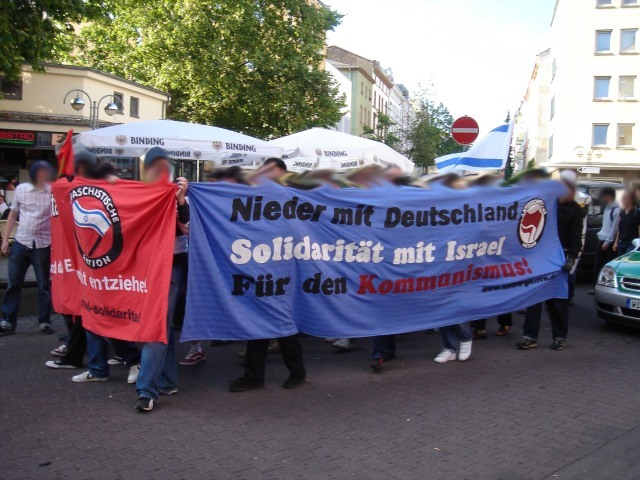
Paul Eisen and his ilk are/were the Jewish equivalent of the anti-Deutsch. This is not racism at all, in other words, but a confused anti-racist impulse. This is shown, incidentally, by Netanyahu’s pronouncement several years ago, that Hitler did not want to exterminate the Jews, but merely to expel them from the Reich. According to Netanyahu, Hitler was then persuaded to ‘burn’ the Jews by the Palestinian potentate Haj Amin al Husseini, the Grand Mufti of Jerusalem. There is a degree of formal similarity between what Netanyahu says about Hitler, and what Eisen said. But the intention was the opposite. By denying Hitler’s guilt, Eisen was trying to undercut the Israeli rationale for the oppression of the Palestinians. But when Netanyahu denied Hitler’s guilt, it was in order to transfer it to the Palestinians through the person of the Mufti: Netanyahu was seeking to create the political conditions for a genocide of the Palestinians. Which he is now carrying out in Gaza.
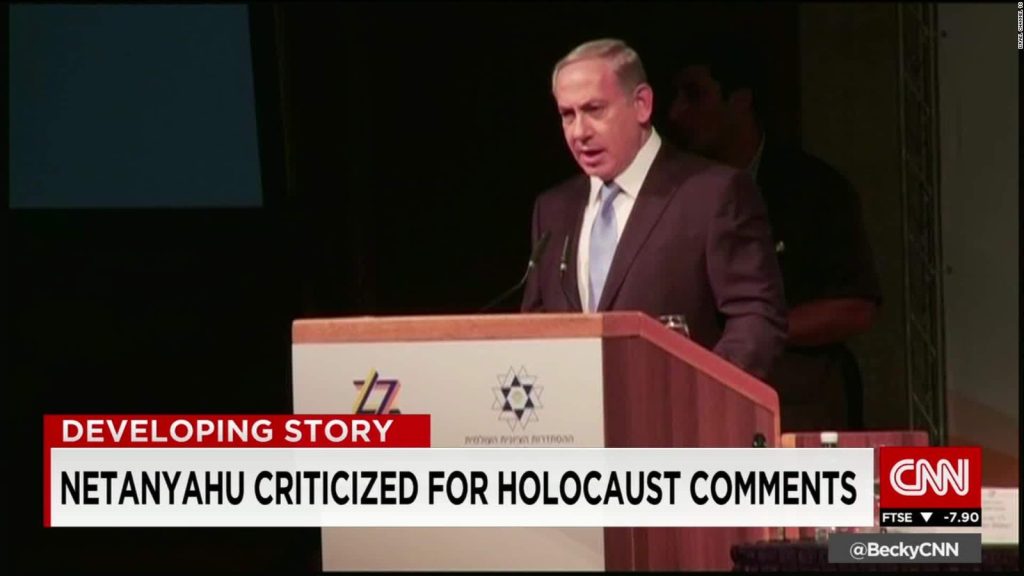
So here you see similar elements of false analysis, used for opposite purposes. But absurdly, one of the responses of the Jewish-centred left was to accuse Netanyahu of ‘holocaust denial’. Thus, massively missing the point. They too considered Jews to be much more important than Arabs. Netanyahu is not interested in history, except as a means to incite and justify the genocide of Arabs in the here and now. Whereas Eisen was wrongly using history to defend the Palestinians, in the way he saw it. These are opposite phenomena.
Anyone in Germany who denounced the anti-Deutsch as anti-German ‘racists’ would be engaged in the same kind of fundamental error that those on the British left who denounce Eisen and co. as ‘anti-semitic’ were engaged in. Implicitly, such accusers of the anti-Deutsch could be said to share conceptions characteristic of Nazi apologists. And those who made analogous allegations against Eisen, in exactly the same manner, echoed what are in fact Zionist tropes about the sacral nature of the Jewish people, and their moral superiority over others. This is also an unconscious or semi-conscious driving force of the various Jews-only groupings that are regularly formed in and around the Palestine solidarity movement. We need to go beyond that and create a multi-ethnic socialist/communist revolutionary movement.
Socialists reject the notion of collective guilt of peoples. But we also reject the notion of collective innocence, which in fact just displaces the notion of collective guilt onto other people(s). The theory of Israel as a colonial-settler state implies it is simply a tool of other powers, and not an imperialist force in its own right. In fact, it is a state of Jewish settlers politically identical in substance to the settlers who are slicing up the West Bank, and who the Israeli genocidaires want to take over Gaza once the Palestinian people who live there are wiped out. This concept assigns the primary role in driving Israeli colonisation to the United States and the former colonial powers. It essentially says that no matter what crimes Jewish political or military forces may commit against Arabs, Jews collectively are innocent of these actions. It is the Americans and British who are really to blame.
And of course, they share much of the blame, from the Balfour Declaration to Suez, to the massive US support for Israel in recent decades, and now in the current Gaza genocide – the US, UK and other imperialists bear massive culpability. But Jews as a semi-national grouping, with a ruling class that spans some national borders and has its own independent interests, are not collectively innocent either. This Jewish layer of the ruling class bears as much of the responsibility as their more ‘traditional’ imperialist allies. There is no collective guilt of Americans, British, French or Germans, or Jews, for any of these things. The blame fundamentally lies with the various ruling classes, in their different forms and permutations. But the idea of collective innocence of any and all of these entire peoples/nations is a capitulation to some form of reactionary nationalism and exonerates the ruling classes. In the case of the self-described Jewish left and those influenced by them, it is evidence of some level of shared conceptions with Zionism – a product of social pressure, since as is the main theme of this article, a modified form of racism, incorporating Zionist conceptions and influence, is the hegemonic form of racism today.
To conclude, Karl Marx stated that “The philosophers have only interpreted the world in various ways; the point is to change it”. This rightly emphasises the role of practical activity in order to affect material reality. However, a corollary of this is that in order to begin to change the world, you have to understand it, at least at some basic level. And through either lack of real analysis, or social pressure, or more likely a combination of the two, understanding of the real role of Zionism in Western societies, and the material roots of this, has been lacking among Marxists. This article is part of an attempt to rectify that, to arm the left and labour movement with a coherent understanding of this very sophisticated, and also very coherent, form of bourgeois class-enemy politics.
- Political Zionism: The Hegemonic Racism of the early 21st Century, see https://commexplor.com/2015/10/26/political-zionism-the-hegemonic-racism-of-the-early-21st-century/. The full version on Socialist Fight seems to be currently unavailable.
- League for the Revolutionary Party, see http://lrp-cofi.org/

